体験者の声・留学成果(AUGP)
AUGP
Asia University Global Program
AUGP
Asia University Global Program
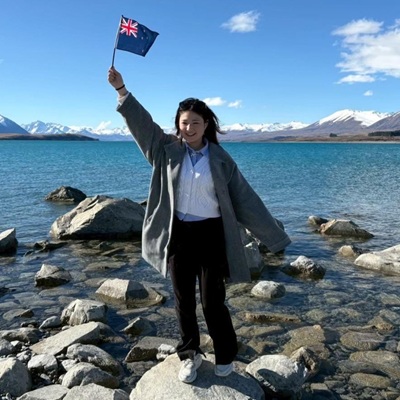
久保田 結衣(KUBOTA Yui)
派遣先:ニュージーランド
AUGPに参加した理由/留学先にニュージーランドを選んだ理由
もともと異文化というものに興味があり、日本以外の世界を写真や動画だけではなく、実際に見てみたいという気持ちが強かったからです。英語力を向上させたいという目的ももちろんあったのですが、何よりも日本と違う国の人達がどのような価値観を持っていて、どのような社会を作っているのか知りたいと思っていたので、AUGPに参加しました。
ニュージーランドを選んだ理由は、季節が真逆の南半球に行ってみたいという好奇心と、先住民マオリの文化とイギリスの文化がどのように融合しているのか学びたいと思ったからです。
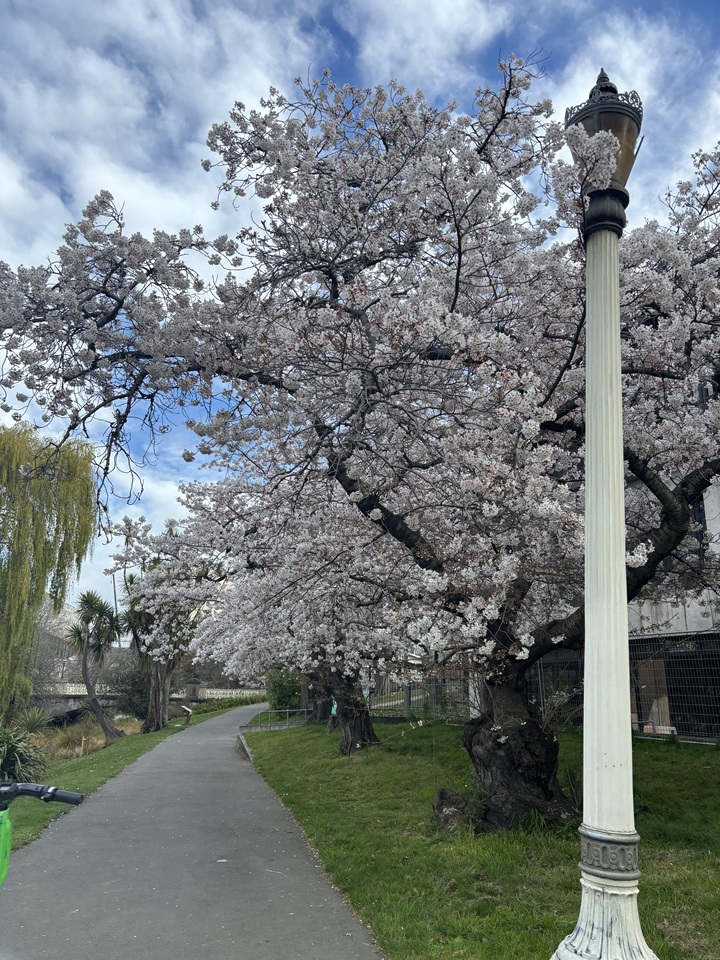 現地での授業
現地での授業
学校初日はオリエンテーションとクラス分けテスト、校内探検をしました。クラス分けテストは、真っ白な原稿用紙にひたすら自分のことを書くライティングと、数人グループに分かれて一つのお題について話し合うスピーキングによって評価されました。私のクラスは日本人が多く、他の国籍の学生もアジア人が多かったです。授業は月曜から木曜までの週4回、9時から12時までで1コマ、1時間昼休みがあり、13時から15時までの計2コマで進められました。毎週水曜日の午後は、パソコン教室のような場所で自主学習の時間がありました。英語の本やDVDなどが置いてあり、自由に閲覧できました。
現地での生活
まず、空港に着くとすぐに派遣大学に向かいました。校内のカフェスペースのような場所に集合すると、ホストファミリーが来てくれ、そのままホームステイ先に向かいました。私のホームステイ先は特にハウスルールなどはありませんでした。朝ごはんとお弁当は好きなものを使っていいから自分で作って、とのことだったので、ベーコンエッグやサンドイッチなどを作って食べていました。1か月なら日本食を食べなくても耐えられるだろうと思ったのですが、2週間で日本食が恋しくなりました。しかし、ニュージーランドは意外と日本食レストランが多く、ラーメンも寿司も味噌汁もありました。日本食だけでなく現地の食べ物も大体おいしかったので、ぜひ色々な食事を試してみてください。
もともと異文化というものに興味があり、日本以外の世界を写真や動画だけではなく、実際に見てみたいという気持ちが強かったからです。英語力を向上させたいという目的ももちろんあったのですが、何よりも日本と違う国の人達がどのような価値観を持っていて、どのような社会を作っているのか知りたいと思っていたので、AUGPに参加しました。
ニュージーランドを選んだ理由は、季節が真逆の南半球に行ってみたいという好奇心と、先住民マオリの文化とイギリスの文化がどのように融合しているのか学びたいと思ったからです。
 現地での授業
現地での授業
学校初日はオリエンテーションとクラス分けテスト、校内探検をしました。クラス分けテストは、真っ白な原稿用紙にひたすら自分のことを書くライティングと、数人グループに分かれて一つのお題について話し合うスピーキングによって評価されました。私のクラスは日本人が多く、他の国籍の学生もアジア人が多かったです。授業は月曜から木曜までの週4回、9時から12時までで1コマ、1時間昼休みがあり、13時から15時までの計2コマで進められました。毎週水曜日の午後は、パソコン教室のような場所で自主学習の時間がありました。英語の本やDVDなどが置いてあり、自由に閲覧できました。
現地での生活
まず、空港に着くとすぐに派遣大学に向かいました。校内のカフェスペースのような場所に集合すると、ホストファミリーが来てくれ、そのままホームステイ先に向かいました。私のホームステイ先は特にハウスルールなどはありませんでした。朝ごはんとお弁当は好きなものを使っていいから自分で作って、とのことだったので、ベーコンエッグやサンドイッチなどを作って食べていました。1か月なら日本食を食べなくても耐えられるだろうと思ったのですが、2週間で日本食が恋しくなりました。しかし、ニュージーランドは意外と日本食レストランが多く、ラーメンも寿司も味噌汁もありました。日本食だけでなく現地の食べ物も大体おいしかったので、ぜひ色々な食事を試してみてください。
印象的な出来事
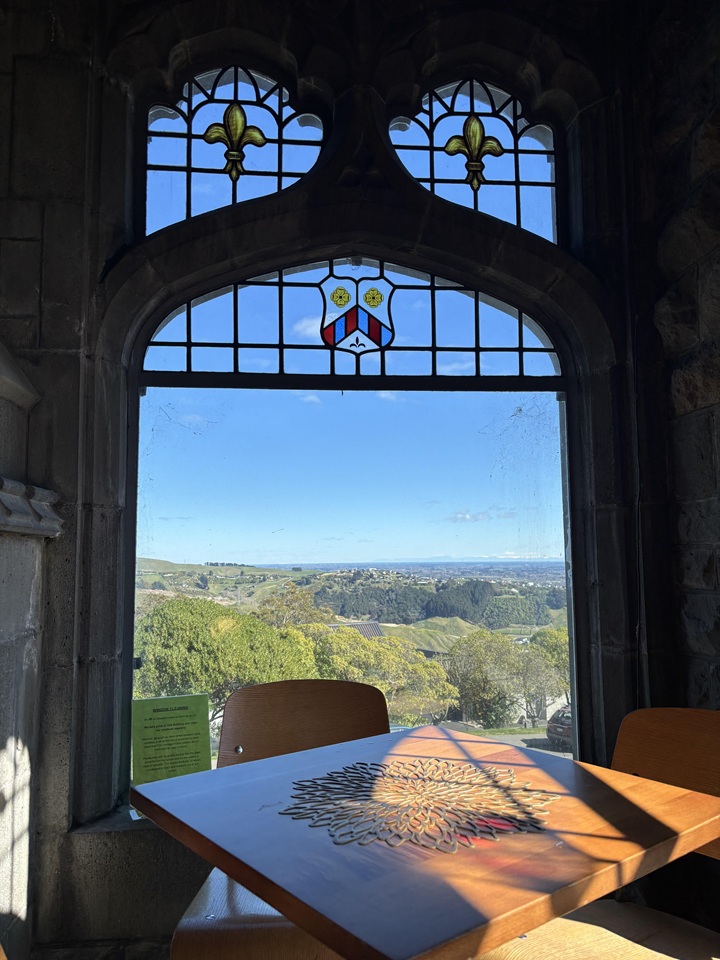 留学中は学校終わりに市街地の探索をし、週末に遠出して観光をしていました。クライストチャーチはイギリスのような街並みでありながら整備された自然がとても美しく、ちょうど桜も咲いており、今までの人生の中で一番の風景を見ることができたと思いました。
留学中は学校終わりに市街地の探索をし、週末に遠出して観光をしていました。クライストチャーチはイギリスのような街並みでありながら整備された自然がとても美しく、ちょうど桜も咲いており、今までの人生の中で一番の風景を見ることができたと思いました。
週末は長距離バスを利用して、テカポ湖やカイコウラなどに行きました。テカポ湖は世界で1番綺麗な星空が見られることで有名な場所で、クライストチャーチから4時間ほどで行くことができました。他の旅行客と共同のキッチンを利用する形態の宿に泊まり、そちらでも少しコミュニケーションを取ることができ、楽しかったのを覚えています。その日は雲が多く、満天の星空は見られなかったのですが、友人達と旅行の計画を立て、実際に見に行って体験することで大きな高揚感を味わうことができました。
また、ホストマザーがドライブに連れて行ってくれたことも印象に残っています。クライストチャーチの歴史ある庭園や街を一望できる山の上など、現地の方ならではの視点でクライストチャーチを見ることができ、ニュージーランドはこんなに素敵な場所がたくさんあるのだと知ることができました。
今後の目標
海外に行ってみたからこそ、より語学力を上げたいと感じました。最低限の会話はできていたと思うのですが、ホストマザーが教えてくれるクライストチャーチの歴史を完全に理解することができず、もったいないと感じました。もし私にもっと英語力があれば、家族との会話がもっと盛り上がっただろうなと思いました。6歳くらいの孫たちとはボディランゲージなどで仲良くなれたのですが、やんちゃな時期の子供に注意をしたくても、言いたいことが言葉にできずもどかしい思いをしました。本を使う勉強も大切ですが、コミュニケーションをとるための英語にもっと力を入れたいと思いました。また、私はこの留学で、良い意味でカルチャーショックを感じませんでした。海の向こうの人たちも私たちと同じように生活を営み、同じようなことに悩んでいると感じました。これからどんどんグローバル化が進んでいくことで外国との距離が近くなっていきます。海外の人と関わらないことはないと思います。この価値観は大事にしていこうと思いました。
 留学中は学校終わりに市街地の探索をし、週末に遠出して観光をしていました。クライストチャーチはイギリスのような街並みでありながら整備された自然がとても美しく、ちょうど桜も咲いており、今までの人生の中で一番の風景を見ることができたと思いました。
留学中は学校終わりに市街地の探索をし、週末に遠出して観光をしていました。クライストチャーチはイギリスのような街並みでありながら整備された自然がとても美しく、ちょうど桜も咲いており、今までの人生の中で一番の風景を見ることができたと思いました。
週末は長距離バスを利用して、テカポ湖やカイコウラなどに行きました。テカポ湖は世界で1番綺麗な星空が見られることで有名な場所で、クライストチャーチから4時間ほどで行くことができました。他の旅行客と共同のキッチンを利用する形態の宿に泊まり、そちらでも少しコミュニケーションを取ることができ、楽しかったのを覚えています。その日は雲が多く、満天の星空は見られなかったのですが、友人達と旅行の計画を立て、実際に見に行って体験することで大きな高揚感を味わうことができました。
また、ホストマザーがドライブに連れて行ってくれたことも印象に残っています。クライストチャーチの歴史ある庭園や街を一望できる山の上など、現地の方ならではの視点でクライストチャーチを見ることができ、ニュージーランドはこんなに素敵な場所がたくさんあるのだと知ることができました。
今後の目標
海外に行ってみたからこそ、より語学力を上げたいと感じました。最低限の会話はできていたと思うのですが、ホストマザーが教えてくれるクライストチャーチの歴史を完全に理解することができず、もったいないと感じました。もし私にもっと英語力があれば、家族との会話がもっと盛り上がっただろうなと思いました。6歳くらいの孫たちとはボディランゲージなどで仲良くなれたのですが、やんちゃな時期の子供に注意をしたくても、言いたいことが言葉にできずもどかしい思いをしました。本を使う勉強も大切ですが、コミュニケーションをとるための英語にもっと力を入れたいと思いました。また、私はこの留学で、良い意味でカルチャーショックを感じませんでした。海の向こうの人たちも私たちと同じように生活を営み、同じようなことに悩んでいると感じました。これからどんどんグローバル化が進んでいくことで外国との距離が近くなっていきます。海外の人と関わらないことはないと思います。この価値観は大事にしていこうと思いました。
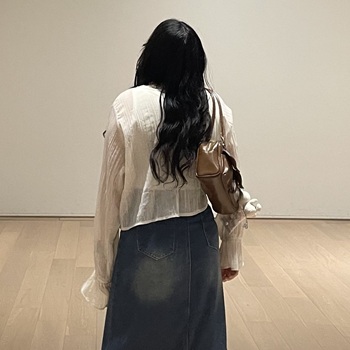
村木 望愛(MURAKI Noa)
派遣先:インドネシア
AUGPに参加した理由/留学先にインドネシアを選んだ理由
大学入学前から、場所を問わず、海外で学ぶ機会を得たいと思っていました。インドネシアを選んだ理由は、第二言語としてインドネシア語を履修しており、また、幼馴染がインドネシアとのハーフで、現在インドネシアに住んでいるため、親近感と興味があったからです。AUGPを選んだ理由は、夏季休暇中に参加できるため、休学せずに留学したいと考えていた私に合っていると感じたからです。
 現地での授業や生活
現地での授業や生活
現地での授業について、インドネシア語の授業のほかに、課外活動と文化体験が週に1回ずつ設けられていました。授業では毎回、留学先大学の日本語学科の生徒がチューターとして、一人ひとりについてくれていました。そのため、留学先大学の多くの学生と接する機会があり、友だちもたくさんできました。課外活動としては、モナスやイスティクラル・モスク、カテドラル教会などを見学したほか、インドネシア独立記念日にパンジャット・ピナンを見たり、タマン・ミニで留学先大学の卒業式に参加したりしました。文化体験として、修了式での発表のために、伝統楽器であるアンクルンの練習が週に1回あり、日本とインドネシアのそれぞれの曲を演奏しました。比較的簡単で、技術が求められるような難しい楽器ではなく、留学先の学生も丁寧に教えてくれるので、授業外でのフランクな交流もできて、楽器練習を含め楽しい時間を過ごしました。楽器練習以外では、インドネシア料理を作ったり、伝統衣装を着る体験をしたり、日帰りホームステイ体験など行いました。生きたインドネシア語を学べたとともに、インドネシアの文化についても深く知ることができ、多くの貴重な体験をさせて頂きました。
大学入学前から、場所を問わず、海外で学ぶ機会を得たいと思っていました。インドネシアを選んだ理由は、第二言語としてインドネシア語を履修しており、また、幼馴染がインドネシアとのハーフで、現在インドネシアに住んでいるため、親近感と興味があったからです。AUGPを選んだ理由は、夏季休暇中に参加できるため、休学せずに留学したいと考えていた私に合っていると感じたからです。
 現地での授業や生活
現地での授業や生活現地での授業について、インドネシア語の授業のほかに、課外活動と文化体験が週に1回ずつ設けられていました。授業では毎回、留学先大学の日本語学科の生徒がチューターとして、一人ひとりについてくれていました。そのため、留学先大学の多くの学生と接する機会があり、友だちもたくさんできました。課外活動としては、モナスやイスティクラル・モスク、カテドラル教会などを見学したほか、インドネシア独立記念日にパンジャット・ピナンを見たり、タマン・ミニで留学先大学の卒業式に参加したりしました。文化体験として、修了式での発表のために、伝統楽器であるアンクルンの練習が週に1回あり、日本とインドネシアのそれぞれの曲を演奏しました。比較的簡単で、技術が求められるような難しい楽器ではなく、留学先の学生も丁寧に教えてくれるので、授業外でのフランクな交流もできて、楽器練習を含め楽しい時間を過ごしました。楽器練習以外では、インドネシア料理を作ったり、伝統衣装を着る体験をしたり、日帰りホームステイ体験など行いました。生きたインドネシア語を学べたとともに、インドネシアの文化についても深く知ることができ、多くの貴重な体験をさせて頂きました。
印象的な出来事
留学3週間が経った頃に大規模デモがあり、安全を第一に、授業がオンラインになった日がありました。行動が自粛されていたため、実際に見ることはなかったのですが、デモが落ち着いた後の外出先で、燃やされたバス停やデモの間に使われたであろう旗などを見て、衝撃を覚えたとともに、インドネシアの政治や社会について知ろうと思うきっかけになりました。
今後の目標
 1ヶ月間という短い期間ではあったものの、非常に濃く有意義な1ヶ月でした。留学前に言語や文化について学んだつもりでしたが、実際に現地で生活してみると分からないことがたくさん出てきました。その表面的な知識を深めることができるのが、留学の利点だと思いました。私にとって当たり前のことは現地では違い、無意識に行っていることが現地ではタブーであることもあります。現地での経験を得て、柔軟な視点を持つことの重要さを実感しました。また、勉強不足などにより自分の未熟さを感じることもありましたが、それは伸びしろがある証拠だとして、前向きに捉えることもできるようになり、自己分析の機会にもなったと思います。
1ヶ月間という短い期間ではあったものの、非常に濃く有意義な1ヶ月でした。留学前に言語や文化について学んだつもりでしたが、実際に現地で生活してみると分からないことがたくさん出てきました。その表面的な知識を深めることができるのが、留学の利点だと思いました。私にとって当たり前のことは現地では違い、無意識に行っていることが現地ではタブーであることもあります。現地での経験を得て、柔軟な視点を持つことの重要さを実感しました。また、勉強不足などにより自分の未熟さを感じることもありましたが、それは伸びしろがある証拠だとして、前向きに捉えることもできるようになり、自己分析の機会にもなったと思います。
今回の留学経験を踏まえ、今後どのような環境に身を置いても、広い視野で物事を捉え、異文化の中で培った適応力を生かし、多様な人々が互いに理解し合い、成長できるような環境づくりに貢献していきたいです。
留学3週間が経った頃に大規模デモがあり、安全を第一に、授業がオンラインになった日がありました。行動が自粛されていたため、実際に見ることはなかったのですが、デモが落ち着いた後の外出先で、燃やされたバス停やデモの間に使われたであろう旗などを見て、衝撃を覚えたとともに、インドネシアの政治や社会について知ろうと思うきっかけになりました。
今後の目標
 1ヶ月間という短い期間ではあったものの、非常に濃く有意義な1ヶ月でした。留学前に言語や文化について学んだつもりでしたが、実際に現地で生活してみると分からないことがたくさん出てきました。その表面的な知識を深めることができるのが、留学の利点だと思いました。私にとって当たり前のことは現地では違い、無意識に行っていることが現地ではタブーであることもあります。現地での経験を得て、柔軟な視点を持つことの重要さを実感しました。また、勉強不足などにより自分の未熟さを感じることもありましたが、それは伸びしろがある証拠だとして、前向きに捉えることもできるようになり、自己分析の機会にもなったと思います。
1ヶ月間という短い期間ではあったものの、非常に濃く有意義な1ヶ月でした。留学前に言語や文化について学んだつもりでしたが、実際に現地で生活してみると分からないことがたくさん出てきました。その表面的な知識を深めることができるのが、留学の利点だと思いました。私にとって当たり前のことは現地では違い、無意識に行っていることが現地ではタブーであることもあります。現地での経験を得て、柔軟な視点を持つことの重要さを実感しました。また、勉強不足などにより自分の未熟さを感じることもありましたが、それは伸びしろがある証拠だとして、前向きに捉えることもできるようになり、自己分析の機会にもなったと思います。今回の留学経験を踏まえ、今後どのような環境に身を置いても、広い視野で物事を捉え、異文化の中で培った適応力を生かし、多様な人々が互いに理解し合い、成長できるような環境づくりに貢献していきたいです。
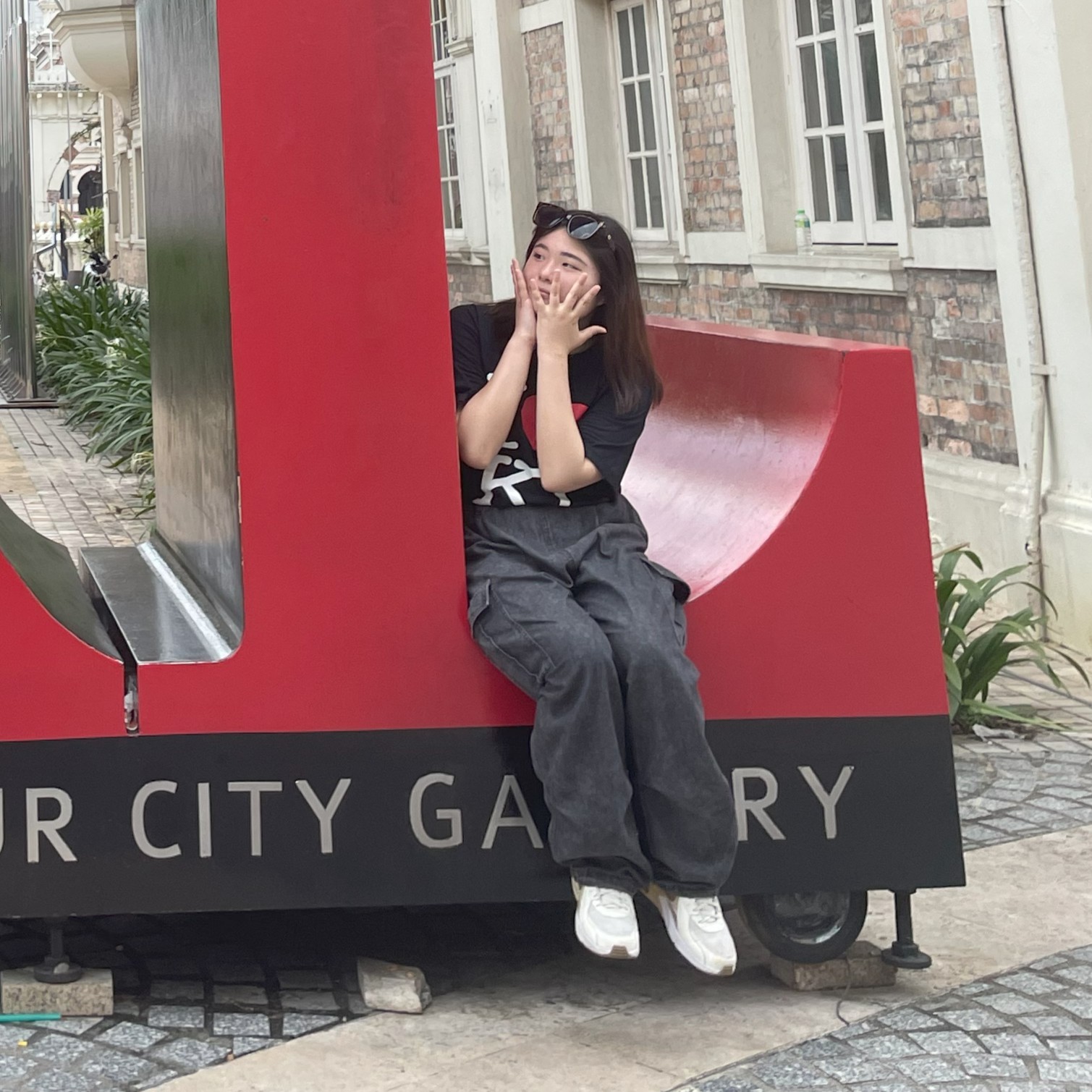
小田 瑚心(ODA Kokoro)
派遣先:マレーシア
AUGPに参加した理由/留学先にマレーシアを選んだ理由
初めに、私がなぜAUGPマレーシアを選択したかについてお話します。私は必修の第二言語としてインドネシア語を学んでおり、インドネシアに興味がありました。ですが私が留学に行きたいと考えていた春季のプログラムにインドネシアへ行くプログラムがなかったので、言語や言葉の意味が少し似ているマレーシアを選びました。この国へ留学する良いポイントの一つとして、春季AUGPの中で最も長い期間留学できる国であるということが言えます。マレーシア自体に興味がなくても、2~4週間では留学した感じがしないと考える人や、半期留学は少し自信がないと感じる人にとっても良いプログラムではないかと思います。
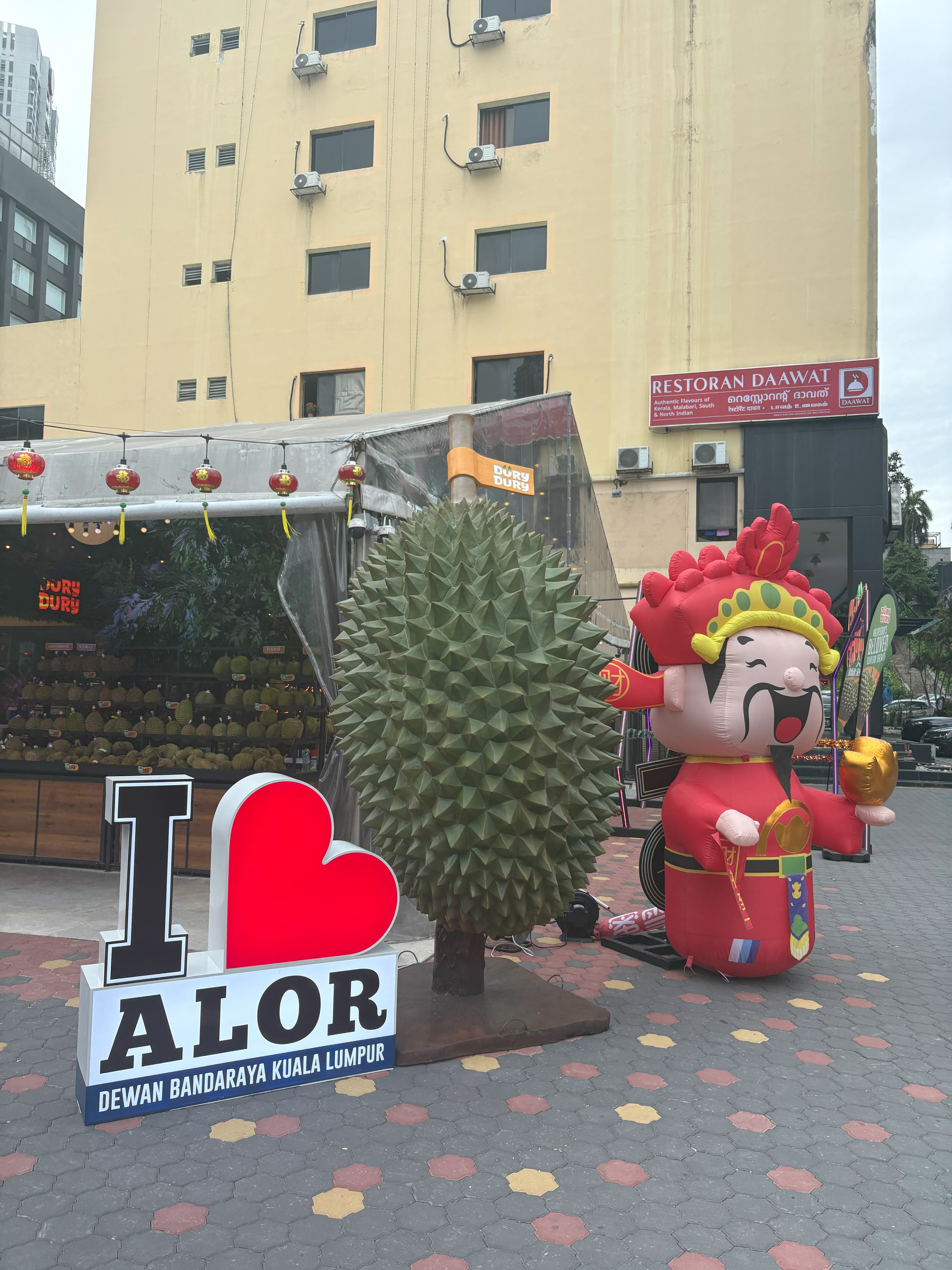 現地での授業や生活
現地での授業や生活
初めに、私がなぜAUGPマレーシアを選択したかについてお話します。私は必修の第二言語としてインドネシア語を学んでおり、インドネシアに興味がありました。ですが私が留学に行きたいと考えていた春季のプログラムにインドネシアへ行くプログラムがなかったので、言語や言葉の意味が少し似ているマレーシアを選びました。この国へ留学する良いポイントの一つとして、春季AUGPの中で最も長い期間留学できる国であるということが言えます。マレーシア自体に興味がなくても、2~4週間では留学した感じがしないと考える人や、半期留学は少し自信がないと感じる人にとっても良いプログラムではないかと思います。
 現地での授業や生活
現地での授業や生活
- 現地での授業や生活についてお伝えしたいと思います。まずは授業についてです。私の留学先、UCSI大学は、位置としてはKuala Lumpur(以下KL)空港から車で約1時間のところにあります。授業の内容は大きく分けて2つで、1つは英語を活用して実際に現地の学生と交流すること、そしてもう1つは授業形式で英語を学ぶということです。1つ目に挙げた交流はバディーセッションと言い、アクティビティを通して現地の学生(日替わりでメンバーは変わりますが3人)と2時間にわたって交流します。留学中に出来た友達の大半はこの授業に参加しているUCSI大学の学生だったので、この授業は現地の人との交流や友達作りに適しています。2つ目に挙げた授業は、授業開始前のオリエンテーション時にテストを行い、その時の成績によって参加する授業のレベルが変わります。全部で10段階のレベルがあるので、自分のレベルにあったクラスで英語を学べます。そして生活についてですが、3人1部屋で大学近くの学生寮に滞在しました。部屋自体は広く快適で、階も20階だったためとても眺めが良く、夜にはKLの夜景を一望できるのも良いところだと感じました。ここでも様々な国から留学に来た学生が多くいるため、乗っているエレベーターで軽く挨拶を交わしたり短い雑談を交わせたことも、英語のスキルアップにつながった体験ではないかと感じています。
印象的な出来事
今回の留学で体験した個人的エピソードをご紹介します。大学の近くでは毎週水曜日にナイトマーケットという出店が沢山並び、ご飯は勿論、服やアクセサリーなどが通常より安く買えるお祭りのようなものがあるのですが、そこで日本では見たことのない食べ物をたくさん目にしました。その際に英語で「これは何ですか?」と質問し、自分が聞き理解した食べ物と一致しているか実際に食べてみるということを行い、毎週のマーケットで自分のリスニング力がどのくらい正確かを確認することを習慣化していました。
今後の目標
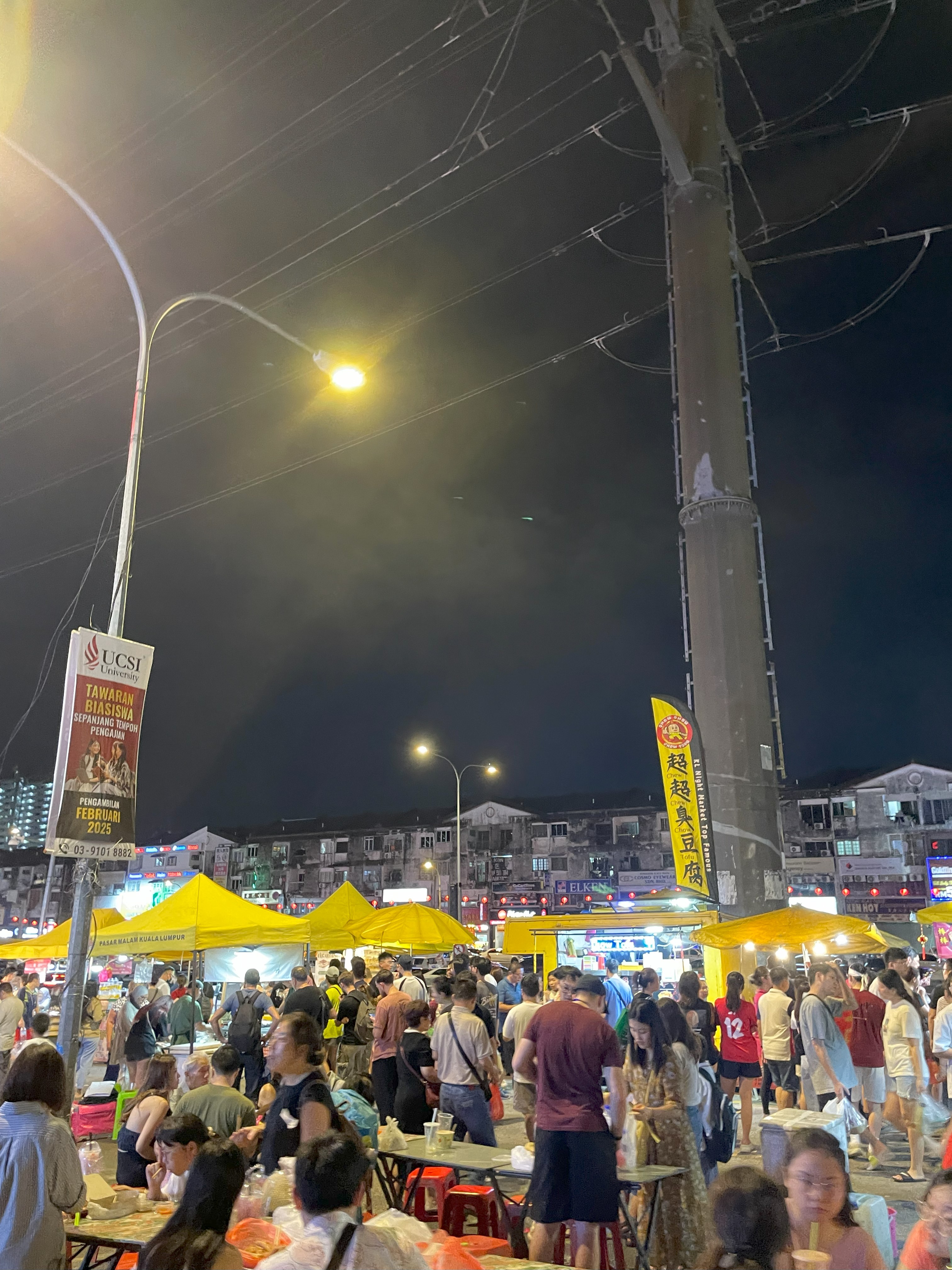 今回の留学は、私にとって大きな転機になったと感じています。元々コミュニケーション能力に自信がなかったのですが、マレーシアで英語を使って自主的に話せるようになったということは、自分にとって大きな成長だったと思います。この経験を踏まえて、今後は日本へ働きに来た外国人に対して、相談窓口などから英語を使って手助けし、少しでも日本での暮らしをより良いものとして感じてもらえるような仕事に関わりたいと考えています。
今回の留学は、私にとって大きな転機になったと感じています。元々コミュニケーション能力に自信がなかったのですが、マレーシアで英語を使って自主的に話せるようになったということは、自分にとって大きな成長だったと思います。この経験を踏まえて、今後は日本へ働きに来た外国人に対して、相談窓口などから英語を使って手助けし、少しでも日本での暮らしをより良いものとして感じてもらえるような仕事に関わりたいと考えています。
今回の留学で体験した個人的エピソードをご紹介します。大学の近くでは毎週水曜日にナイトマーケットという出店が沢山並び、ご飯は勿論、服やアクセサリーなどが通常より安く買えるお祭りのようなものがあるのですが、そこで日本では見たことのない食べ物をたくさん目にしました。その際に英語で「これは何ですか?」と質問し、自分が聞き理解した食べ物と一致しているか実際に食べてみるということを行い、毎週のマーケットで自分のリスニング力がどのくらい正確かを確認することを習慣化していました。
今後の目標
 今回の留学は、私にとって大きな転機になったと感じています。元々コミュニケーション能力に自信がなかったのですが、マレーシアで英語を使って自主的に話せるようになったということは、自分にとって大きな成長だったと思います。この経験を踏まえて、今後は日本へ働きに来た外国人に対して、相談窓口などから英語を使って手助けし、少しでも日本での暮らしをより良いものとして感じてもらえるような仕事に関わりたいと考えています。
今回の留学は、私にとって大きな転機になったと感じています。元々コミュニケーション能力に自信がなかったのですが、マレーシアで英語を使って自主的に話せるようになったということは、自分にとって大きな成長だったと思います。この経験を踏まえて、今後は日本へ働きに来た外国人に対して、相談窓口などから英語を使って手助けし、少しでも日本での暮らしをより良いものとして感じてもらえるような仕事に関わりたいと考えています。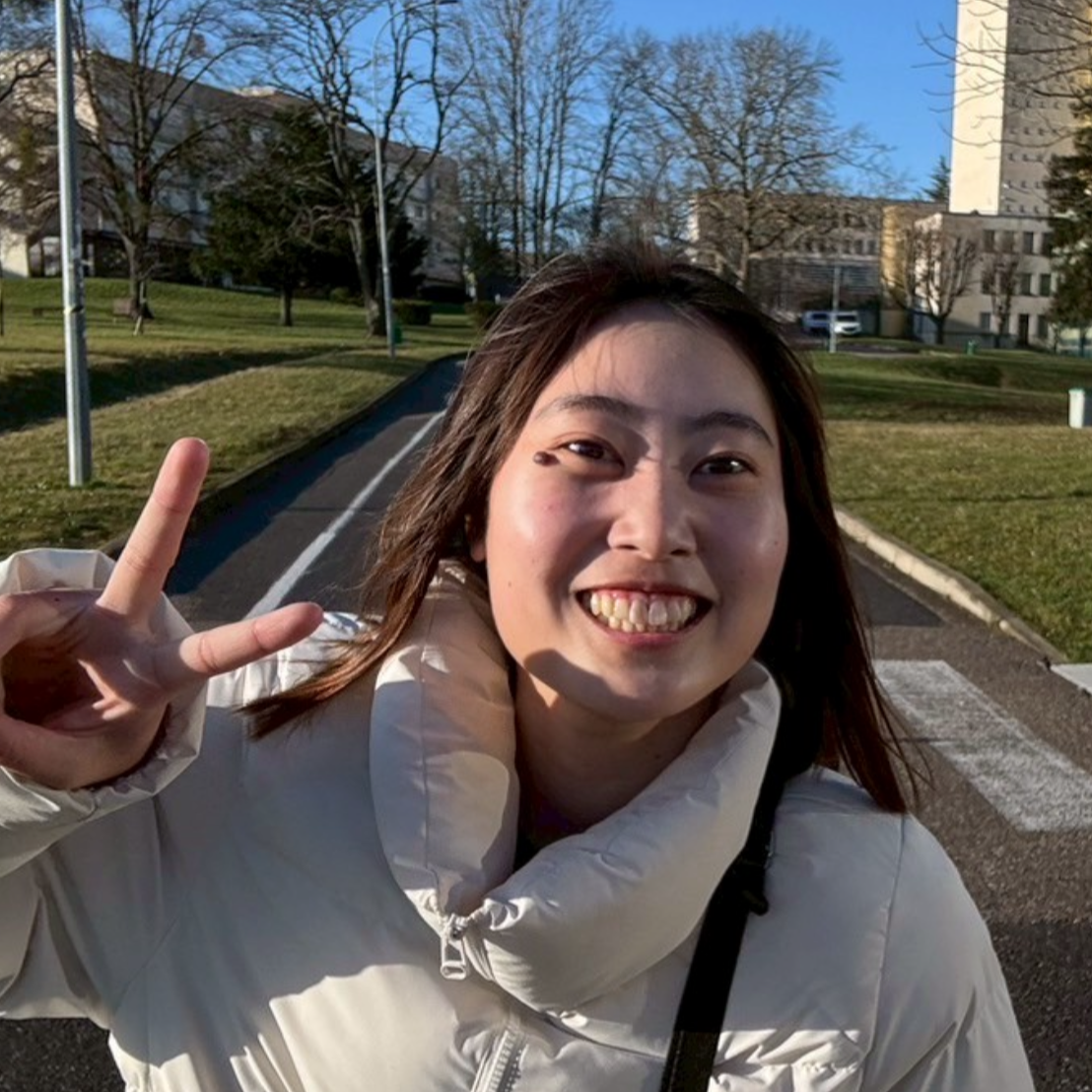
野上 渚月(NOGAMI Natsuki)
派遣先:フランス
AUGPに参加した理由/留学先にフランスを選んだ理由
私がAUGPフランスに参加した理由は、大学に入ってから学び始めたフランス語を実際に現地で使ってみたいと思ったからです。日本にいたらなかなか使う機会もなく、勉強だけで終わってしまうのはもったいないと思い、留学に行きたい気持ちが強まりました。もともと世界遺産に興味があり、フランスには多くの世界遺産があるので、歴史的な街並みや建物を実際に見て肌で感じたいと思ったことも、理由の一つです。
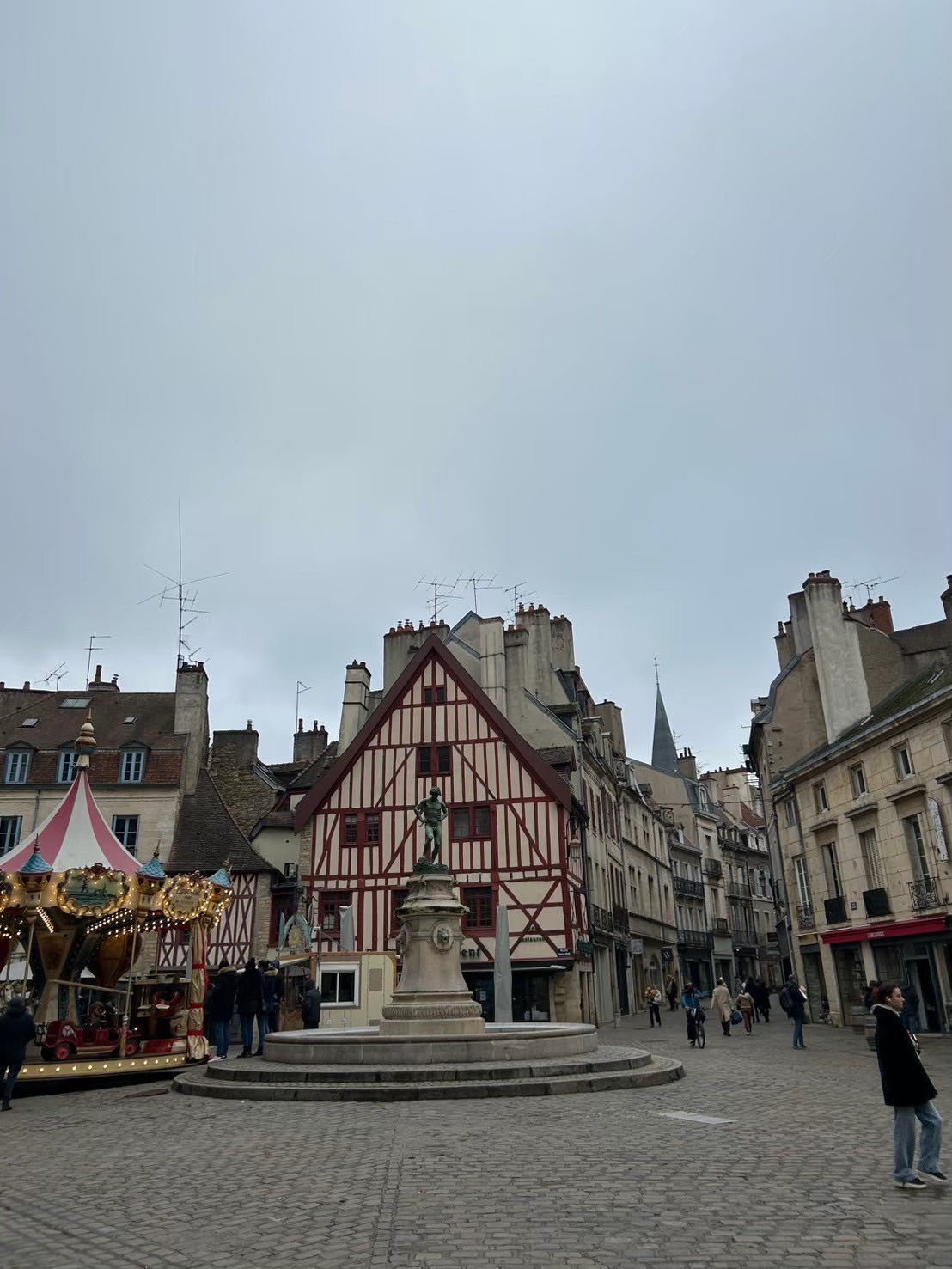 現地での授業や生活
現地での授業や生活
現地での授業は週に4日で1日5時間ありました。授業の内容としては、動詞の活用や冠詞などの基本的な文法や短い会話文の聞き取りや、学んだことを実際に使って話すなどを行いました。文法に関しては、日本で学んだことと同じような内容でしたが、すべてフランス語で行われるため、はじめは先生が何を話しているのかすら理解できず、話していることの聞き取りや、知らない単語の意味を調べるのに必死で、授業についていくのが精いっぱいでした。しかし、授業を受けていくうちに、だんだんと先生の話していることを理解できるようになり、授業内容の理解度がはじめとは比べものにならないぐらい向上しました。自分の中でも聞き取る力がとても身についていると感じ、何を話しているのか理解できた時はとても嬉しかったです。また、お昼休みの時間には、500円ぐらいで量がたっぷりの学食を同じクラスの学生たちと一緒に食べ、他愛もない会話をするのが楽しかったです。授業は15時に終わるので、授業後は図書館でみんなと一緒に宿題やその日習ったことを復習したり、カフェに行ったり、トラムに乗って少し行くとある大きなショッピングモールで買い物をしたりして過ごしていました。
私がAUGPフランスに参加した理由は、大学に入ってから学び始めたフランス語を実際に現地で使ってみたいと思ったからです。日本にいたらなかなか使う機会もなく、勉強だけで終わってしまうのはもったいないと思い、留学に行きたい気持ちが強まりました。もともと世界遺産に興味があり、フランスには多くの世界遺産があるので、歴史的な街並みや建物を実際に見て肌で感じたいと思ったことも、理由の一つです。
 現地での授業や生活
現地での授業や生活
現地での授業は週に4日で1日5時間ありました。授業の内容としては、動詞の活用や冠詞などの基本的な文法や短い会話文の聞き取りや、学んだことを実際に使って話すなどを行いました。文法に関しては、日本で学んだことと同じような内容でしたが、すべてフランス語で行われるため、はじめは先生が何を話しているのかすら理解できず、話していることの聞き取りや、知らない単語の意味を調べるのに必死で、授業についていくのが精いっぱいでした。しかし、授業を受けていくうちに、だんだんと先生の話していることを理解できるようになり、授業内容の理解度がはじめとは比べものにならないぐらい向上しました。自分の中でも聞き取る力がとても身についていると感じ、何を話しているのか理解できた時はとても嬉しかったです。また、お昼休みの時間には、500円ぐらいで量がたっぷりの学食を同じクラスの学生たちと一緒に食べ、他愛もない会話をするのが楽しかったです。授業は15時に終わるので、授業後は図書館でみんなと一緒に宿題やその日習ったことを復習したり、カフェに行ったり、トラムに乗って少し行くとある大きなショッピングモールで買い物をしたりして過ごしていました。
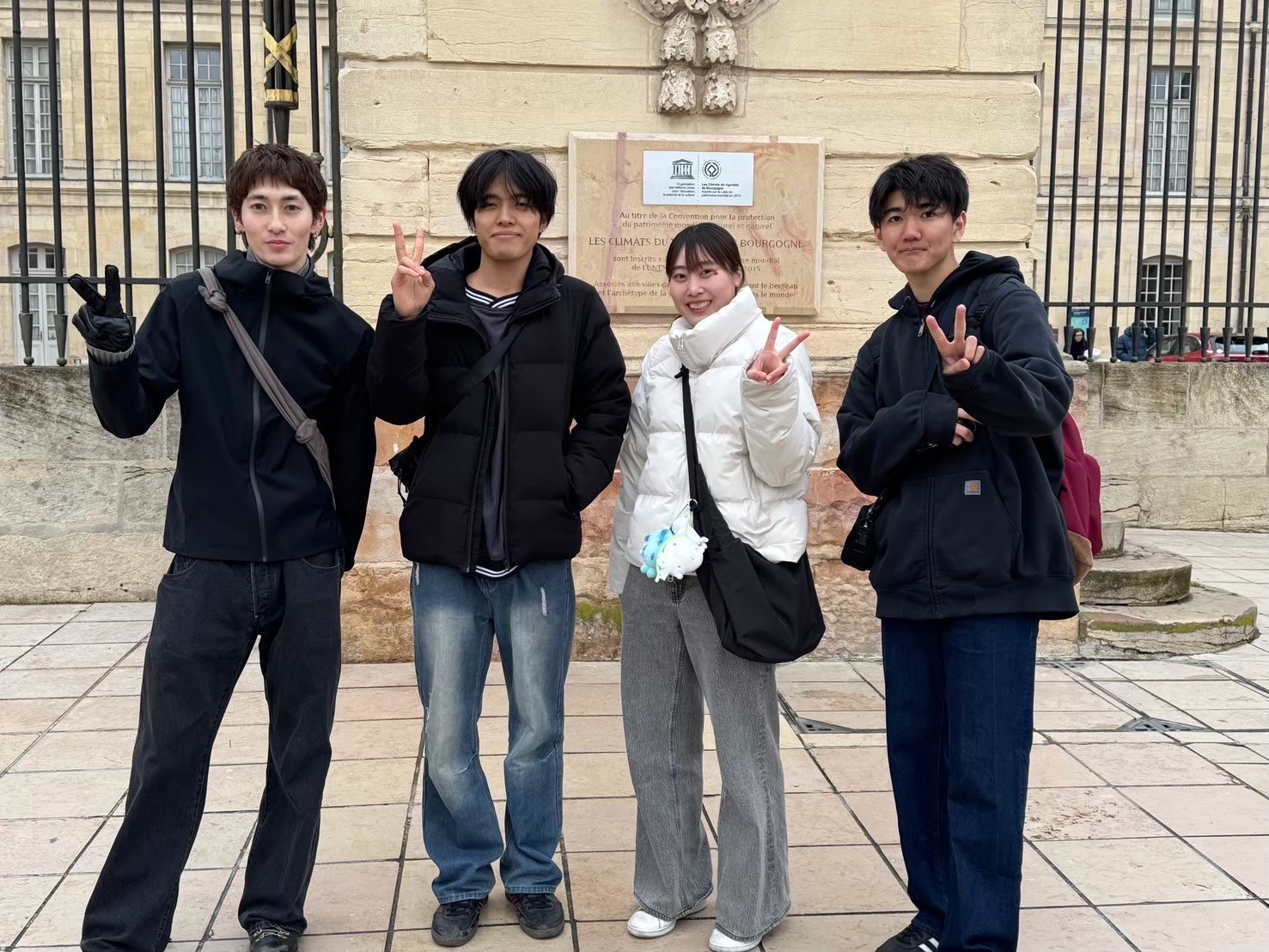
印象的な出来事
留学中に経験したことは書ききれないほどたくさんありますが、フランスでの生活の中で特に記憶に残っていることは2つあります。1つ目は、ファーマシー(薬局)に買い物に行ったときに店員さんが親切に話しかけてくれておすすめなどを教えてくれましたが、言っていることが全然理解できず、会話すら成り立たず申し訳なさと悔しさを感じたことです。その時に、もっと勉強して楽しく会話できるようになりたいと思い、より一層フランス語の勉強に熱が入りました。2つ目は、一緒に留学に行った学生たちとディジョンの市街地を自転車で走ったことです。フランスの歴史ある街並みの中を自転車で走る爽快感は唯一無二の体験でした。
今後の目標
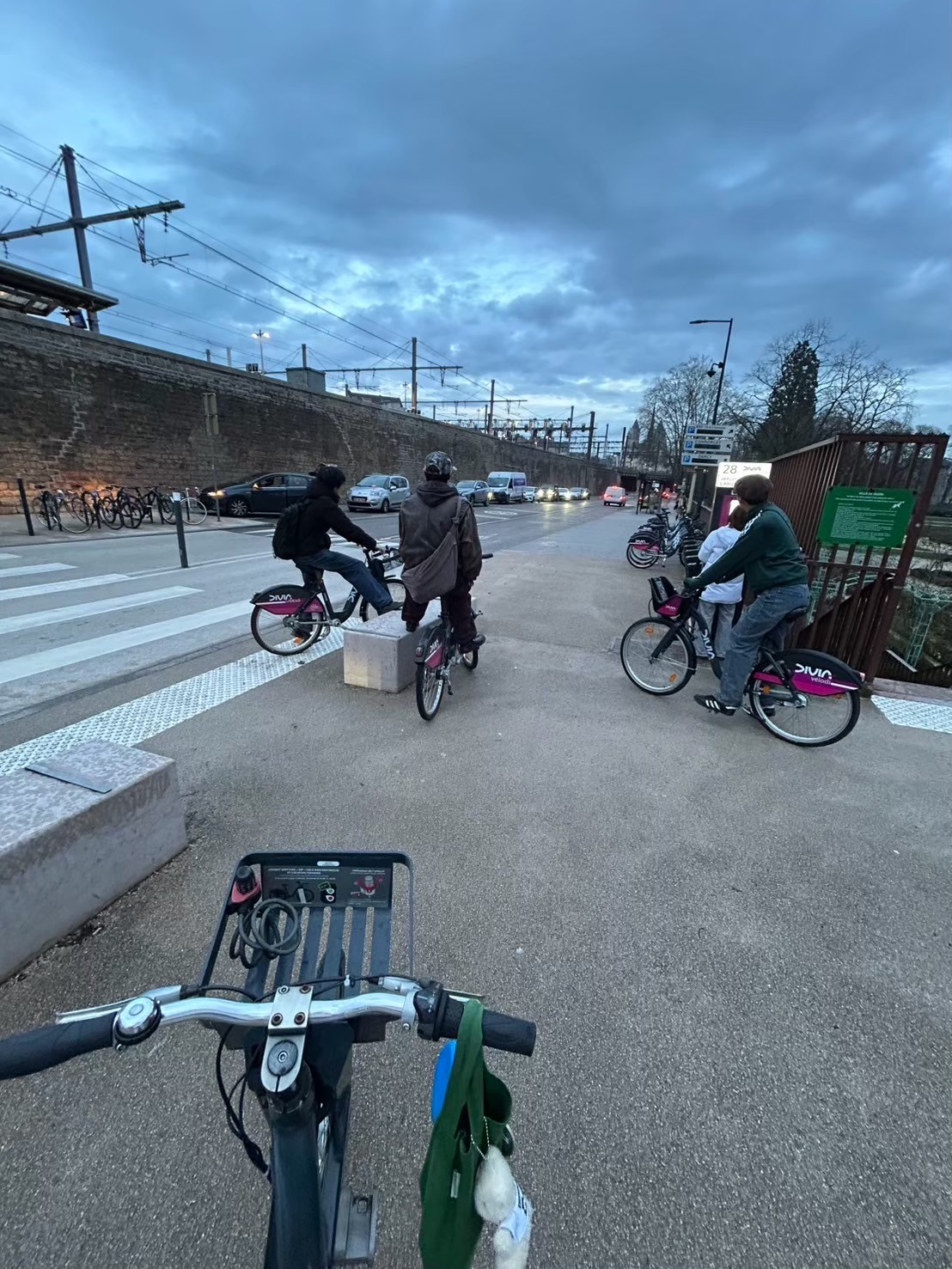
4週間の留学は長いようで短く、非常に充実した時間になりました。今回の留学を経て、さらにフランス語を勉強したい気持ちが強まり、フランスの歴史や文化も大好きになりました。今後は、仏検準2級やDELFにも挑戦して、もっとフランス語がしゃべれるように勉強を続けたいです。そして、またフランスに行く機会があれば、現地の人たちと楽しく会話ができたらいいなと思います。
留学中に経験したことは書ききれないほどたくさんありますが、フランスでの生活の中で特に記憶に残っていることは2つあります。1つ目は、ファーマシー(薬局)に買い物に行ったときに店員さんが親切に話しかけてくれておすすめなどを教えてくれましたが、言っていることが全然理解できず、会話すら成り立たず申し訳なさと悔しさを感じたことです。その時に、もっと勉強して楽しく会話できるようになりたいと思い、より一層フランス語の勉強に熱が入りました。2つ目は、一緒に留学に行った学生たちとディジョンの市街地を自転車で走ったことです。フランスの歴史ある街並みの中を自転車で走る爽快感は唯一無二の体験でした。
今後の目標

4週間の留学は長いようで短く、非常に充実した時間になりました。今回の留学を経て、さらにフランス語を勉強したい気持ちが強まり、フランスの歴史や文化も大好きになりました。今後は、仏検準2級やDELFにも挑戦して、もっとフランス語がしゃべれるように勉強を続けたいです。そして、またフランスに行く機会があれば、現地の人たちと楽しく会話ができたらいいなと思います。

堀 すみれ(HORI Sumire)
派遣先:韓国
AUGPに参加した理由/留学先に韓国を選んだ理由
私は、元々K-popが好きだったことがきっかけで韓国語を話せるようになりたいと思い、大学1年生から授業で韓国語を履修してきました。その中で、言語だけでなく韓国の文化や礼儀など、韓国という国についても興味を持つようになりました。言語や文化をより深く学ぶためには現地に訪れないと分からないと感じ、AUGPに参加しました。
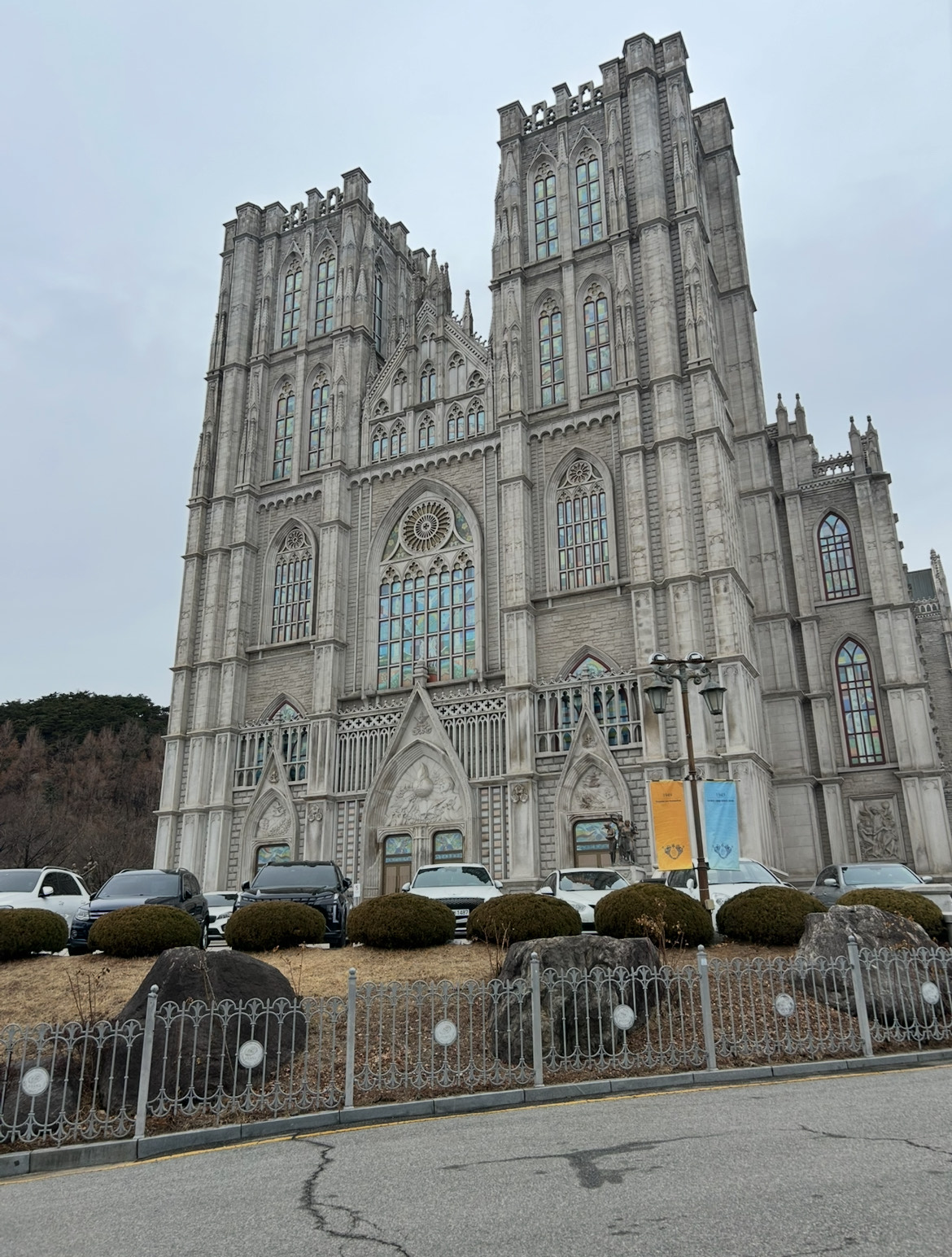 現地での授業や生活
現地での授業や生活
私が参加した年は、寮ではなくホテルに三週間滞在しました。ホテルから学校までは遠く、電車を使い、徒歩も含めて、合計約1時間かけて通っていました。学校までは少し遠いですが、電車を毎日使うので韓国人の日常の生活感を見ることができて新たな学びが多かったです。授業では、初日にレベルチェックテストがあり、そのテストの成績で、高級・上級・中級・初級のクラスに分けられました。週5日の1日4コマの授業(9時から13時)で私のクラスは14人いました。レベルに合った教科書を現地で購入し、その教科書を使い、主文法の授業や「話す・聞く」の授業を進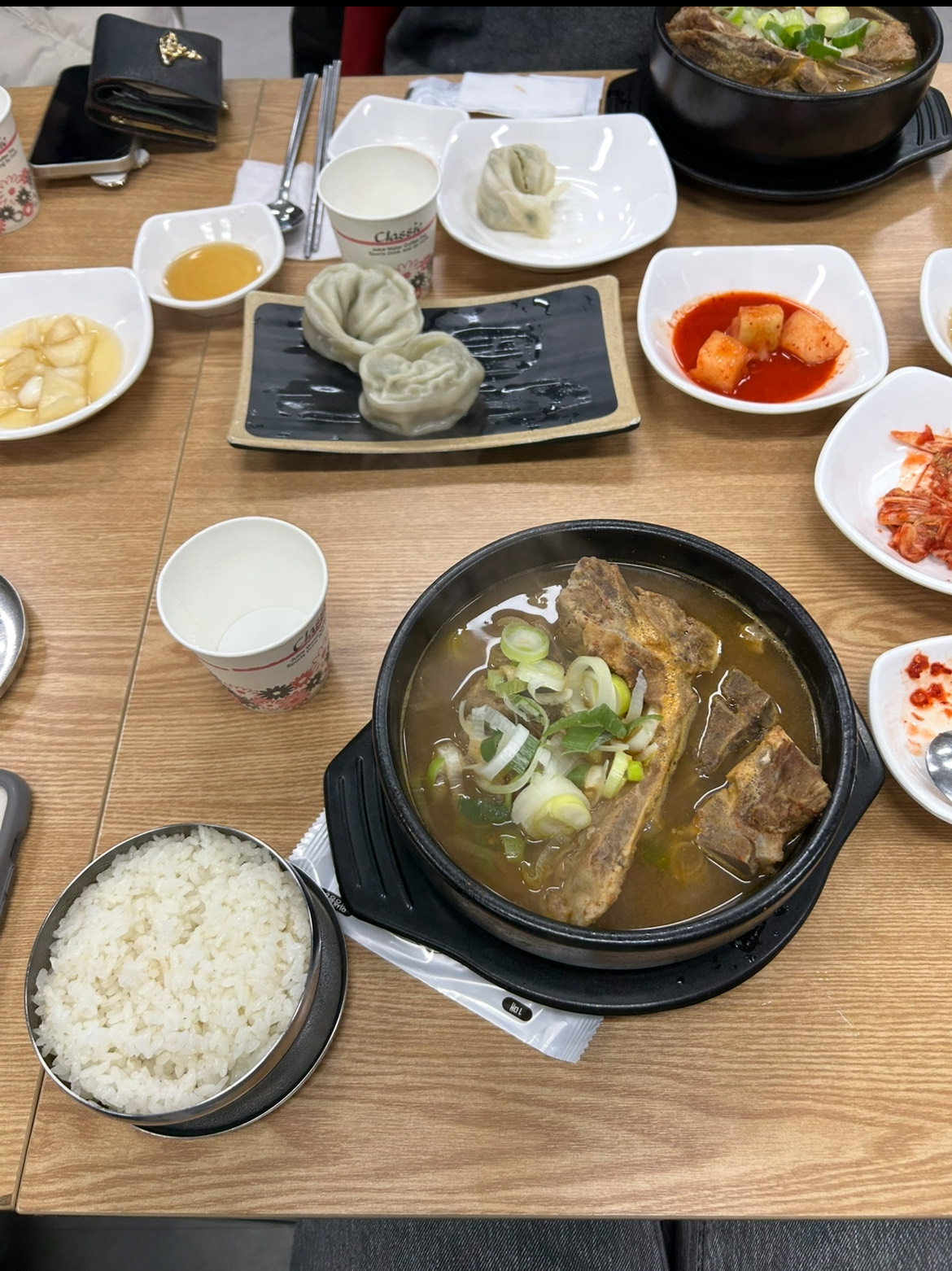 めます。また、現地学習として韓国の有名な場所であるロッテワールドに行ったり、韓国の文化体験をしたり、言語を学ぶだけでなく、クラスメイトとの交流の時間もあり本当に楽しかったです。私は今回の留学に友達と一緒ではなく1人で参加したため、初めは友達作りがとても不安でしたが、留学が終わる最後の日にはたくさんの友達ができていました。毎日の生活について、食事は常に外食かコンビニで調達していました。値段的にはとても高いという訳ではなく、日本とあまり変わらないと感じました。韓国料理は本当にすべておいしかったです。
めます。また、現地学習として韓国の有名な場所であるロッテワールドに行ったり、韓国の文化体験をしたり、言語を学ぶだけでなく、クラスメイトとの交流の時間もあり本当に楽しかったです。私は今回の留学に友達と一緒ではなく1人で参加したため、初めは友達作りがとても不安でしたが、留学が終わる最後の日にはたくさんの友達ができていました。毎日の生活について、食事は常に外食かコンビニで調達していました。値段的にはとても高いという訳ではなく、日本とあまり変わらないと感じました。韓国料理は本当にすべておいしかったです。
私は、元々K-popが好きだったことがきっかけで韓国語を話せるようになりたいと思い、大学1年生から授業で韓国語を履修してきました。その中で、言語だけでなく韓国の文化や礼儀など、韓国という国についても興味を持つようになりました。言語や文化をより深く学ぶためには現地に訪れないと分からないと感じ、AUGPに参加しました。
 現地での授業や生活
現地での授業や生活
私が参加した年は、寮ではなくホテルに三週間滞在しました。ホテルから学校までは遠く、電車を使い、徒歩も含めて、合計約1時間かけて通っていました。学校までは少し遠いですが、電車を毎日使うので韓国人の日常の生活感を見ることができて新たな学びが多かったです。授業では、初日にレベルチェックテストがあり、そのテストの成績で、高級・上級・中級・初級のクラスに分けられました。週5日の1日4コマの授業(9時から13時)で私のクラスは14人いました。レベルに合った教科書を現地で購入し、その教科書を使い、主文法の授業や「話す・聞く」の授業を進
 めます。また、現地学習として韓国の有名な場所であるロッテワールドに行ったり、韓国の文化体験をしたり、言語を学ぶだけでなく、クラスメイトとの交流の時間もあり本当に楽しかったです。私は今回の留学に友達と一緒ではなく1人で参加したため、初めは友達作りがとても不安でしたが、留学が終わる最後の日にはたくさんの友達ができていました。毎日の生活について、食事は常に外食かコンビニで調達していました。値段的にはとても高いという訳ではなく、日本とあまり変わらないと感じました。韓国料理は本当にすべておいしかったです。
めます。また、現地学習として韓国の有名な場所であるロッテワールドに行ったり、韓国の文化体験をしたり、言語を学ぶだけでなく、クラスメイトとの交流の時間もあり本当に楽しかったです。私は今回の留学に友達と一緒ではなく1人で参加したため、初めは友達作りがとても不安でしたが、留学が終わる最後の日にはたくさんの友達ができていました。毎日の生活について、食事は常に外食かコンビニで調達していました。値段的にはとても高いという訳ではなく、日本とあまり変わらないと感じました。韓国料理は本当にすべておいしかったです。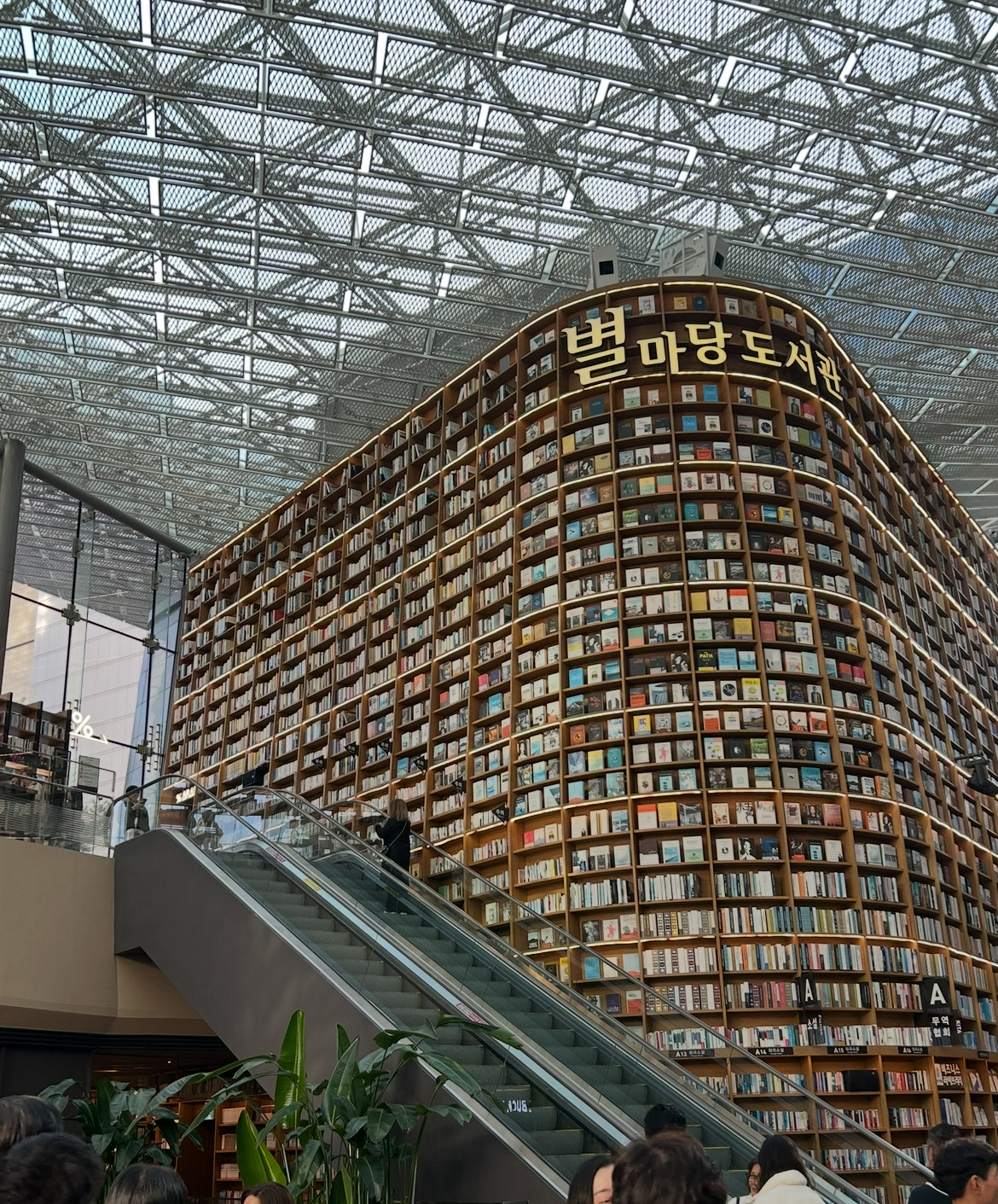
印象的な出来事
私は今回初めての留学且つ、初めての海外でした。その中で一番大変だったことは、やはり言語の壁でした。私の所属したクラスは自分のレベルより上のクラスであった為、授業で取り組む内容に追いつくのに必死でした。もちろん先生は韓国語で文法などの説明をされるので、日本語は一切話しません。最初はその環境に慣れずにいましたが、毎日ホテルで復習したり、習った単語をメモして実生活で試していました。そうしているうちに、日常会話がだんだんと聞き取れるようになり、本当に心から嬉しかったです。
今後の目標
韓国に行く前は韓国語の読み方さえも怪しかった私ですが、今回の留学を通じて韓国語の字幕を追えるようになりました。そのような成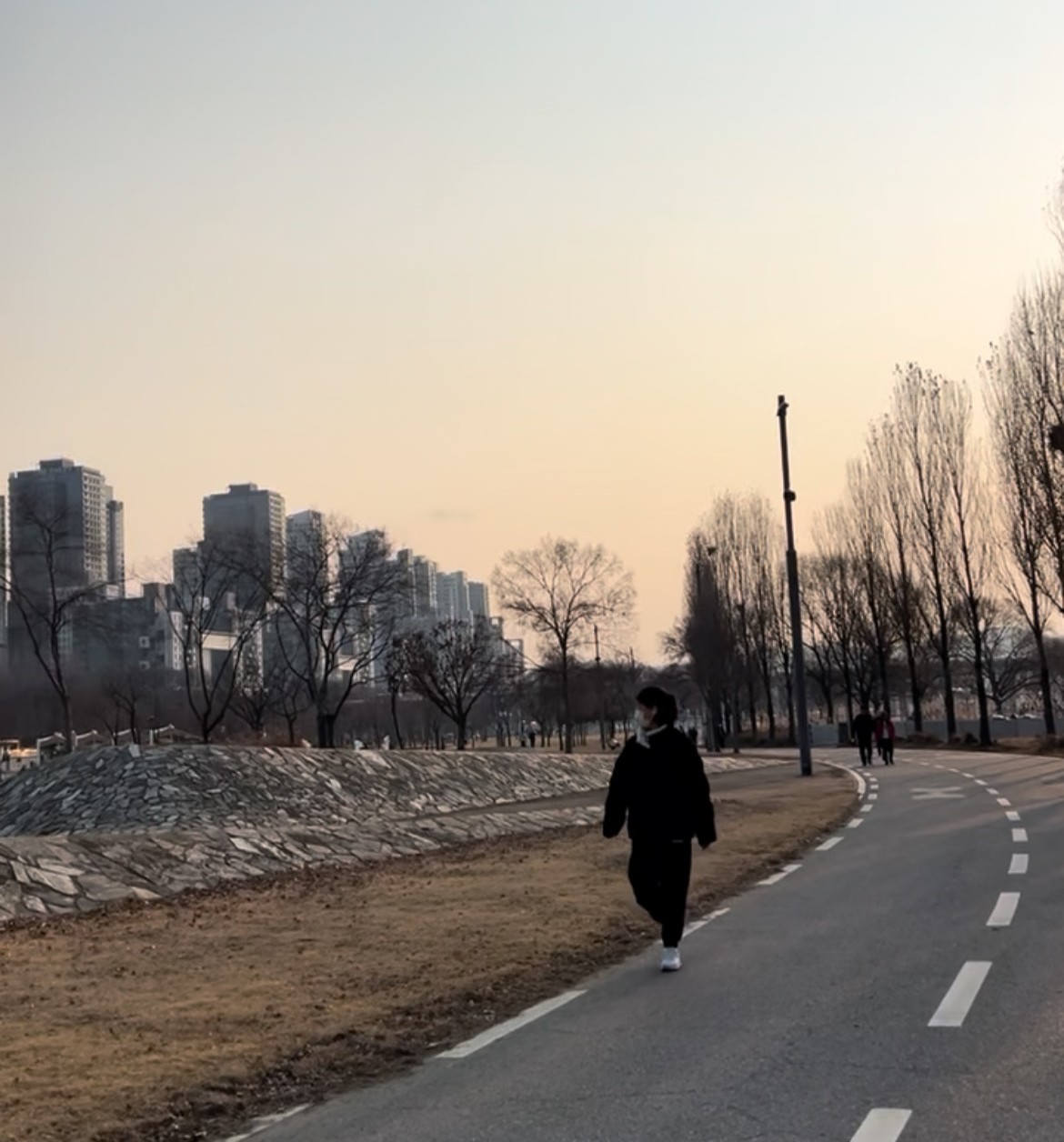 果を感じているからこそ、ここで勉強をやめるのではなく、さらなる上達を目指してTOPIKの試験にチャレンジしようと考えています。そして、将来ビジネスでも韓国語を活用できるくらいのコミュニケーション能力を身に付けられるように今後も努力していきます。
果を感じているからこそ、ここで勉強をやめるのではなく、さらなる上達を目指してTOPIKの試験にチャレンジしようと考えています。そして、将来ビジネスでも韓国語を活用できるくらいのコミュニケーション能力を身に付けられるように今後も努力していきます。
私は今回初めての留学且つ、初めての海外でした。その中で一番大変だったことは、やはり言語の壁でした。私の所属したクラスは自分のレベルより上のクラスであった為、授業で取り組む内容に追いつくのに必死でした。もちろん先生は韓国語で文法などの説明をされるので、日本語は一切話しません。最初はその環境に慣れずにいましたが、毎日ホテルで復習したり、習った単語をメモして実生活で試していました。そうしているうちに、日常会話がだんだんと聞き取れるようになり、本当に心から嬉しかったです。
今後の目標
韓国に行く前は韓国語の読み方さえも怪しかった私ですが、今回の留学を通じて韓国語の字幕を追えるようになりました。そのような成
 果を感じているからこそ、ここで勉強をやめるのではなく、さらなる上達を目指してTOPIKの試験にチャレンジしようと考えています。そして、将来ビジネスでも韓国語を活用できるくらいのコミュニケーション能力を身に付けられるように今後も努力していきます。
果を感じているからこそ、ここで勉強をやめるのではなく、さらなる上達を目指してTOPIKの試験にチャレンジしようと考えています。そして、将来ビジネスでも韓国語を活用できるくらいのコミュニケーション能力を身に付けられるように今後も努力していきます。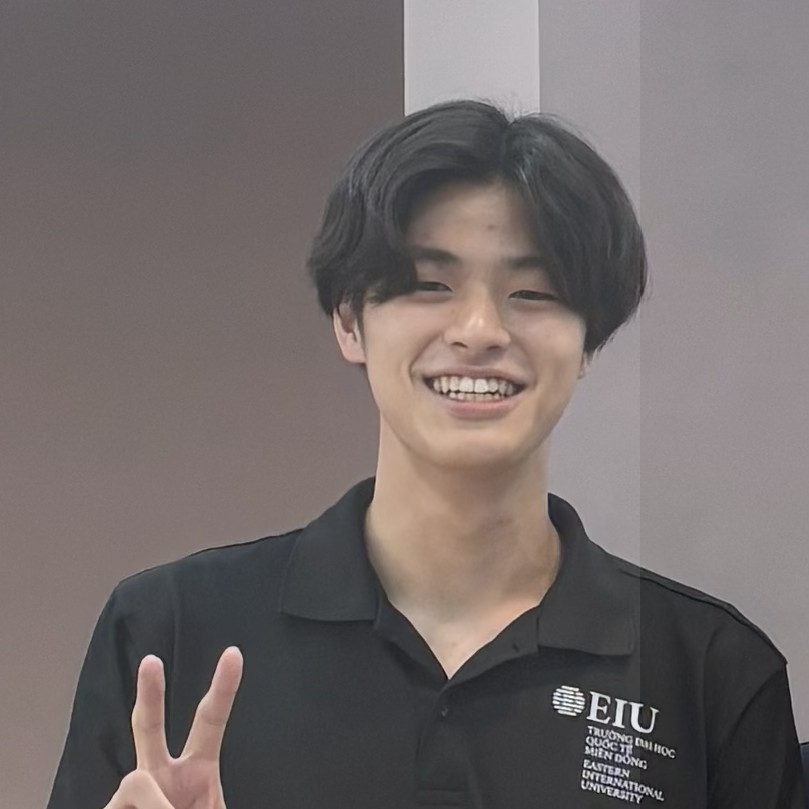
野口 敬悟(NOGUCHI Keigo)
派遣先:ベトナム
AUGPに参加した理由/留学先にベトナムを選んだ理由
もともと海外に興味があり、春季休暇期間を家でダラダラ過ごすのではなく、自分の英語力や自主性を高めるために有意義に使いたいと考え、留学を希望しました。その中でベトナムを選んだ理由は、父が出張で訪れた際の話を聞いて関心を持っていたことに加え、日本とは異なり若年層の多い国の雰囲気を実際に見て、日本との違いを肌で感じてみたいと考えたからです。
 現地での授業や生活
現地での授業や生活
現地では、授業初日にプレテストがあり、その成績に応じてクラス分けされ、私は現地の学生20人程度と日本人3人のクラスになりました。授業は、月〜金曜の7:30~9:30と9:45~11:30の2コマ、そして週に1度のスピーキングクラブとチュータークラスがありました。2コマの授業と週に1度のスピーキングクラブでは、ブラジルやオーストラリアなど英語圏の国の方が先生でした。チュータークラスでは、現地のベトナム人の学生が先生役となり、1時間程度、会話練習や文法の指導をしてくださいました。月〜金曜の授業では、主にリスニング・リーディング・スピーキング・ライティングの4技能を行いました。リスニングとリーディングは、自分で問題を解いた後にグループの3〜4人と回答のシェアをして、その回答になった理由を英語で説明する時間が設けられていました。スピーキングでは、出されたお題に対して2分間話し続けるという内容もありました。ライティングでは、毎週250字程度の文章を書き、それを先生が添削してくださいました。初日の授業からコミュニケーションを積極的とるように努力したためか2日目以降は自然にクラスに馴染むことができました。また、毎日日本語を覚えてきて話しかけてくれるクラスメイトもいて授業時間以外も楽しく過ごすことができました。現地の生活は非常に充実していました。朝は宿舎の前にあるバス停からバスに乗れば学校の目の前で降車することができます。ただ、朝6:45のバスに乗らないと授業に間に合わないので朝早く起きる必要があります。宿舎や教室、図書館、近くのイオンモールには冷房が効いてい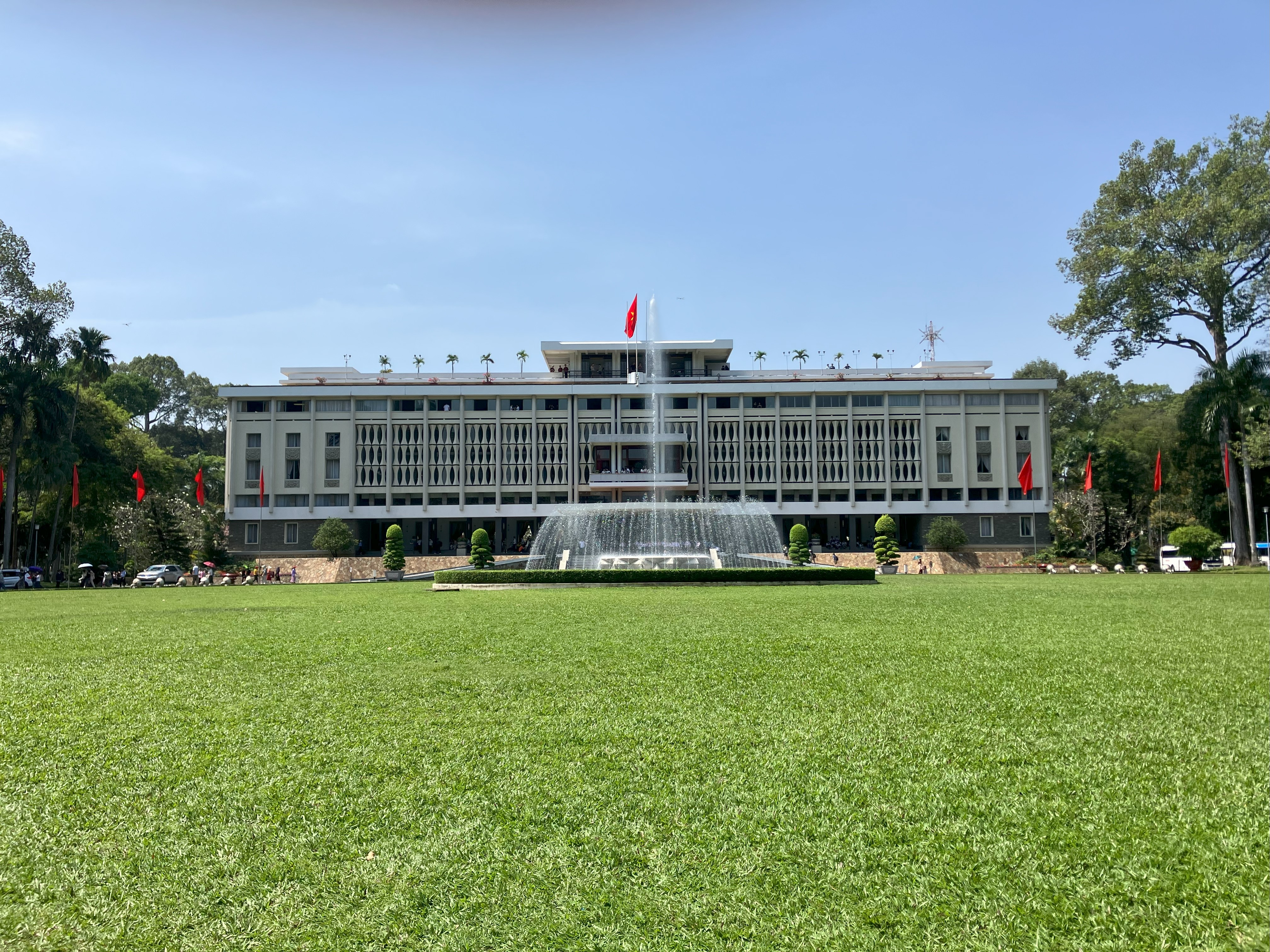 て寒いくらいでしたが、学食やカフェには冷房がなく、かなり暑く感じました。学食では、麺類かご飯から選ぶことができ日替わりなので飽きることもありませんでした。ですが、店員さんに英語が通じる時と通じない時があるので、注文はベトナム人の友人に頼むこともありました。学校が終わった後は、ベトナム人の友人と外食に行くこともありました。それ以外の時は、近くのイオンで惣菜を購入したり、部屋で自炊をしていました。私はコーヒーが好きなのでほぼ毎日、現地ではとても人気のある「ハイランドコーヒー」やベトナム人の友達に紹介してもらったカフェを訪れていました。日本ではなかなか出会えないベトナムコーヒー独特の香りがしてとても美味しかったです。週末(土曜日)には、1週目に「クチトンネル」、2週目に「ホーチミン観光ツアー」がありました。クチトンネルのツアーでは、ベトナム戦争で使用されたトンネルや戦車、武器、ベトナム人の工夫などを実際に見学し、体験することもできました。ホーチミン観光ツアーでは、観光名所を巡ったあと、市場での買い物体験がありました。その際、現地で私たちを案内してくださったタンさんから過剰な料金の請求に注意するように言われ、値下げ交渉をするよう指示されました。交渉は成立しませんでしたが、日本では経験することのできないことでした。
て寒いくらいでしたが、学食やカフェには冷房がなく、かなり暑く感じました。学食では、麺類かご飯から選ぶことができ日替わりなので飽きることもありませんでした。ですが、店員さんに英語が通じる時と通じない時があるので、注文はベトナム人の友人に頼むこともありました。学校が終わった後は、ベトナム人の友人と外食に行くこともありました。それ以外の時は、近くのイオンで惣菜を購入したり、部屋で自炊をしていました。私はコーヒーが好きなのでほぼ毎日、現地ではとても人気のある「ハイランドコーヒー」やベトナム人の友達に紹介してもらったカフェを訪れていました。日本ではなかなか出会えないベトナムコーヒー独特の香りがしてとても美味しかったです。週末(土曜日)には、1週目に「クチトンネル」、2週目に「ホーチミン観光ツアー」がありました。クチトンネルのツアーでは、ベトナム戦争で使用されたトンネルや戦車、武器、ベトナム人の工夫などを実際に見学し、体験することもできました。ホーチミン観光ツアーでは、観光名所を巡ったあと、市場での買い物体験がありました。その際、現地で私たちを案内してくださったタンさんから過剰な料金の請求に注意するように言われ、値下げ交渉をするよう指示されました。交渉は成立しませんでしたが、日本では経験することのできないことでした。
もともと海外に興味があり、春季休暇期間を家でダラダラ過ごすのではなく、自分の英語力や自主性を高めるために有意義に使いたいと考え、留学を希望しました。その中でベトナムを選んだ理由は、父が出張で訪れた際の話を聞いて関心を持っていたことに加え、日本とは異なり若年層の多い国の雰囲気を実際に見て、日本との違いを肌で感じてみたいと考えたからです。
 現地での授業や生活
現地での授業や生活
現地では、授業初日にプレテストがあり、その成績に応じてクラス分けされ、私は現地の学生20人程度と日本人3人のクラスになりました。授業は、月〜金曜の7:30~9:30と9:45~11:30の2コマ、そして週に1度のスピーキングクラブとチュータークラスがありました。2コマの授業と週に1度のスピーキングクラブでは、ブラジルやオーストラリアなど英語圏の国の方が先生でした。チュータークラスでは、現地のベトナム人の学生が先生役となり、1時間程度、会話練習や文法の指導をしてくださいました。月〜金曜の授業では、主にリスニング・リーディング・スピーキング・ライティングの4技能を行いました。リスニングとリーディングは、自分で問題を解いた後にグループの3〜4人と回答のシェアをして、その回答になった理由を英語で説明する時間が設けられていました。スピーキングでは、出されたお題に対して2分間話し続けるという内容もありました。ライティングでは、毎週250字程度の文章を書き、それを先生が添削してくださいました。初日の授業からコミュニケーションを積極的とるように努力したためか2日目以降は自然にクラスに馴染むことができました。また、毎日日本語を覚えてきて話しかけてくれるクラスメイトもいて授業時間以外も楽しく過ごすことができました。現地の生活は非常に充実していました。朝は宿舎の前にあるバス停からバスに乗れば学校の目の前で降車することができます。ただ、朝6:45のバスに乗らないと授業に間に合わないので朝早く起きる必要があります。宿舎や教室、図書館、近くのイオンモールには冷房が効いてい
 て寒いくらいでしたが、学食やカフェには冷房がなく、かなり暑く感じました。学食では、麺類かご飯から選ぶことができ日替わりなので飽きることもありませんでした。ですが、店員さんに英語が通じる時と通じない時があるので、注文はベトナム人の友人に頼むこともありました。学校が終わった後は、ベトナム人の友人と外食に行くこともありました。それ以外の時は、近くのイオンで惣菜を購入したり、部屋で自炊をしていました。私はコーヒーが好きなのでほぼ毎日、現地ではとても人気のある「ハイランドコーヒー」やベトナム人の友達に紹介してもらったカフェを訪れていました。日本ではなかなか出会えないベトナムコーヒー独特の香りがしてとても美味しかったです。週末(土曜日)には、1週目に「クチトンネル」、2週目に「ホーチミン観光ツアー」がありました。クチトンネルのツアーでは、ベトナム戦争で使用されたトンネルや戦車、武器、ベトナム人の工夫などを実際に見学し、体験することもできました。ホーチミン観光ツアーでは、観光名所を巡ったあと、市場での買い物体験がありました。その際、現地で私たちを案内してくださったタンさんから過剰な料金の請求に注意するように言われ、値下げ交渉をするよう指示されました。交渉は成立しませんでしたが、日本では経験することのできないことでした。
て寒いくらいでしたが、学食やカフェには冷房がなく、かなり暑く感じました。学食では、麺類かご飯から選ぶことができ日替わりなので飽きることもありませんでした。ですが、店員さんに英語が通じる時と通じない時があるので、注文はベトナム人の友人に頼むこともありました。学校が終わった後は、ベトナム人の友人と外食に行くこともありました。それ以外の時は、近くのイオンで惣菜を購入したり、部屋で自炊をしていました。私はコーヒーが好きなのでほぼ毎日、現地ではとても人気のある「ハイランドコーヒー」やベトナム人の友達に紹介してもらったカフェを訪れていました。日本ではなかなか出会えないベトナムコーヒー独特の香りがしてとても美味しかったです。週末(土曜日)には、1週目に「クチトンネル」、2週目に「ホーチミン観光ツアー」がありました。クチトンネルのツアーでは、ベトナム戦争で使用されたトンネルや戦車、武器、ベトナム人の工夫などを実際に見学し、体験することもできました。ホーチミン観光ツアーでは、観光名所を巡ったあと、市場での買い物体験がありました。その際、現地で私たちを案内してくださったタンさんから過剰な料金の請求に注意するように言われ、値下げ交渉をするよう指示されました。交渉は成立しませんでしたが、日本では経験することのできないことでした。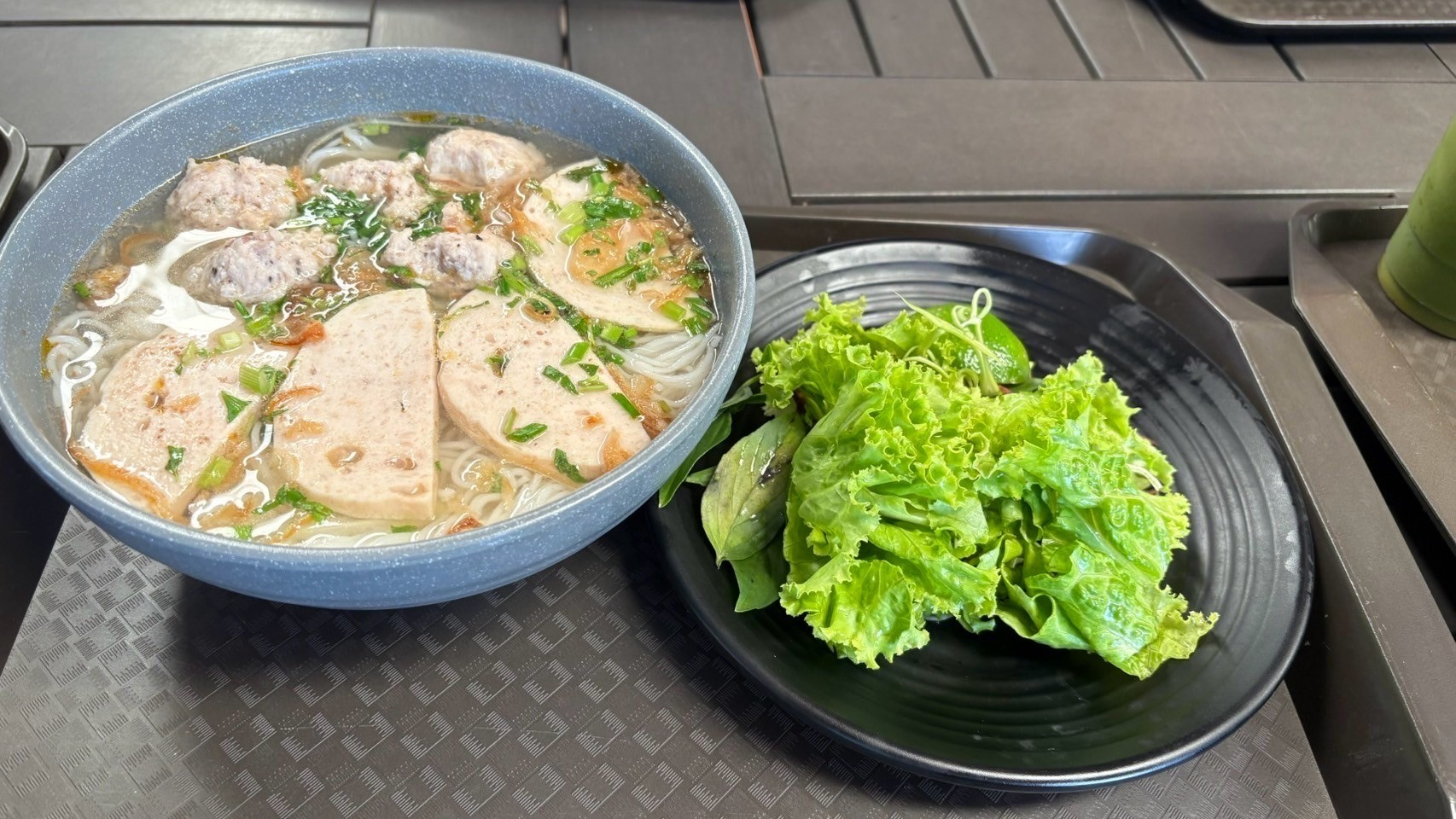
印象的な出来事
ベトナムの食べ物や飲み物には驚かされることばかりでした。カフェでブラックコーヒーを頼むと砂糖の入ったコーヒーが出てきます。そのため砂糖を抜いて提供して欲しいことを前もって伝える必要がありました。またある時、亜細亜大学の学生数人で鍋を作ることになり、大きなソーセージをたくさん入れました。ところが、そのソーセージがとても甘かったのです。さらに、学食のご飯の上にのっているお肉も甘く、ご飯に合うような味ではありませんでした。現地では、甘い味付けの肉料理が本当に多いと感じました。自分の口には、最後まであいませんでした。食文化の違いを強く実感した経験でしたが、美味しいものもたくさんありとてもいい経験になりました。
今後の目標
初めての留学で自分の英語の勉強不足を改めて痛感しました。そこで日本に帰ってからも英語にできるだけ触れ続けるようにしようと考え、毎日洋画を英語で観るなどせっかくの経験を無駄にしないように努力しています。また、ベトナム人の友達とは現在も毎日のように英語で連絡をとりあっています。ベトナムは、まだまだ発展途中の国で今回滞在した場所も多くが建設途中でした。また数年後同じ場所を訪れて発展した姿をこの目で確かめたいと考えています。次にベトナムを訪れて友人と再会した際、よりスムーズに英語でコミュニケーションが取れるよう、今後も英語の勉強を継続して取り組んでいきたいです。
ベトナムの食べ物や飲み物には驚かされることばかりでした。カフェでブラックコーヒーを頼むと砂糖の入ったコーヒーが出てきます。そのため砂糖を抜いて提供して欲しいことを前もって伝える必要がありました。またある時、亜細亜大学の学生数人で鍋を作ることになり、大きなソーセージをたくさん入れました。ところが、そのソーセージがとても甘かったのです。さらに、学食のご飯の上にのっているお肉も甘く、ご飯に合うような味ではありませんでした。現地では、甘い味付けの肉料理が本当に多いと感じました。自分の口には、最後まであいませんでした。食文化の違いを強く実感した経験でしたが、美味しいものもたくさんありとてもいい経験になりました。
今後の目標
初めての留学で自分の英語の勉強不足を改めて痛感しました。そこで日本に帰ってからも英語にできるだけ触れ続けるようにしようと考え、毎日洋画を英語で観るなどせっかくの経験を無駄にしないように努力しています。また、ベトナム人の友達とは現在も毎日のように英語で連絡をとりあっています。ベトナムは、まだまだ発展途中の国で今回滞在した場所も多くが建設途中でした。また数年後同じ場所を訪れて発展した姿をこの目で確かめたいと考えています。次にベトナムを訪れて友人と再会した際、よりスムーズに英語でコミュニケーションが取れるよう、今後も英語の勉強を継続して取り組んでいきたいです。
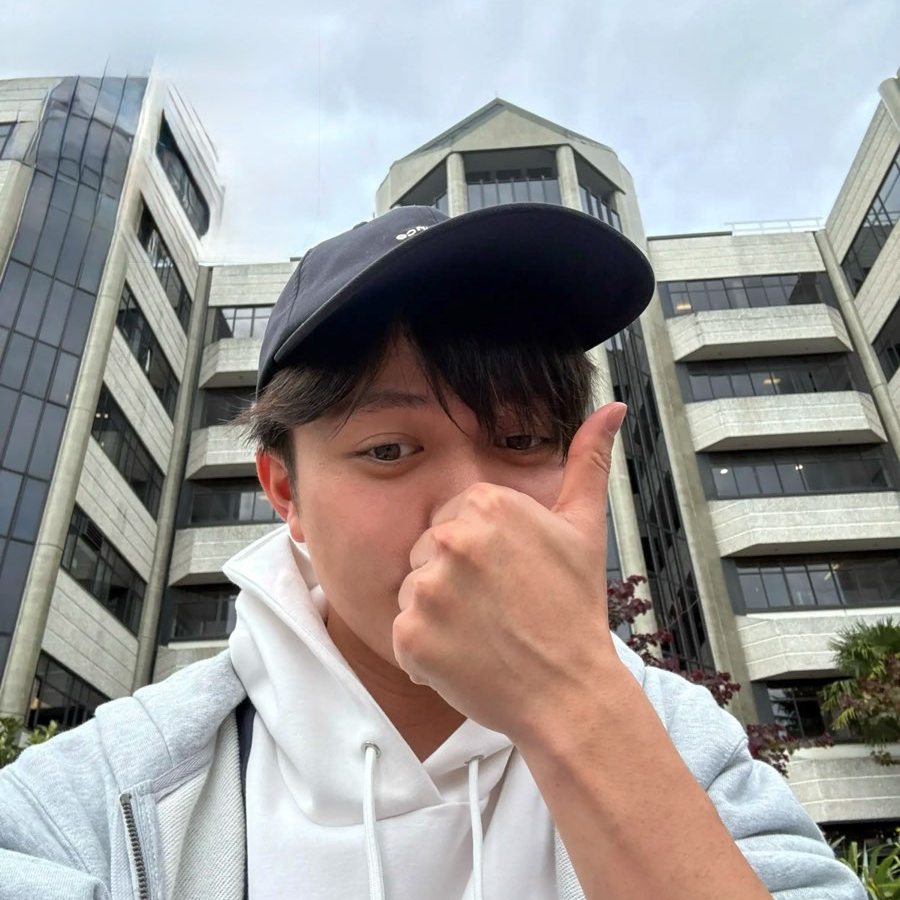
梶谷 紘宇(KAJIGAI Hirotaka)
派遣先:ニュージーランド
AUGPに参加した理由/留学先にニュージーランドを選んだ理由
大学入学後、一度は留学したいと考えていました。留学の目的は、語学力向上、異文化体験、そして人生経験を積むことです。正直、英語はほとんど話せませんでしたが、「何事もチャレンジ」という思いで応募しました。ニュージーランドを選んだ理由は、治安が良く、街もきれいで、自然豊かという点です。また、約1ヵ月という期間は、初めての留学にちょうど良いのではないか、と思ったからです。
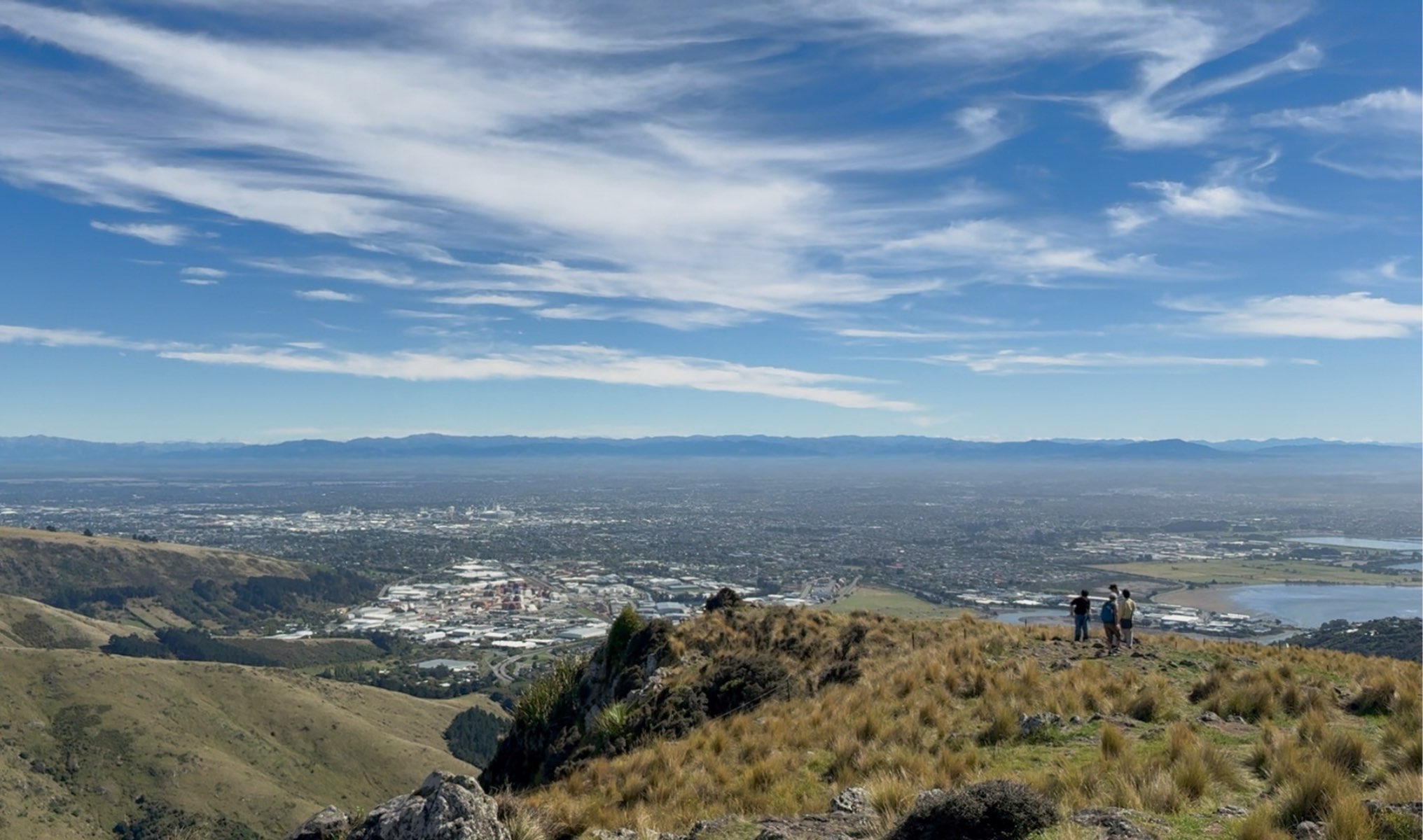 現地での授業や生活
現地での授業や生活
はじめに、派遣先大学のアラ・インスティチュート・オブ・カンタベリーでは、初日にオリエンテーション、校内紹介、レベル分けテスト(筆記・スピーキング)がありました。翌日からは、自分のレベルに合ったクラスで本格的に授業が開始。授業は月曜から木曜までの週4日です。午前中の3時間は文法やスピーキング、午後の2時間は文章読解やプレゼンテーションなど多岐にわたりました。また、週に一度午後に自習時間が設けられ、授業の復習や予習をしました。クラスは10〜20人程度で、国籍や年齢も様々。日本人留学生も多く、安心して学べました。次に、ホームステイについて。大学初日の授業後、校内カフェエリアでホストファミリーとの顔合わせがありまし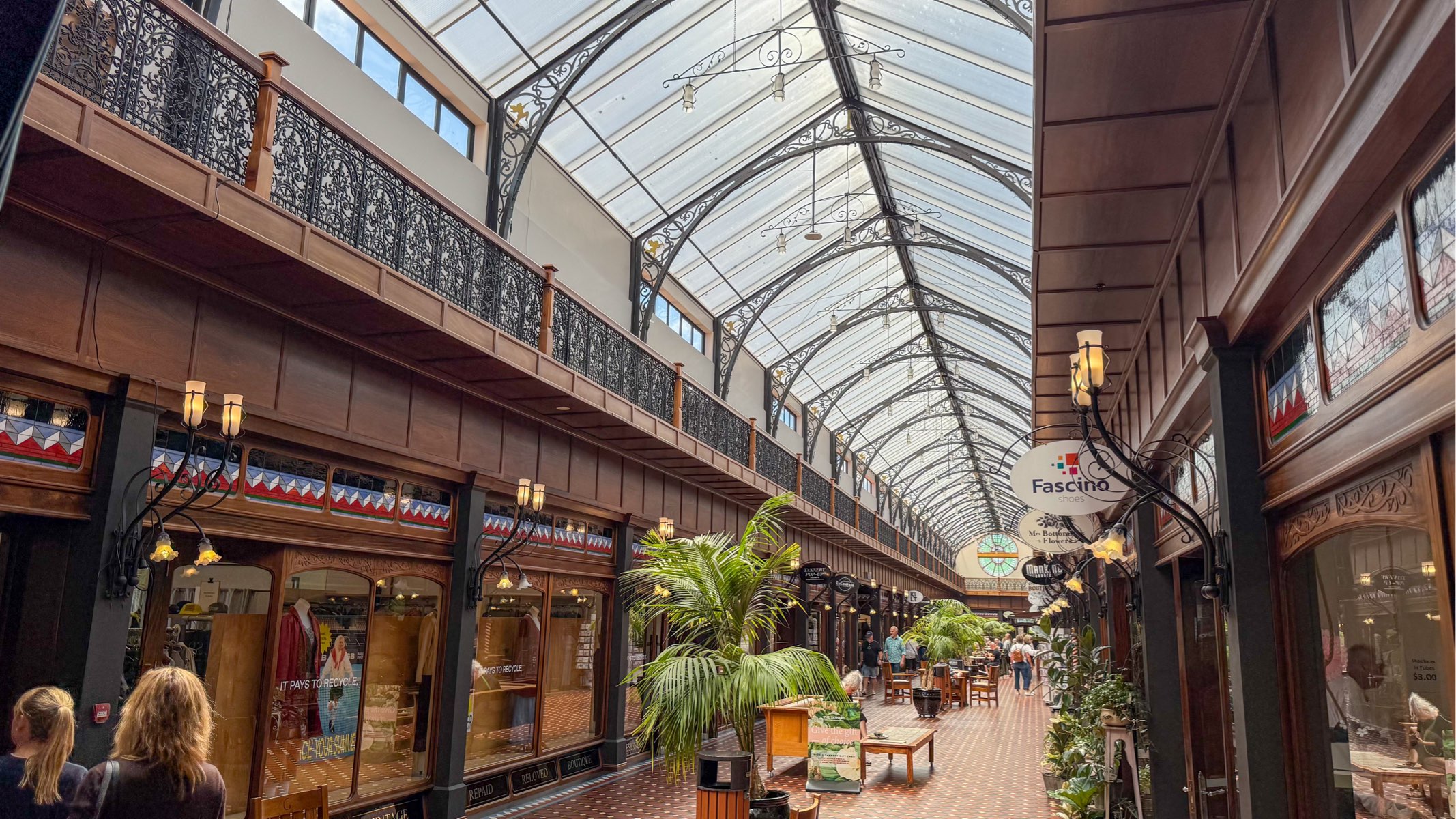 た。私のホームステイ先は非常に快適で、ハウスルールも少なく、かなり自由に過ごせました。食事については、朝はシリアルやフルーツなどを自由に食べることができ、授業日のお昼はホストファミリーがランチボックスを用意してくれました。フルーツやお菓子などが多いので、もし食事に関して要望があれば、早めに伝えることをお勧めします。休日は観光先で食事をすることが多かったです。夕食はホストファミリーと共に家で食べていました。ホストファミリーは私たちを家族のように温かく迎え入れてくれました。私が参加したときは、週に1度、ホームステイ担当の日本人スタッフが大学にホームステイの状況確認をしに来てくれたので、何か困りごとがあれば相談できました。
た。私のホームステイ先は非常に快適で、ハウスルールも少なく、かなり自由に過ごせました。食事については、朝はシリアルやフルーツなどを自由に食べることができ、授業日のお昼はホストファミリーがランチボックスを用意してくれました。フルーツやお菓子などが多いので、もし食事に関して要望があれば、早めに伝えることをお勧めします。休日は観光先で食事をすることが多かったです。夕食はホストファミリーと共に家で食べていました。ホストファミリーは私たちを家族のように温かく迎え入れてくれました。私が参加したときは、週に1度、ホームステイ担当の日本人スタッフが大学にホームステイの状況確認をしに来てくれたので、何か困りごとがあれば相談できました。
大学入学後、一度は留学したいと考えていました。留学の目的は、語学力向上、異文化体験、そして人生経験を積むことです。正直、英語はほとんど話せませんでしたが、「何事もチャレンジ」という思いで応募しました。ニュージーランドを選んだ理由は、治安が良く、街もきれいで、自然豊かという点です。また、約1ヵ月という期間は、初めての留学にちょうど良いのではないか、と思ったからです。
 現地での授業や生活
現地での授業や生活
はじめに、派遣先大学のアラ・インスティチュート・オブ・カンタベリーでは、初日にオリエンテーション、校内紹介、レベル分けテスト(筆記・スピーキング)がありました。翌日からは、自分のレベルに合ったクラスで本格的に授業が開始。授業は月曜から木曜までの週4日です。午前中の3時間は文法やスピーキング、午後の2時間は文章読解やプレゼンテーションなど多岐にわたりました。また、週に一度午後に自習時間が設けられ、授業の復習や予習をしました。クラスは10〜20人程度で、国籍や年齢も様々。日本人留学生も多く、安心して学べました。次に、ホームステイについて。大学初日の授業後、校内カフェエリアでホストファミリーとの顔合わせがありまし
 た。私のホームステイ先は非常に快適で、ハウスルールも少なく、かなり自由に過ごせました。食事については、朝はシリアルやフルーツなどを自由に食べることができ、授業日のお昼はホストファミリーがランチボックスを用意してくれました。フルーツやお菓子などが多いので、もし食事に関して要望があれば、早めに伝えることをお勧めします。休日は観光先で食事をすることが多かったです。夕食はホストファミリーと共に家で食べていました。ホストファミリーは私たちを家族のように温かく迎え入れてくれました。私が参加したときは、週に1度、ホームステイ担当の日本人スタッフが大学にホームステイの状況確認をしに来てくれたので、何か困りごとがあれば相談できました。
た。私のホームステイ先は非常に快適で、ハウスルールも少なく、かなり自由に過ごせました。食事については、朝はシリアルやフルーツなどを自由に食べることができ、授業日のお昼はホストファミリーがランチボックスを用意してくれました。フルーツやお菓子などが多いので、もし食事に関して要望があれば、早めに伝えることをお勧めします。休日は観光先で食事をすることが多かったです。夕食はホストファミリーと共に家で食べていました。ホストファミリーは私たちを家族のように温かく迎え入れてくれました。私が参加したときは、週に1度、ホームステイ担当の日本人スタッフが大学にホームステイの状況確認をしに来てくれたので、何か困りごとがあれば相談できました。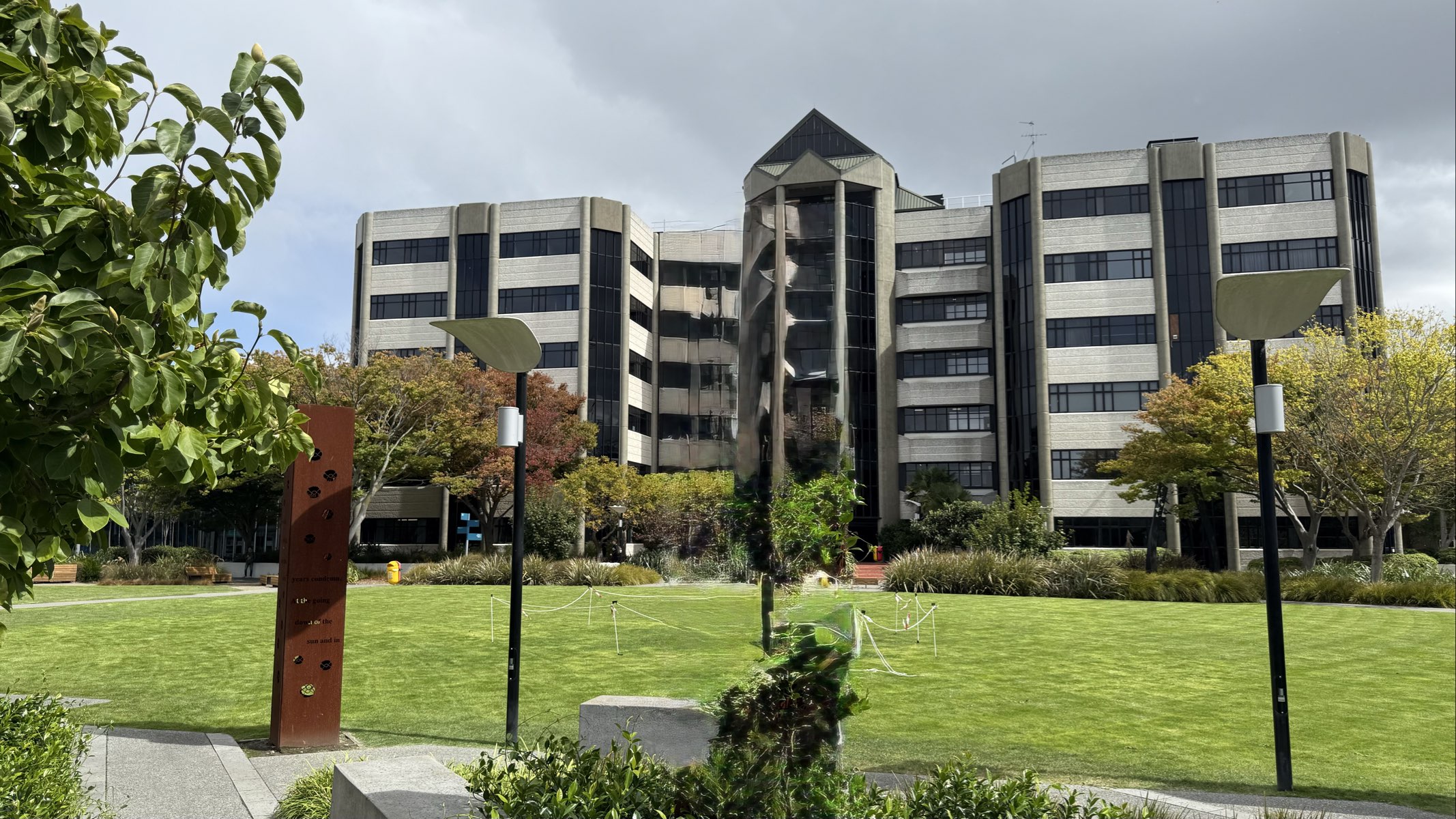
印象的な出来事
最初の1、2週間は大学周辺を観光し、自然と都市の中での散歩を楽しみました。週末は友人たちとニュージーランドの観光地へ。1か月の留学はあっという間なので、訪れる場所は慎重に選びました。私が思い出に残っている観光地を3つ紹介します。1つ目はChristchurch Gondolaです。クライストチャーチゴンドラは、市街やカンタベリー平野、サザンアルプスの360度広がる大パノラマが楽しめます。山頂の展望台からは、眼下に広がる壮大な景色を全身で感じることができ、クライストチャーチの雄大さを実感できました。2つ目はThe Tanneryです。もともと歴史あるなめし革工場(Tannery)だった建物を再利用した、趣のあるショッピングモールです。ヨーロッパのような美しい雰囲気を持つこの場所には、厳選されたブティックやカフェ、レストランが集まり、日本食のお寿司屋さんも楽しめます。3つ目はWillow bankです。ここはクライストチャーチにある動物園で、ニュージーランド固有の動物を保護・展示しており、国鳥であるキーウィ(Kiwi)を見ることもできます。紹介した場所以外にも、ニュージーランドには魅力的な観光スポットがたくさんあり、1か月では物足りないと感じました。友人と一緒に旅行計画や海外サイトで予約をしたこと、旅先での思い出は、とても良い人生経験になりました。
 今後の目標
今後の目標
今回のAUGPを終え、さらなる語学力向上を目指したいと強く感じました。現地では最低限の会話はできたものの、言いたいことを全て伝えきれず、もっと自然に外国人と話せるようになりたいと思うようになりました。また、ニュージーランドでの経験から、日本とは異なる文化を持つ他国にも興味が湧きました。この留学でできた海外の友人とは今でも週に1度連絡を取り合う仲にまでなりました。こういった経験をこれからの自己成長に繋げていきたいと思います。初めての留学は、不安がつきものです。特に語学力への心配は大きいでしょう。私自身もそうでした。しかし、実際に経験してみると、不思議と通じ合えます。留学はきっとあなたの人生にとって、かけがえのない経験になるはずです。私自身、もう一度行きたいと思うほど、素晴らしい時間でした。留学は、新しいことに挑戦し、人生経験を積める絶好の機会です。この機会を逃さず、何事にも積極的にチャレンジしてみてください。きっと、想像以上の発見と成長があるはずです。
最初の1、2週間は大学周辺を観光し、自然と都市の中での散歩を楽しみました。週末は友人たちとニュージーランドの観光地へ。1か月の留学はあっという間なので、訪れる場所は慎重に選びました。私が思い出に残っている観光地を3つ紹介します。1つ目はChristchurch Gondolaです。クライストチャーチゴンドラは、市街やカンタベリー平野、サザンアルプスの360度広がる大パノラマが楽しめます。山頂の展望台からは、眼下に広がる壮大な景色を全身で感じることができ、クライストチャーチの雄大さを実感できました。2つ目はThe Tanneryです。もともと歴史あるなめし革工場(Tannery)だった建物を再利用した、趣のあるショッピングモールです。ヨーロッパのような美しい雰囲気を持つこの場所には、厳選されたブティックやカフェ、レストランが集まり、日本食のお寿司屋さんも楽しめます。3つ目はWillow bankです。ここはクライストチャーチにある動物園で、ニュージーランド固有の動物を保護・展示しており、国鳥であるキーウィ(Kiwi)を見ることもできます。紹介した場所以外にも、ニュージーランドには魅力的な観光スポットがたくさんあり、1か月では物足りないと感じました。友人と一緒に旅行計画や海外サイトで予約をしたこと、旅先での思い出は、とても良い人生経験になりました。
 今後の目標
今後の目標
今回のAUGPを終え、さらなる語学力向上を目指したいと強く感じました。現地では最低限の会話はできたものの、言いたいことを全て伝えきれず、もっと自然に外国人と話せるようになりたいと思うようになりました。また、ニュージーランドでの経験から、日本とは異なる文化を持つ他国にも興味が湧きました。この留学でできた海外の友人とは今でも週に1度連絡を取り合う仲にまでなりました。こういった経験をこれからの自己成長に繋げていきたいと思います。初めての留学は、不安がつきものです。特に語学力への心配は大きいでしょう。私自身もそうでした。しかし、実際に経験してみると、不思議と通じ合えます。留学はきっとあなたの人生にとって、かけがえのない経験になるはずです。私自身、もう一度行きたいと思うほど、素晴らしい時間でした。留学は、新しいことに挑戦し、人生経験を積める絶好の機会です。この機会を逃さず、何事にも積極的にチャレンジしてみてください。きっと、想像以上の発見と成長があるはずです。
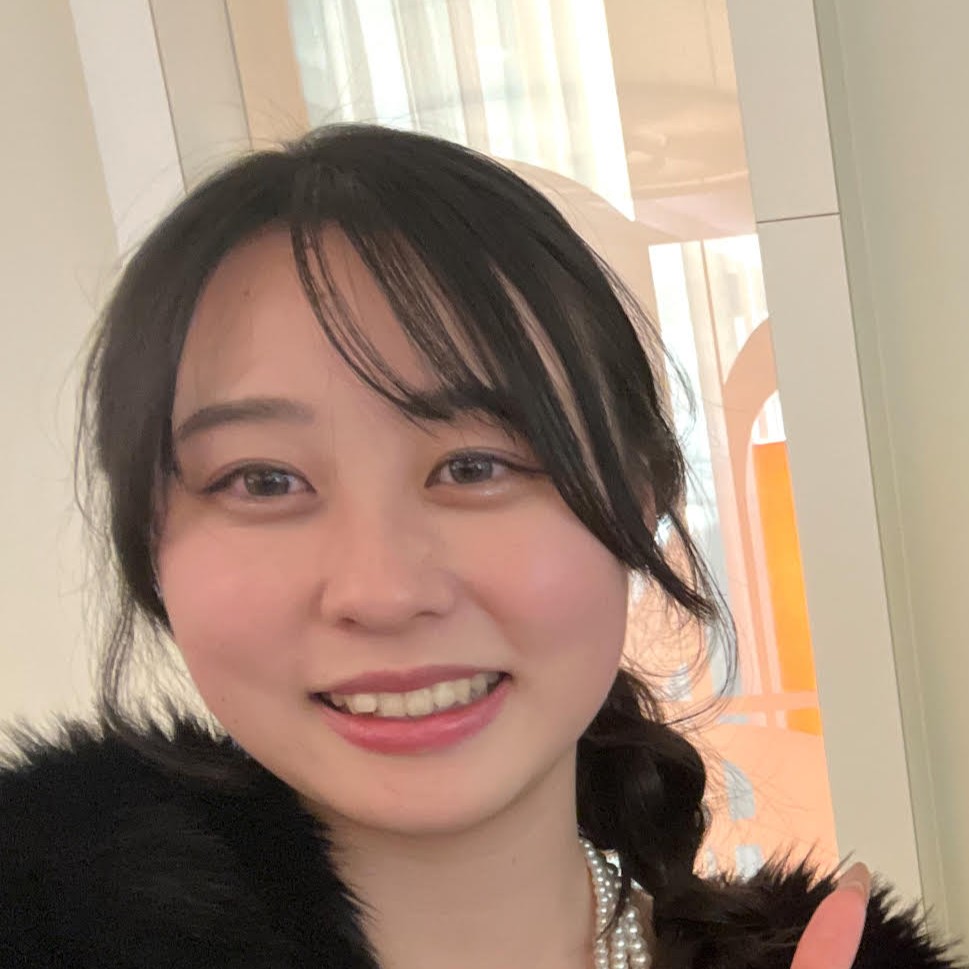
小野 智陽(ONO Chiharu)
派遣先:ドイツ
AUGPに参加した理由/留学先にドイツを選んだ理由
ドイツ語の講義内でドイツの文化紹介をしていただいたことが、ドイツに興味を持ちはじめたきっかけです。そこから自分でドイツについて調べるようになり、留学先のフライブルクでの環境活動について知りました。私はフライブルクの環境に対する日本にはない政策と市民の意識を現地で体感したいと思うようになり、参加を決意しました。
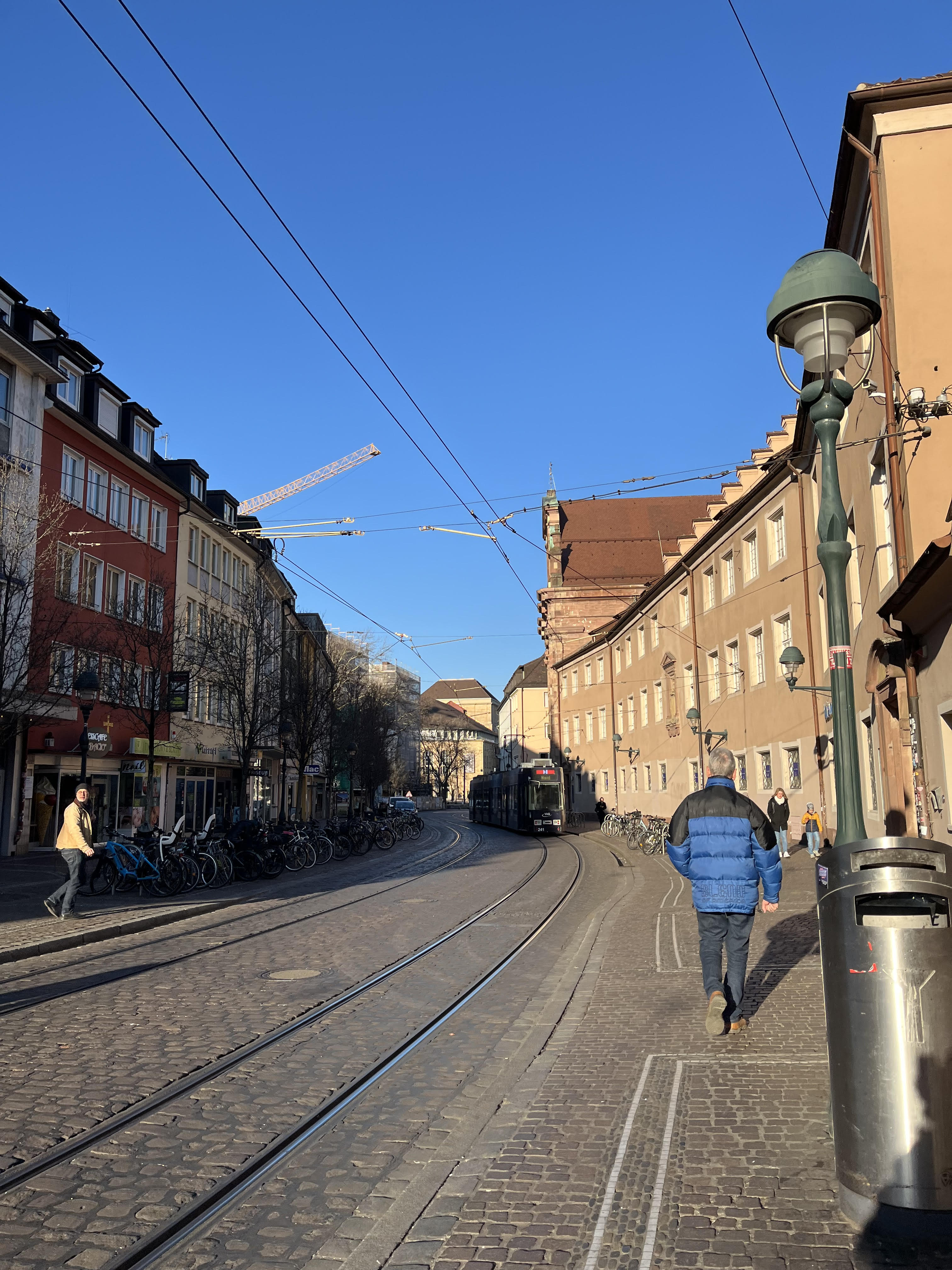 現地での授業や生活
現地での授業や生活
現地の授業は私たち留学生に多くの配慮と歓迎の気持ちが込められていたように感じました。先生や学校担当者も誠実かつ親切で、分からないことはすぐに質問でき、その場で解決のできる環境でした。また、フライブルクには古い町並みと自然が多く、住民のそれを守る意識が、現代の暮らしやすい生活と古き良き文化を共生させていると感じる良い街でした。環境保護活動の一環で中心部では車の乗り入れが禁止されており、歩行者や自転車が気の向くままに街を見て歩くことができました。代わりにトラムが運行されており、その利用が市民に定着していました。観光客や歩き食べをしている方は多いですが、ゴミ箱の数と管理の徹底とペットボトルのデポジット政策により、きれいな街が維持されていました。
ドイツ語の講義内でドイツの文化紹介をしていただいたことが、ドイツに興味を持ちはじめたきっかけです。そこから自分でドイツについて調べるようになり、留学先のフライブルクでの環境活動について知りました。私はフライブルクの環境に対する日本にはない政策と市民の意識を現地で体感したいと思うようになり、参加を決意しました。
 現地での授業や生活
現地での授業や生活
現地の授業は私たち留学生に多くの配慮と歓迎の気持ちが込められていたように感じました。先生や学校担当者も誠実かつ親切で、分からないことはすぐに質問でき、その場で解決のできる環境でした。また、フライブルクには古い町並みと自然が多く、住民のそれを守る意識が、現代の暮らしやすい生活と古き良き文化を共生させていると感じる良い街でした。環境保護活動の一環で中心部では車の乗り入れが禁止されており、歩行者や自転車が気の向くままに街を見て歩くことができました。代わりにトラムが運行されており、その利用が市民に定着していました。観光客や歩き食べをしている方は多いですが、ゴミ箱の数と管理の徹底とペットボトルのデポジット政策により、きれいな街が維持されていました。
印象的な出来事
私はフライブルク大学の留学プログラムに参加したため、授業では同じく留学生としか関わることができませんでした。それも貴重な体験ではありましたが、私は現地の方と関わって話を聞きたかったため、どのようにフライブルクの友達を作ればいいのか悩みました。買い物に行くたびに店員さんに話しかけたり、クラスの先生が現地の方だったので、たくさん話を聞いたりしました。積極的なコミュニケーションを心掛けて生活していたとき、旅行先で話しかけた方がたまたまフライブルクからの観光客だったということで意気投合し、仲良くなりました。友達作りは自分自身の努力が必要なのはもちろん、めぐり合わせも必要だと感じた出来事でした。彼らに話を聞いたり行動を共にしたりすることで、フライブルクの人々の環境意識を知ることができ、私の留学の目的を達成することができました。
今後の目標
フライブルクに行って私が得たものは、大きく分けてドイツ語のスピーキングとリスニング能力の向上、臆せず行動する度胸、そして環境活動の限界のなさを知れたことの三つです。
ドイツ語の能力はこれからも勉強を継続し向上させていきたいですし、今回の経験で得た度胸は生活にもすでに活きていると感じるので、自分の強みとして大切にしていきます。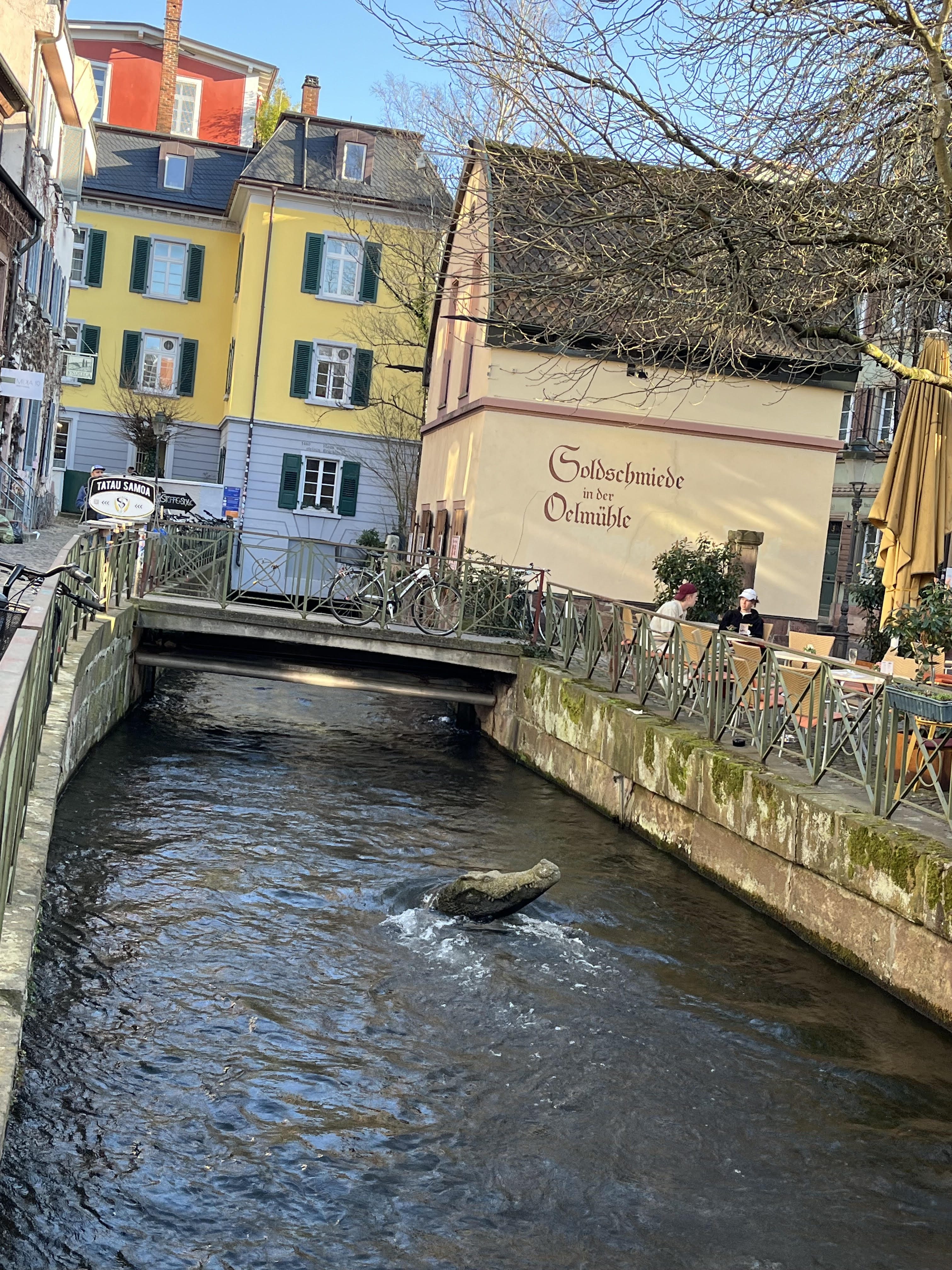
環境活動は、まずは私一人から始められるようなことをはじめ、将来的には人々の意識を変える活動に携われたらと思います。現在ボランティアサークルを運営しているため、自身のボランティア参加や、実施してきた活動の周知にさらに力を入れていきます。このフライブルク留学で得た環境活動の知識を私の住む地域にも応用させて、環境保護のボランティアを自分が企画することを大学での最終目標として頑張っていきたいと思います。
私はフライブルク大学の留学プログラムに参加したため、授業では同じく留学生としか関わることができませんでした。それも貴重な体験ではありましたが、私は現地の方と関わって話を聞きたかったため、どのようにフライブルクの友達を作ればいいのか悩みました。買い物に行くたびに店員さんに話しかけたり、クラスの先生が現地の方だったので、たくさん話を聞いたりしました。積極的なコミュニケーションを心掛けて生活していたとき、旅行先で話しかけた方がたまたまフライブルクからの観光客だったということで意気投合し、仲良くなりました。友達作りは自分自身の努力が必要なのはもちろん、めぐり合わせも必要だと感じた出来事でした。彼らに話を聞いたり行動を共にしたりすることで、フライブルクの人々の環境意識を知ることができ、私の留学の目的を達成することができました。
今後の目標
フライブルクに行って私が得たものは、大きく分けてドイツ語のスピーキングとリスニング能力の向上、臆せず行動する度胸、そして環境活動の限界のなさを知れたことの三つです。
ドイツ語の能力はこれからも勉強を継続し向上させていきたいですし、今回の経験で得た度胸は生活にもすでに活きていると感じるので、自分の強みとして大切にしていきます。

環境活動は、まずは私一人から始められるようなことをはじめ、将来的には人々の意識を変える活動に携われたらと思います。現在ボランティアサークルを運営しているため、自身のボランティア参加や、実施してきた活動の周知にさらに力を入れていきます。このフライブルク留学で得た環境活動の知識を私の住む地域にも応用させて、環境保護のボランティアを自分が企画することを大学での最終目標として頑張っていきたいと思います。
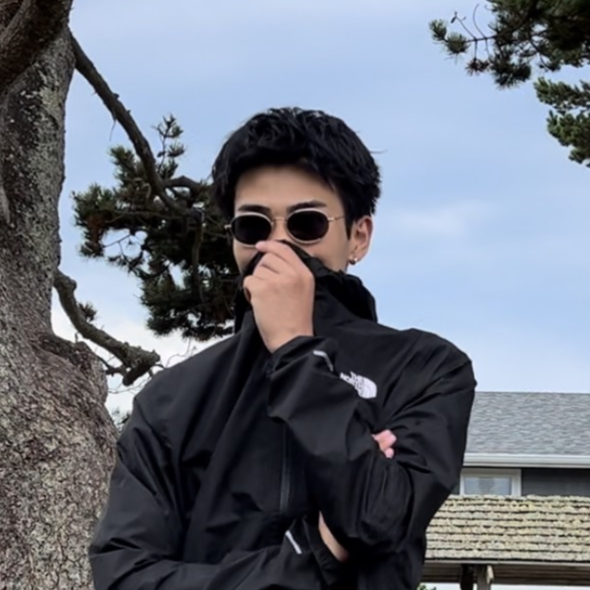
伊藤 哲平(ITO Teppei)
派遣先:アメリカ
AUGPに参加した理由/留学先にアメリカを選んだ理由
参加した理由は、大学生という個人の時間を確保でき、多くの刺激を吸収できる若い時期に異国の地を経験したかったからです。社会人になると、大学生の頃よりは確実に稼げるようになりますが、それと引き換えに1ヶ月やそれ以上の長期休暇を取ることはかなり厳しいと言われています。私は、お金は自分の努力次第でいくらでも稼げるが、時間はいくら頑張っても増えないし有限だと考えています。人生の中で最も元気で、最も時間のあるこの時期に経験すべきだと思い、参加を決断しました。そして、アメリカに決めた理由は正直、英語圏で、大国で、有名な国といえばアメリカだな、というくらいざっくりとしたものでしたが、己の直感に従って派遣先を決めるのもいいかもしれません。
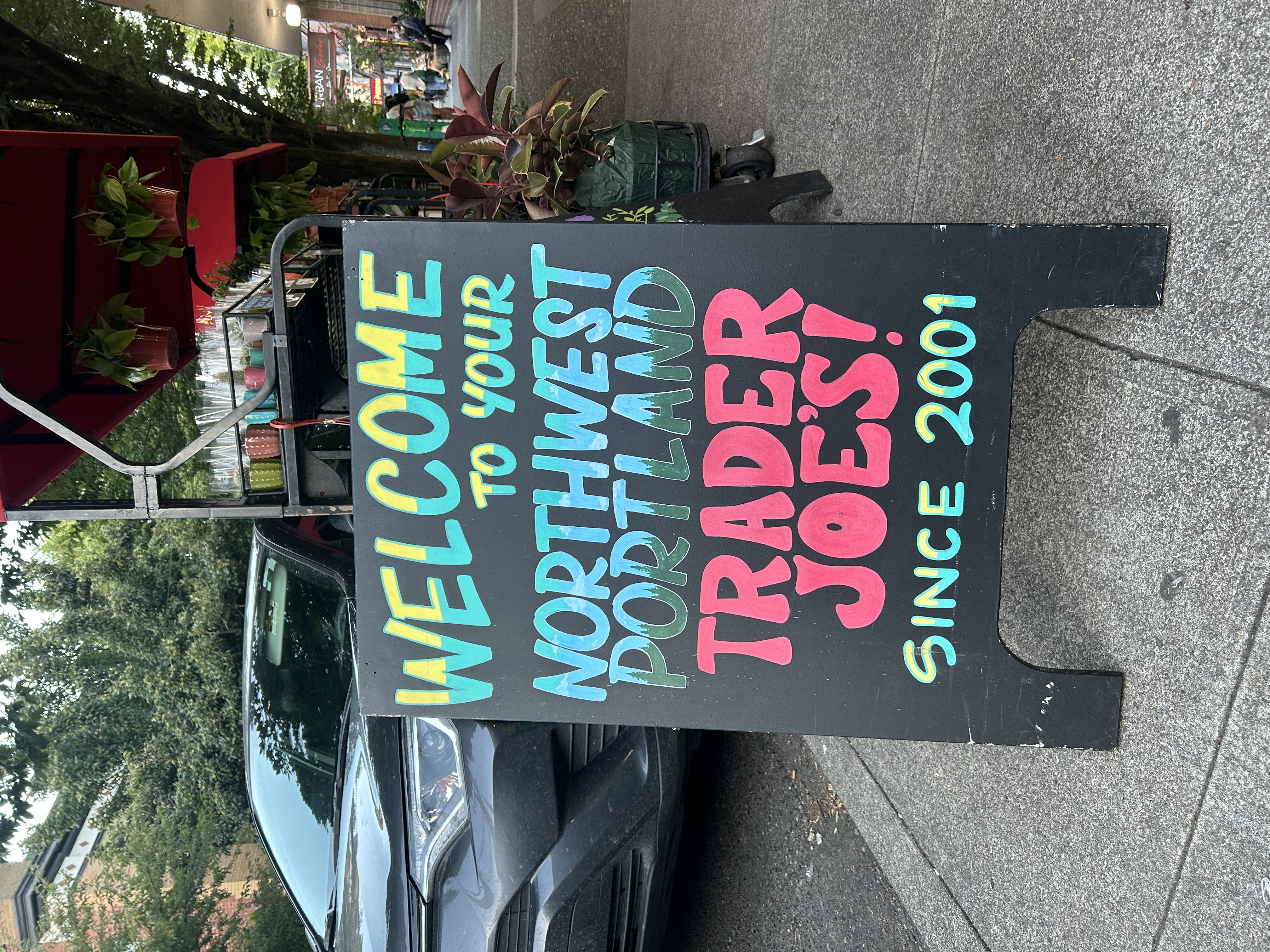 現地での授業や生活
現地での授業や生活
現地では当たり前ですが授業も生活も全て英語です。先生に質問する際も英語ですし、回答も英語なので英語を英語で理解できるいい機会になります。滞在形態は学生寮で、亜細亜大学の同プログラム生と2人1組のルームシェアでした。テレビはなく簡素な寮でした。食事は基本自炊です。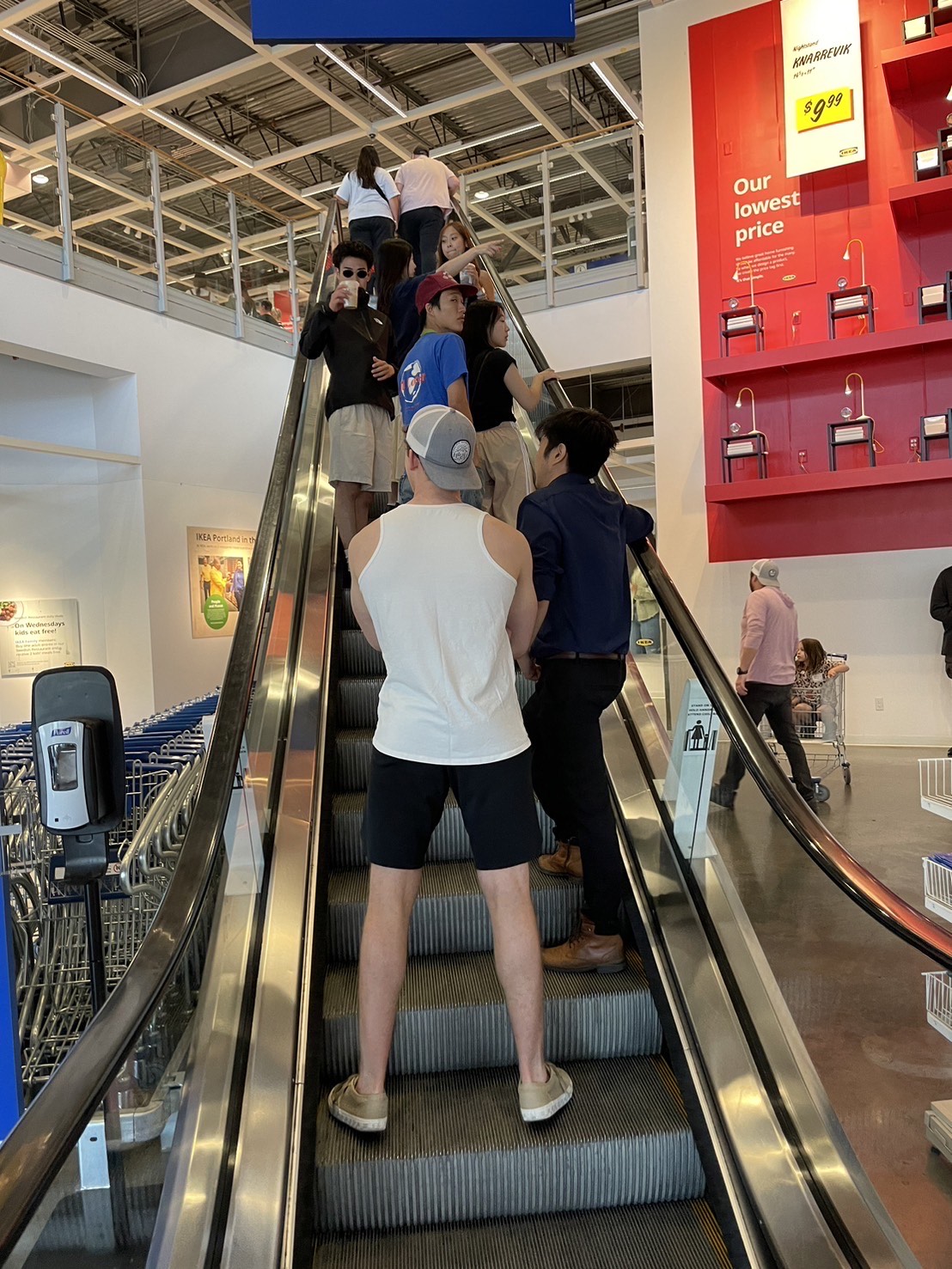 外食もありですが、アメリカは物価が高いので、やや経済的なスーパーで食材や生活用品を調達していました。授業は9:30~16:00の会話ベースの授業です。日本ではあまり聞かない英語表現やその時の感情を表すような表現も学べるので、ぜひ積極的に発言をして下さい。
外食もありですが、アメリカは物価が高いので、やや経済的なスーパーで食材や生活用品を調達していました。授業は9:30~16:00の会話ベースの授業です。日本ではあまり聞かない英語表現やその時の感情を表すような表現も学べるので、ぜひ積極的に発言をして下さい。
参加した理由は、大学生という個人の時間を確保でき、多くの刺激を吸収できる若い時期に異国の地を経験したかったからです。社会人になると、大学生の頃よりは確実に稼げるようになりますが、それと引き換えに1ヶ月やそれ以上の長期休暇を取ることはかなり厳しいと言われています。私は、お金は自分の努力次第でいくらでも稼げるが、時間はいくら頑張っても増えないし有限だと考えています。人生の中で最も元気で、最も時間のあるこの時期に経験すべきだと思い、参加を決断しました。そして、アメリカに決めた理由は正直、英語圏で、大国で、有名な国といえばアメリカだな、というくらいざっくりとしたものでしたが、己の直感に従って派遣先を決めるのもいいかもしれません。
 現地での授業や生活
現地での授業や生活
現地では当たり前ですが授業も生活も全て英語です。先生に質問する際も英語ですし、回答も英語なので英語を英語で理解できるいい機会になります。滞在形態は学生寮で、亜細亜大学の同プログラム生と2人1組のルームシェアでした。テレビはなく簡素な寮でした。食事は基本自炊です。
 外食もありですが、アメリカは物価が高いので、やや経済的なスーパーで食材や生活用品を調達していました。授業は9:30~16:00の会話ベースの授業です。日本ではあまり聞かない英語表現やその時の感情を表すような表現も学べるので、ぜひ積極的に発言をして下さい。
外食もありですが、アメリカは物価が高いので、やや経済的なスーパーで食材や生活用品を調達していました。授業は9:30~16:00の会話ベースの授業です。日本ではあまり聞かない英語表現やその時の感情を表すような表現も学べるので、ぜひ積極的に発言をして下さい。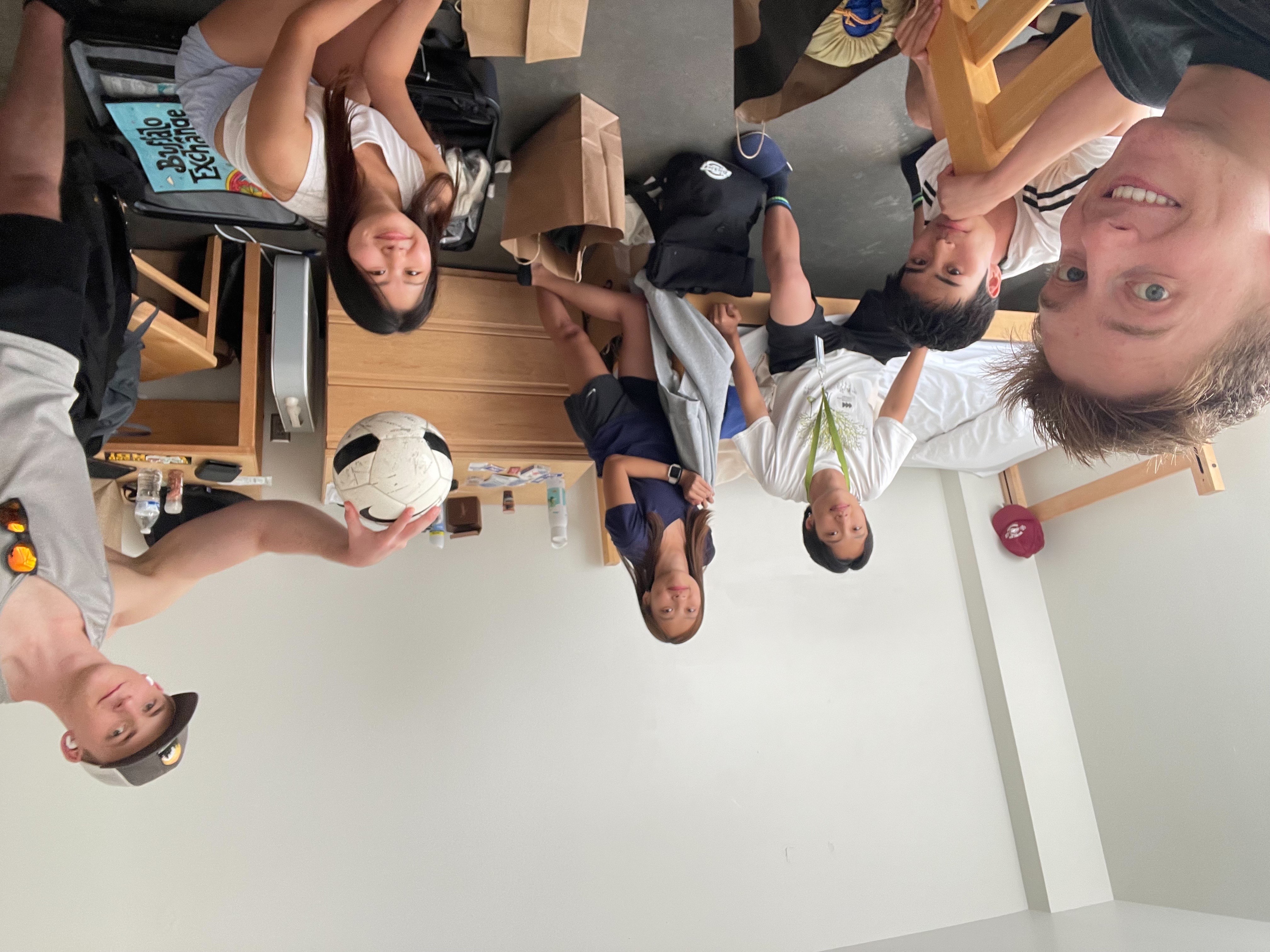
印象的な出来事
現地で生活する中で気づいたことについて書きたいと思います。様々な経験があったので書ききれないのですが、簡単に述べると、現地にいる他国の留学生やアメリカ人は、更々私たちに興味はないということに気づきました。相手から興味を持って話しかけてくれるなんて奇跡です。逆に自ら勇気をもって話しかけ、仲良くなりたいというアピールをすれば、ウェルカムでした。現地の人は我々が思うほど文法を気にしていません。間違っていてもトライして喋るか、できないから黙るかの二択だと思います。それが大きな発見でした。
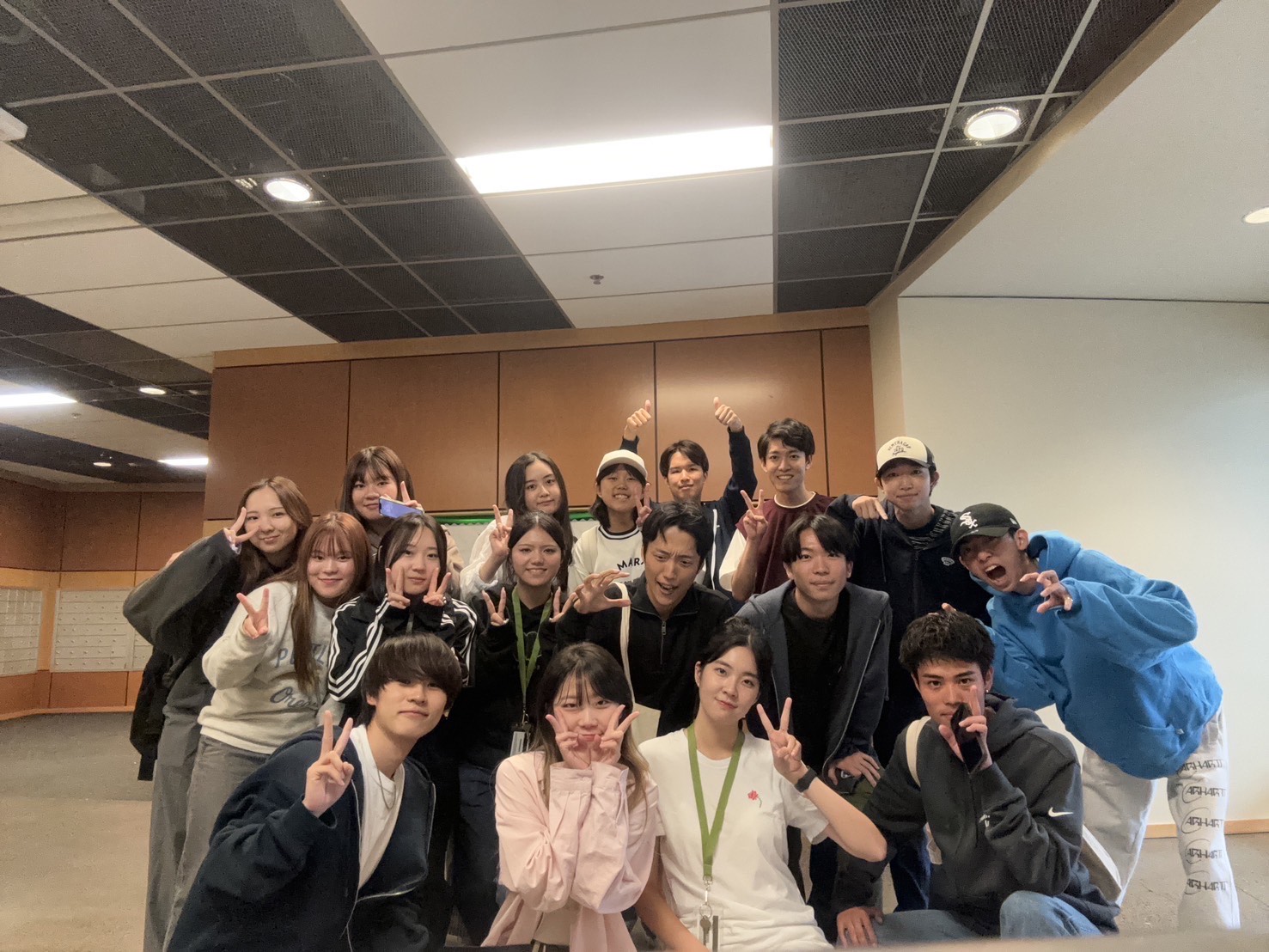 今後の目標
今後の目標
今後の将来像についてです。結論、海外移住や海外就職をしても遜色なく生活できるようになることです。せっかく英語を勉強しに渡米したわけですから、このまま継続して勉強し、流暢に会話できるようになりたいと思っています。
最後にこの留学を通しての個人的な意見を述べます。私が強く述べたいことは、悩んでいるのであれば行く以外の選択肢はないということです。海外に行きたい、英語を喋れるようになりたい、と思っているだけでは叶いません。今すぐ応募してください。実際に経験するのが一番の近道です。大学生という貴重な時間があるのに、夢が現実になるチャンスが目の前に転がっているのに、人生が大きく変わるかもしれないチャンスがそこにあるのに、それを放棄するのですか。私はそのチャンスをつかみ、人生が大きく変わりました。考え方も知識も格段に増えました。かけがえのない友達もできました。アメリカで出会った韓国人の友達とは現在でも親密な関係で、留学後に韓国まで会いに行ったり、アメリカの友達とはビデオチャットで通話し、来日した友達と遊んだりと、留学前には想像もしていなかった驚きの体験をたくさんしています。それは、あの日アメリカ留学を決断した結果であり、アメリカでは日本人のコミュニティから外れ、毎日現地の友達と過ごし、数えきれないほどの挑戦と失敗を繰り返した結果だと確信しています。未来のことは何も誰にも分らないのでとりあえず挑戦することが大切だと学びました。失敗を恐れることが失敗です。また、先ほども述べた通り、現地の人は誰もあなたに興味がありません。助けてくれません。これは私が実際に体験したので事実だと思っています。全て自分からアクションを起こすことが重要です。わからないことは恥ずかしがらずに聞く、ミスを恐れず意思表示をする、それができれば、思い描いた理想のキラキラ留学生活を送ることができると思います。また、今はまだ自分からアクションを起こすことが苦手な人も絶好のチャンスです。人として変われる分岐点は新しい刺激です。大学生のこの時間は無限ではありません。考えているうちに終わります。悩んでいる方はとりあえずやってみてください。
現地で生活する中で気づいたことについて書きたいと思います。様々な経験があったので書ききれないのですが、簡単に述べると、現地にいる他国の留学生やアメリカ人は、更々私たちに興味はないということに気づきました。相手から興味を持って話しかけてくれるなんて奇跡です。逆に自ら勇気をもって話しかけ、仲良くなりたいというアピールをすれば、ウェルカムでした。現地の人は我々が思うほど文法を気にしていません。間違っていてもトライして喋るか、できないから黙るかの二択だと思います。それが大きな発見でした。
 今後の目標
今後の目標
今後の将来像についてです。結論、海外移住や海外就職をしても遜色なく生活できるようになることです。せっかく英語を勉強しに渡米したわけですから、このまま継続して勉強し、流暢に会話できるようになりたいと思っています。
最後にこの留学を通しての個人的な意見を述べます。私が強く述べたいことは、悩んでいるのであれば行く以外の選択肢はないということです。海外に行きたい、英語を喋れるようになりたい、と思っているだけでは叶いません。今すぐ応募してください。実際に経験するのが一番の近道です。大学生という貴重な時間があるのに、夢が現実になるチャンスが目の前に転がっているのに、人生が大きく変わるかもしれないチャンスがそこにあるのに、それを放棄するのですか。私はそのチャンスをつかみ、人生が大きく変わりました。考え方も知識も格段に増えました。かけがえのない友達もできました。アメリカで出会った韓国人の友達とは現在でも親密な関係で、留学後に韓国まで会いに行ったり、アメリカの友達とはビデオチャットで通話し、来日した友達と遊んだりと、留学前には想像もしていなかった驚きの体験をたくさんしています。それは、あの日アメリカ留学を決断した結果であり、アメリカでは日本人のコミュニティから外れ、毎日現地の友達と過ごし、数えきれないほどの挑戦と失敗を繰り返した結果だと確信しています。未来のことは何も誰にも分らないのでとりあえず挑戦することが大切だと学びました。失敗を恐れることが失敗です。また、先ほども述べた通り、現地の人は誰もあなたに興味がありません。助けてくれません。これは私が実際に体験したので事実だと思っています。全て自分からアクションを起こすことが重要です。わからないことは恥ずかしがらずに聞く、ミスを恐れず意思表示をする、それができれば、思い描いた理想のキラキラ留学生活を送ることができると思います。また、今はまだ自分からアクションを起こすことが苦手な人も絶好のチャンスです。人として変われる分岐点は新しい刺激です。大学生のこの時間は無限ではありません。考えているうちに終わります。悩んでいる方はとりあえずやってみてください。
齋藤 桃(SAITO Momo)
派遣先:アメリカ
AUGPに参加した理由/留学先にアメリカを選んだ理由
留学したかった理由は山ほどありますが、漠然と海外で生活することへの憧れ、開放感や自由を求めてアメリカに行くことを決めました。また、アルバイトの接客時に海外のお客様を相手にすることもあり、臆せず英語を話せるようになりたいと思っていました。さらに、大学とは別でエンタメビジネスを学んでいた際に、日本とアメリカの平均年齢の違い(2024年現在、日本は49.9歳、アメリカは38.2歳)を知りました。この差について以前から気になっており、エンタメ大国の若い文化を実感したかったのも理由の一つです。
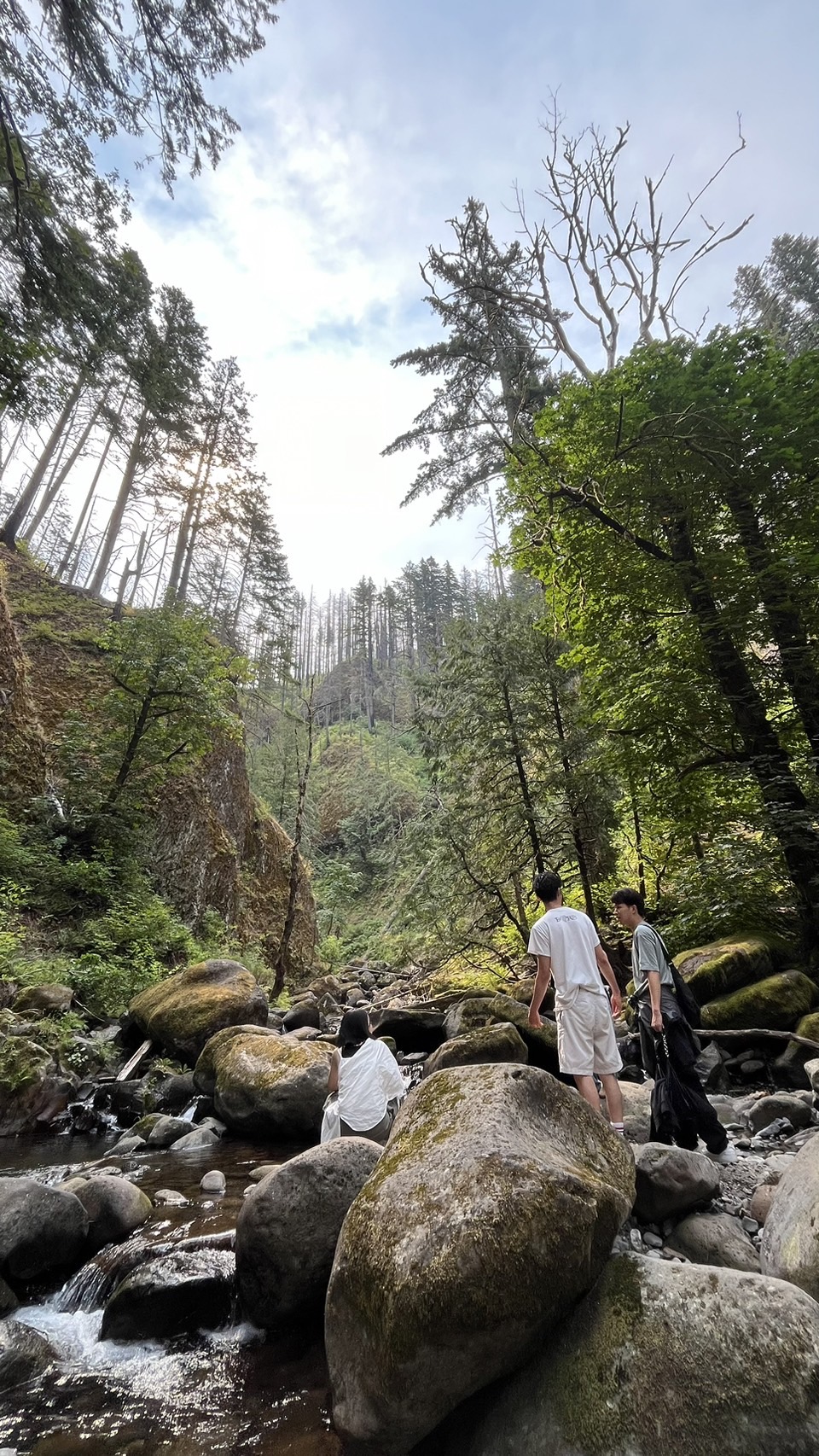 現地での授業や生活
現地での授業や生活
授業は月曜日から木曜日にかけて1日3コマ、社会問題に特化した内容でした。最初の2コマはホームレス問題、LGBTQの権利、サステナビリティ、ポートランドの文化や歴史に関する授業が行われ、学生同士で話し合い、意見を伝えながら学ぶ時間でした。その中で、事あるごとに質問をすることが求められました。日本で毎回質問をするといった習慣がなかったので、この期間の中で一番と言っていいほど難しいと感じる時間でもありました。常に考えながら話を聞き、それを理解したという意思表示をして、わからないことがない状態にするということがどれほど大切か実感しました。わからないことをわからないままにしておくことの罪悪感を思う存分感じた良い機会になったと思っています。
3コマ目は、グループごとサポートしてくれる方1人に入ってもらい、1時間の会話練習をしました。食べたご飯のこと、放課後にしたこと、ポートランドの有名なもの、日本の文化、そして自分自身についてなど、話すことにフォーカスした、より日常で必要な英語を習得できる時間でした。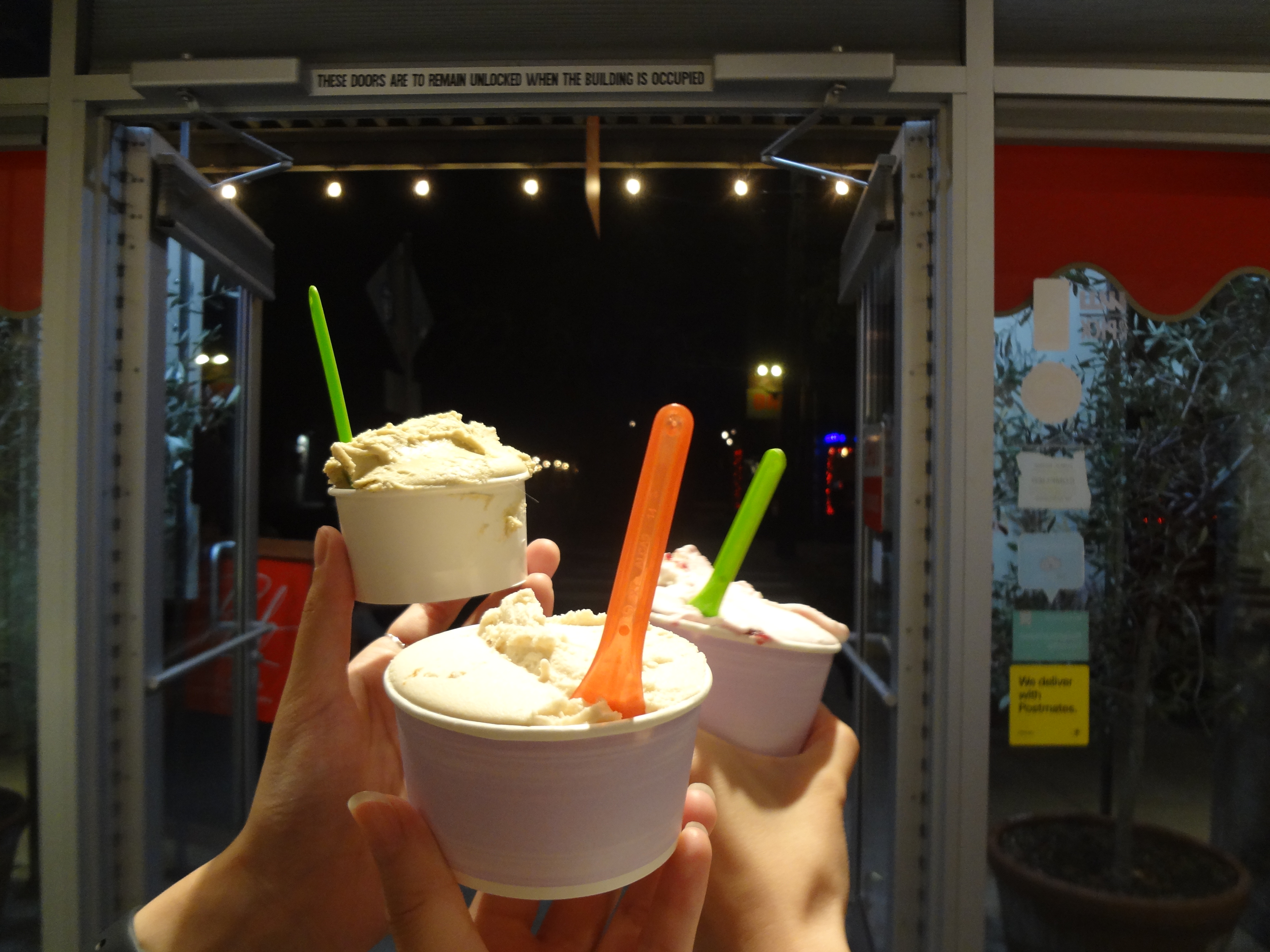
週末はオレゴンコーストや地元のマーケットに行ったり、サッカー観戦をしたり、豊かな自然や文化を堪能する機会が設けられていました。このプログラムはサステナビリティにも力を入れており、古着屋さんでの課題やリユースショップでのボランティアをすることもあり、ポートランドの先進的な取り組みを、体験を通して知ることができました。生活拠点は学校近くの学生寮で、夜には友人たちと1つの部屋に集まってカードゲームをしたりピザをシェアしたり、楽しみながらも英語でゲームをすることが新鮮で面白かったです。近くに飲食店もたくさんあり、ファストフードやアイス屋さんを巡れたのも良い思い出です。
留学したかった理由は山ほどありますが、漠然と海外で生活することへの憧れ、開放感や自由を求めてアメリカに行くことを決めました。また、アルバイトの接客時に海外のお客様を相手にすることもあり、臆せず英語を話せるようになりたいと思っていました。さらに、大学とは別でエンタメビジネスを学んでいた際に、日本とアメリカの平均年齢の違い(2024年現在、日本は49.9歳、アメリカは38.2歳)を知りました。この差について以前から気になっており、エンタメ大国の若い文化を実感したかったのも理由の一つです。
授業は月曜日から木曜日にかけて1日3コマ、社会問題に特化した内容でした。最初の2コマはホームレス問題、LGBTQの権利、サステナビリティ、ポートランドの文化や歴史に関する授業が行われ、学生同士で話し合い、意見を伝えながら学ぶ時間でした。その中で、事あるごとに質問をすることが求められました。日本で毎回質問をするといった習慣がなかったので、この期間の中で一番と言っていいほど難しいと感じる時間でもありました。常に考えながら話を聞き、それを理解したという意思表示をして、わからないことがない状態にするということがどれほど大切か実感しました。わからないことをわからないままにしておくことの罪悪感を思う存分感じた良い機会になったと思っています。
3コマ目は、グループごとサポートしてくれる方1人に入ってもらい、1時間の会話練習をしました。食べたご飯のこと、放課後にしたこと、ポートランドの有名なもの、日本の文化、そして自分自身についてなど、話すことにフォーカスした、より日常で必要な英語を習得できる時間でした。
週末はオレゴンコーストや地元のマーケットに行ったり、サッカー観戦をしたり、豊かな自然や文化を堪能する機会が設けられていました。このプログラムはサステナビリティにも力を入れており、古着屋さんでの課題やリユースショップでのボランティアをすることもあり、ポートランドの先進的な取り組みを、体験を通して知ることができました。生活拠点は学校近くの学生寮で、夜には友人たちと1つの部屋に集まってカードゲームをしたりピザをシェアしたり、楽しみながらも英語でゲームをすることが新鮮で面白かったです。近くに飲食店もたくさんあり、ファストフードやアイス屋さんを巡れたのも良い思い出です。
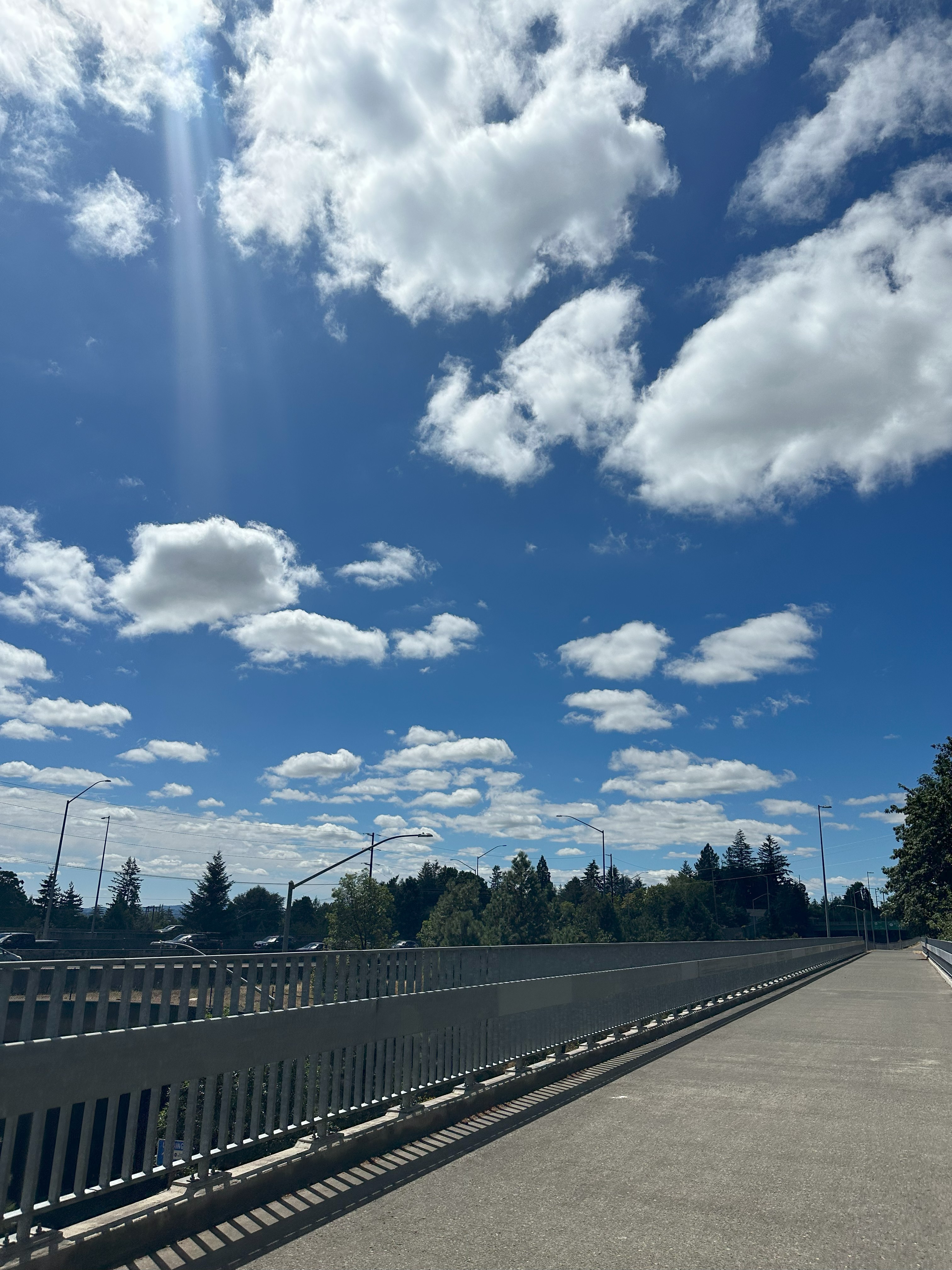
印象的な出来事
アメリカに着いてまず感じたのは、空が本当に綺麗だったことです。こんなにも濃く深く広がる青空を見たことがなかったので圧倒されました。あとで調べてみると、湿度の違いが空の色に影響を与え、水蒸気量が多いと日本の空のように白っぽく見えるのだそうです。まさしくその通りで、滞在中は日本のまとわりつく湿気から解放された1ヶ月でした。気温は高くてもカラッとしていて汗ばむことがなく、さらに午後8時を過ぎても明るくて日が長いのも嬉しく、過ごしやすかったです。
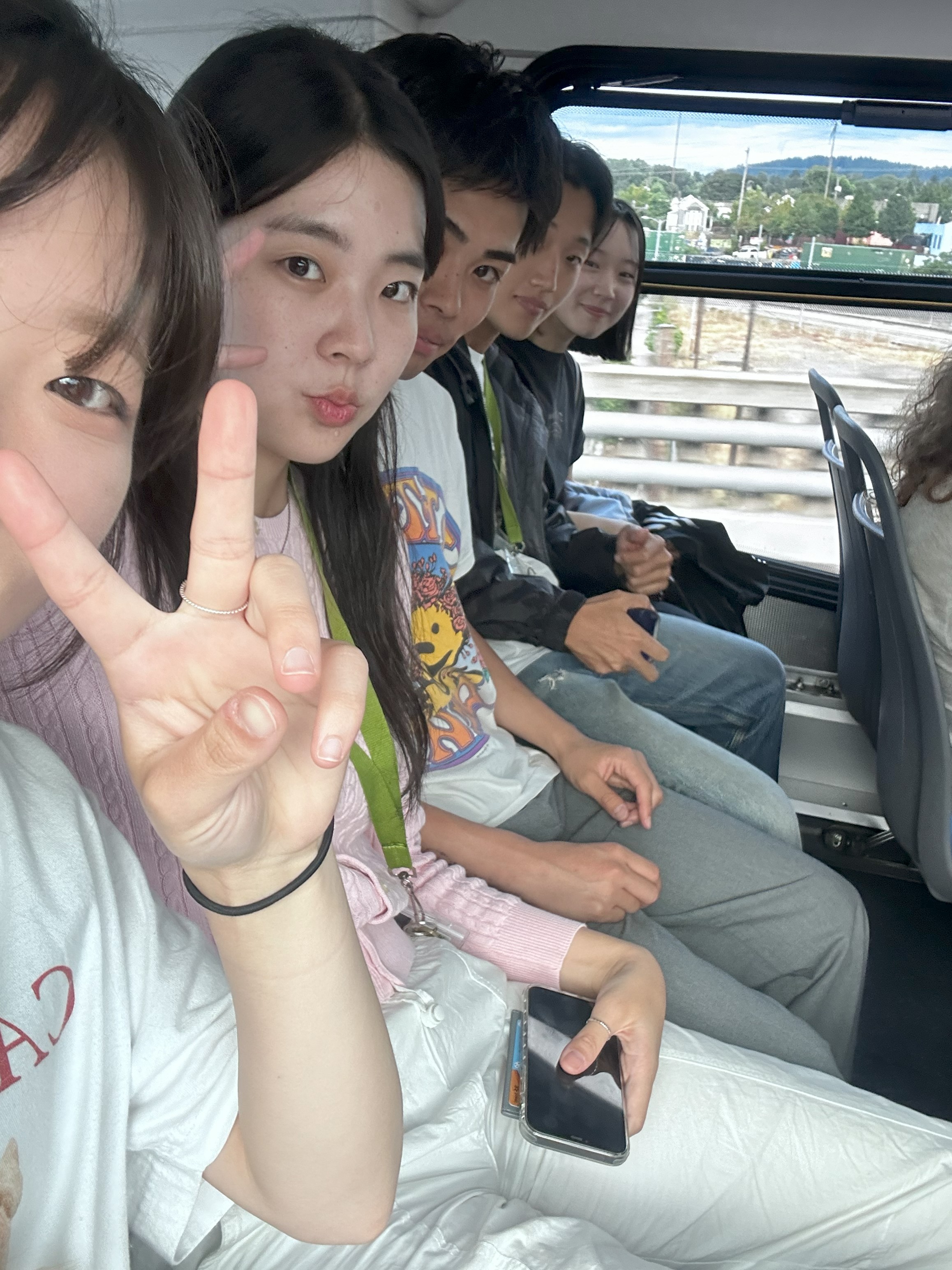 今後の目標
今後の目標
伝えたいことがあるのに上手く言い表せない、そんなもどかしい思いをどれだけ感じたか分かりませんが、この伝えたいという思いこそが大事なのだと身に染みて実感しました。上手に話せることに越したことはないですが、コミュニケーションをとる上で、文法がめちゃくちゃでも、めげずに伝える努力を学び、英語を話すハードルが下がったのは良い収穫だったと思います。逆にもっと英語を勉強しないと、という衝動にも駆られ、刺激的で充実感に溢れた日々だったと回顧しています。
また、アメリカにいて、特に嬉しかったと思ったのは、さまざまな年齢や国籍の人々と出会い、それぞれが自分らしい人生を送っていることを実感できたことです。年齢や国籍に関わらず、仕事をしながら大学に通っている人、母国で社会人を経てアメリカに移住した人、高校からアメリカに来て学んでいる人、アメリカを出てこれから異国で仕事をしようとしている人...。明るく自由に、自分のやりたいことに真っ直ぐ生きているなと感じ、今まで以上に自分の生きたいように生きようという思いが強くなりました。日本にいたらきっと、みんなと似たようなレールに乗ってそこからはみ出さないようにと、どこかで無意識に感じていた部分があったように思います。
今、大学4年生という立場で将来について考える中で、考え方やマインド面でこのアメリカでの吸収が大いに助けになったと感じています。安全性や考え方、習慣のことを知った上で、アメリカの良さ、日本の良さがそれぞれわかった期間でした。「日本人にとって住みやすいのは日本かもしれないけど、生きやすいのはどうだろう?」とそんなことを考えた1ヶ月でもありました。英語については、仕事で使えるレベルにまでスキルを上げ、いつかエンタメを通して世界と関われるようになりたいです。また、今回同じプログラムを通じて仲良くなった韓国人の友人をはじめ、この期間に出会い親しくなった他国籍の友人たちとの交流が、この先も続いていけばいいなと思っています。
アメリカに着いてまず感じたのは、空が本当に綺麗だったことです。こんなにも濃く深く広がる青空を見たことがなかったので圧倒されました。あとで調べてみると、湿度の違いが空の色に影響を与え、水蒸気量が多いと日本の空のように白っぽく見えるのだそうです。まさしくその通りで、滞在中は日本のまとわりつく湿気から解放された1ヶ月でした。気温は高くてもカラッとしていて汗ばむことがなく、さらに午後8時を過ぎても明るくて日が長いのも嬉しく、過ごしやすかったです。
 今後の目標
今後の目標
伝えたいことがあるのに上手く言い表せない、そんなもどかしい思いをどれだけ感じたか分かりませんが、この伝えたいという思いこそが大事なのだと身に染みて実感しました。上手に話せることに越したことはないですが、コミュニケーションをとる上で、文法がめちゃくちゃでも、めげずに伝える努力を学び、英語を話すハードルが下がったのは良い収穫だったと思います。逆にもっと英語を勉強しないと、という衝動にも駆られ、刺激的で充実感に溢れた日々だったと回顧しています。
また、アメリカにいて、特に嬉しかったと思ったのは、さまざまな年齢や国籍の人々と出会い、それぞれが自分らしい人生を送っていることを実感できたことです。年齢や国籍に関わらず、仕事をしながら大学に通っている人、母国で社会人を経てアメリカに移住した人、高校からアメリカに来て学んでいる人、アメリカを出てこれから異国で仕事をしようとしている人...。明るく自由に、自分のやりたいことに真っ直ぐ生きているなと感じ、今まで以上に自分の生きたいように生きようという思いが強くなりました。日本にいたらきっと、みんなと似たようなレールに乗ってそこからはみ出さないようにと、どこかで無意識に感じていた部分があったように思います。
今、大学4年生という立場で将来について考える中で、考え方やマインド面でこのアメリカでの吸収が大いに助けになったと感じています。安全性や考え方、習慣のことを知った上で、アメリカの良さ、日本の良さがそれぞれわかった期間でした。「日本人にとって住みやすいのは日本かもしれないけど、生きやすいのはどうだろう?」とそんなことを考えた1ヶ月でもありました。英語については、仕事で使えるレベルにまでスキルを上げ、いつかエンタメを通して世界と関われるようになりたいです。また、今回同じプログラムを通じて仲良くなった韓国人の友人をはじめ、この期間に出会い親しくなった他国籍の友人たちとの交流が、この先も続いていけばいいなと思っています。
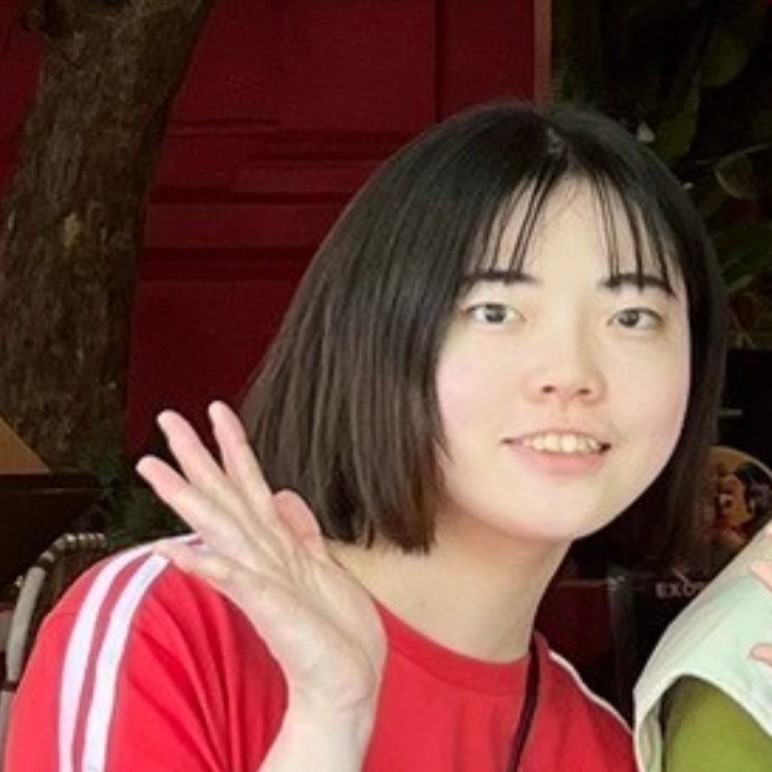
岡本 恋奈(OKAMOTO Kokona)
派遣先:ベトナム
AUGPに参加した理由/留学先にベトナムを選んだ理由
AUGPに参加した理由は、短期間で留学先の文化を学ぶことができることと自ら慣れない地域に飛び込む事で積極性を高め、成長に繋げたいと思ったからです。ベトナムを選んだ理由は、まだ行ったことがない国でかつAUGPとしてベトナムが初めてできたこともあり好奇心で選びました。また、今までベトナム語を一切勉強していませんでしたが、現地では主に英語を学ぶ内容だったのでこれを機に自分の英語力を向上させる良い機会だと思い参加しました。
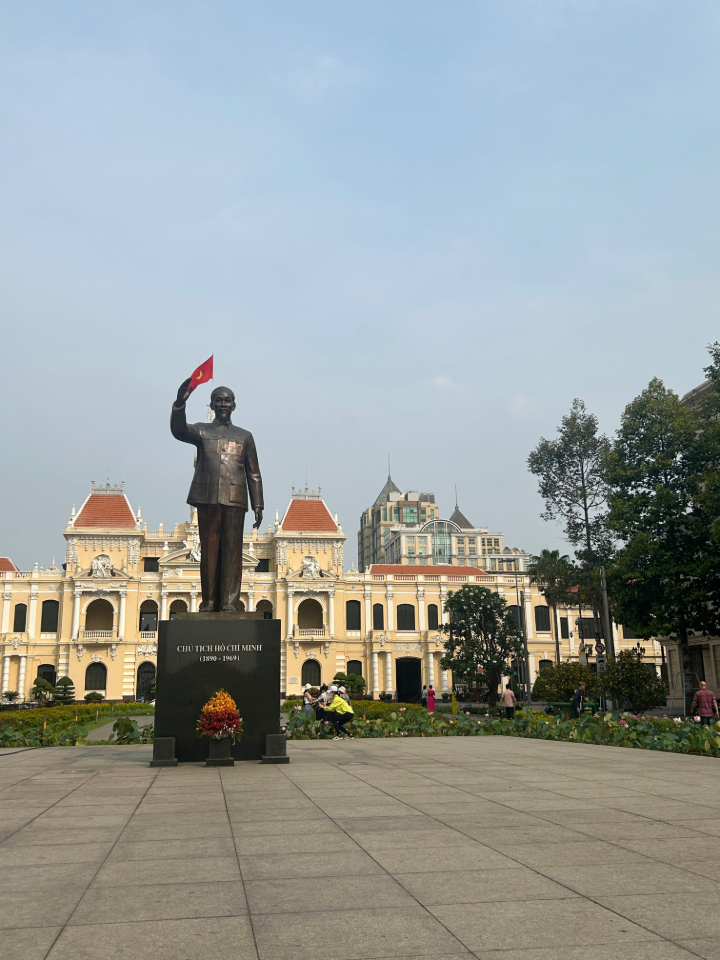 現地での授業や生活
現地での授業や生活
現地の授業は、初回に受けたテストの点数でクラス分けがされました。私のクラスは15人程ベトナム人学生がおり、私は唯一の日本人でした。7:30~9:30(前半)と9:45~11:30(後半)の2コマあり、どちらも英語のネイティブの先生が担当でした。前半は、教材のテーマに合った単語の意味を調べて使い方を確認したり発音練習を行いました。その後ペアでテーマに基づくディスカッションをしました。授業の中で普段利用するスマホのSNSや通販のアプリについて話した時に、クラスメイトと私の使うアプリが全く違っていてLINEが現地で通じなかったことが衝撃でした。ベトナムでLINEのようなアプリは「Zalo」というアプリだそうです。
後半は、長文読解をひたすら解く時間で各自休憩を取りながら一定時間を過ぎるとグループで答え合わせを行いました。また、集中力が切れそうな時はKahoot!というアプリを用いてクイズを解いていました。ディスカッションのペアや問題を解くグループが毎日変わりましたが、前半後半ともに同じクラスメイトだったので気楽に話すことができ、「分からない事があったら気軽に聞いて」と異国の地から来た私にも笑顔で接してくれてとても嬉しかったです。
現地の生活は、学校からホテルまでバスが出ており毎日遅刻せず通う事ができました。
学校には、図書館や休憩室、学食、カフェがあり、暑い中でも冷房がしっかり効いていて授業後も快適に過ごせました。学食やカフェのメニューはベトナム語表記のみなので翻訳機を活用しました。ホテルの部屋は3人で1部屋でしたが、その中に1人ずつ部屋があり、自習勉強はもちろん、や私は留学中もzoomを使用することがあったので、ルームメイトに遠慮せず過ごせたのが非常に有難かったです。キッチンやテーブル、洗濯機など、生活に必要なものはそろっていたので、3人で不自由なく過ごせました。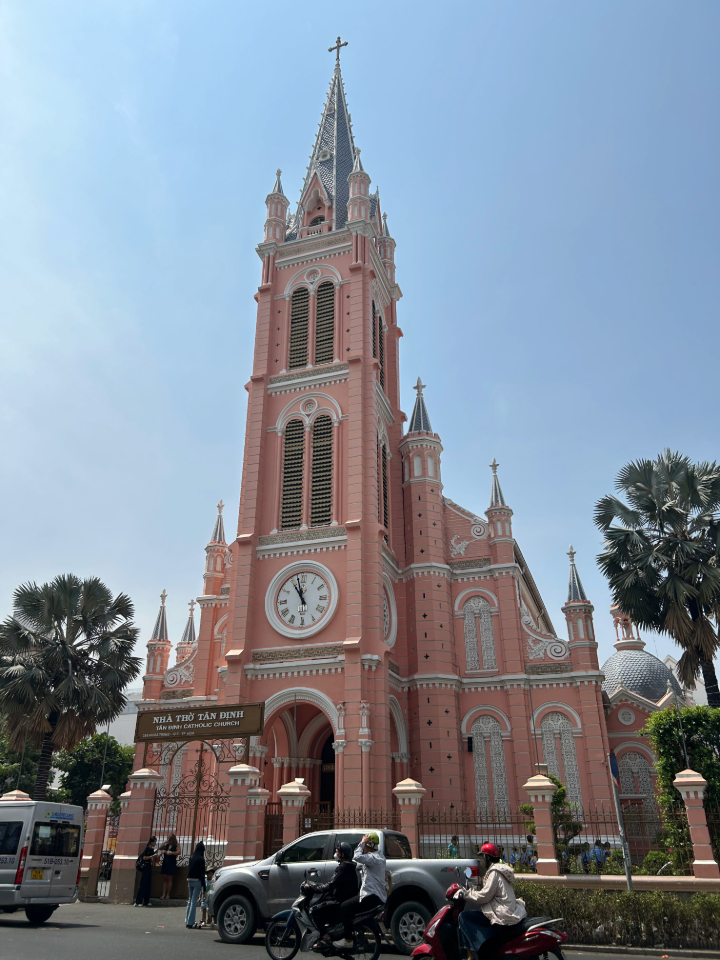
ホテルから徒歩圏内に商業施設があり、イオンや無印良品、スターバックス等身近な専門店があるため、苦手なローカルフードがあっても食には困りませんでした。しかし、いくら日系のお店が集まる商業施設でも日本語は通じません。英語も頻繁に使われていないので最初は少し戸惑いました。ベトナム語で順番呼びをしていたので、数字の読み方を知っておくと役に立ちます。日本人経営や日本料理を提供している場所では日本語は通じます。
週末はホーチミンツアーやベトナム戦争に関連するクチトンネルのツアーもあり、事前にYouTubeやインターネットでしっかり調べてから参加した方が濃い1日を過ごすことができます。ホーチミン市内は、車とバイクの交通量がとても激しかったです。スレスレの所で皆が各々走行していました。クラクションが数秒に1回以上鳴り響く異空間でした。AUGP参加者3人でホーチミンに観光に行く機会もあり、Grabというアプリでタクシーを呼ぶのが大変便利でした。ホーチミンにはお洒落なカフェが多い為、これも事前に下調べしておくと充実度が違います。
AUGPに参加した理由は、短期間で留学先の文化を学ぶことができることと自ら慣れない地域に飛び込む事で積極性を高め、成長に繋げたいと思ったからです。ベトナムを選んだ理由は、まだ行ったことがない国でかつAUGPとしてベトナムが初めてできたこともあり好奇心で選びました。また、今までベトナム語を一切勉強していませんでしたが、現地では主に英語を学ぶ内容だったのでこれを機に自分の英語力を向上させる良い機会だと思い参加しました。
 現地での授業や生活
現地での授業や生活
現地の授業は、初回に受けたテストの点数でクラス分けがされました。私のクラスは15人程ベトナム人学生がおり、私は唯一の日本人でした。7:30~9:30(前半)と9:45~11:30(後半)の2コマあり、どちらも英語のネイティブの先生が担当でした。前半は、教材のテーマに合った単語の意味を調べて使い方を確認したり発音練習を行いました。その後ペアでテーマに基づくディスカッションをしました。授業の中で普段利用するスマホのSNSや通販のアプリについて話した時に、クラスメイトと私の使うアプリが全く違っていてLINEが現地で通じなかったことが衝撃でした。ベトナムでLINEのようなアプリは「Zalo」というアプリだそうです。
後半は、長文読解をひたすら解く時間で各自休憩を取りながら一定時間を過ぎるとグループで答え合わせを行いました。また、集中力が切れそうな時はKahoot!というアプリを用いてクイズを解いていました。ディスカッションのペアや問題を解くグループが毎日変わりましたが、前半後半ともに同じクラスメイトだったので気楽に話すことができ、「分からない事があったら気軽に聞いて」と異国の地から来た私にも笑顔で接してくれてとても嬉しかったです。
現地の生活は、学校からホテルまでバスが出ており毎日遅刻せず通う事ができました。
学校には、図書館や休憩室、学食、カフェがあり、暑い中でも冷房がしっかり効いていて授業後も快適に過ごせました。学食やカフェのメニューはベトナム語表記のみなので翻訳機を活用しました。ホテルの部屋は3人で1部屋でしたが、その中に1人ずつ部屋があり、自習勉強はもちろん、や私は留学中もzoomを使用することがあったので、ルームメイトに遠慮せず過ごせたのが非常に有難かったです。キッチンやテーブル、洗濯機など、生活に必要なものはそろっていたので、3人で不自由なく過ごせました。

ホテルから徒歩圏内に商業施設があり、イオンや無印良品、スターバックス等身近な専門店があるため、苦手なローカルフードがあっても食には困りませんでした。しかし、いくら日系のお店が集まる商業施設でも日本語は通じません。英語も頻繁に使われていないので最初は少し戸惑いました。ベトナム語で順番呼びをしていたので、数字の読み方を知っておくと役に立ちます。日本人経営や日本料理を提供している場所では日本語は通じます。
週末はホーチミンツアーやベトナム戦争に関連するクチトンネルのツアーもあり、事前にYouTubeやインターネットでしっかり調べてから参加した方が濃い1日を過ごすことができます。ホーチミン市内は、車とバイクの交通量がとても激しかったです。スレスレの所で皆が各々走行していました。クラクションが数秒に1回以上鳴り響く異空間でした。AUGP参加者3人でホーチミンに観光に行く機会もあり、Grabというアプリでタクシーを呼ぶのが大変便利でした。ホーチミンにはお洒落なカフェが多い為、これも事前に下調べしておくと充実度が違います。
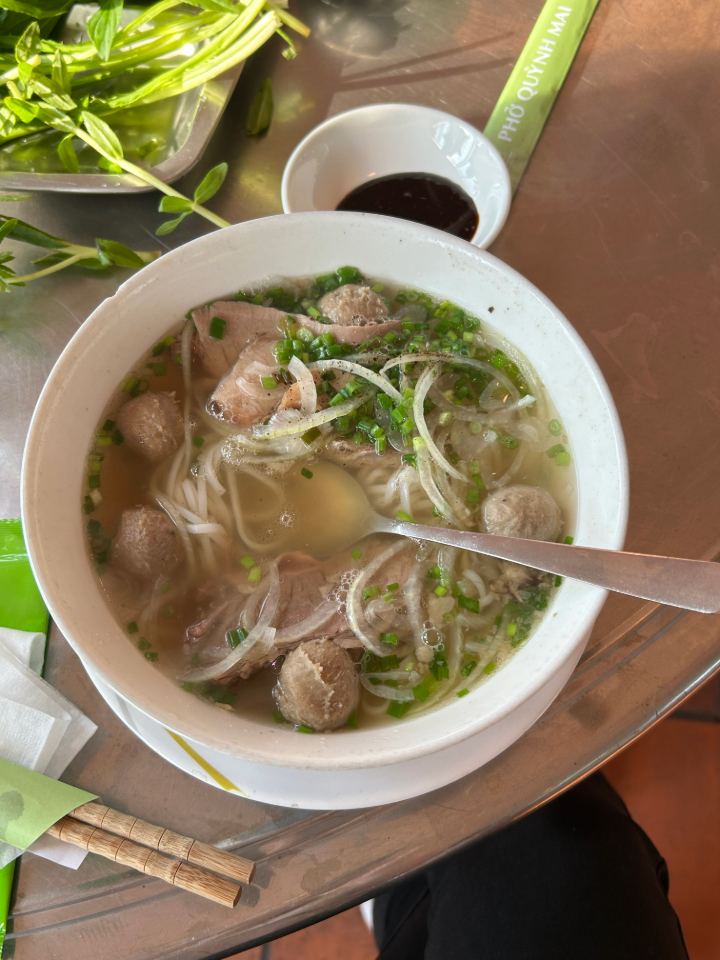
印象的な出来事
「ベトナム到着後、危なかったこと」
現地に到着後、現地案内人のタンさんと無事に合流しホッとしたのもつかの間、あやうくベトナムドンを所持せずに出発するところでした。移動の車に乗る前に、私が事前研修会で空港で換金してからホテルに向かう説明があったことを思い出しました。もし、忘れていたらよく分からない換金所に行くか、空港に戻るかの2択で計画通りに初日を過ごせなかったと思います。また、タンさんと運転手の方に迷惑がかかったかもしれなかったので、現地に着いてすぐ冷静な行動と判断が取れた事が良かったです。
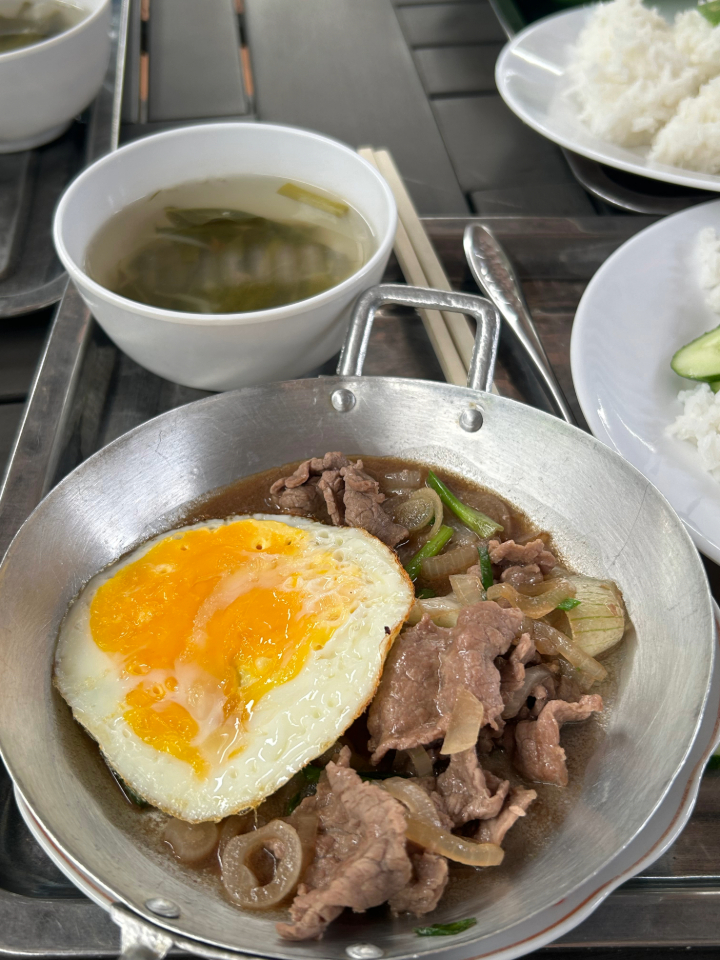
今後の目標
2週間のベトナム留学は、非常に濃く速く時間が過ぎていきました。英語に触れるだけではなく、キャンパス外ではベトナム語が主となるので、コミュニケーションの部分でも貴重な経験でした。慣れている環境に依存しすぎても成長しないという価値観を持っているので、今後社会人になる上で新しい挑戦を躊躇することなく取り組むことが出来る人であり続けたいと思っています。
「ベトナム到着後、危なかったこと」
現地に到着後、現地案内人のタンさんと無事に合流しホッとしたのもつかの間、あやうくベトナムドンを所持せずに出発するところでした。移動の車に乗る前に、私が事前研修会で空港で換金してからホテルに向かう説明があったことを思い出しました。もし、忘れていたらよく分からない換金所に行くか、空港に戻るかの2択で計画通りに初日を過ごせなかったと思います。また、タンさんと運転手の方に迷惑がかかったかもしれなかったので、現地に着いてすぐ冷静な行動と判断が取れた事が良かったです。

今後の目標
2週間のベトナム留学は、非常に濃く速く時間が過ぎていきました。英語に触れるだけではなく、キャンパス外ではベトナム語が主となるので、コミュニケーションの部分でも貴重な経験でした。慣れている環境に依存しすぎても成長しないという価値観を持っているので、今後社会人になる上で新しい挑戦を躊躇することなく取り組むことが出来る人であり続けたいと思っています。
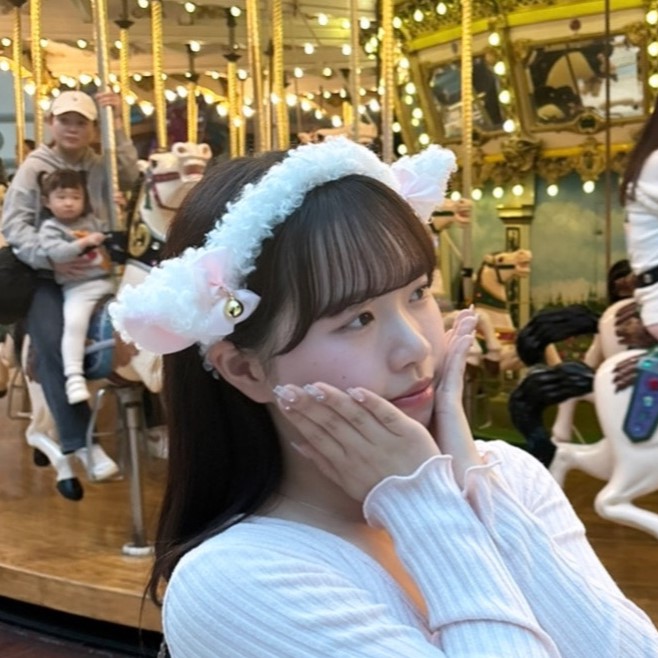
加藤 彩女(KATO Ayame)
派遣先:韓国
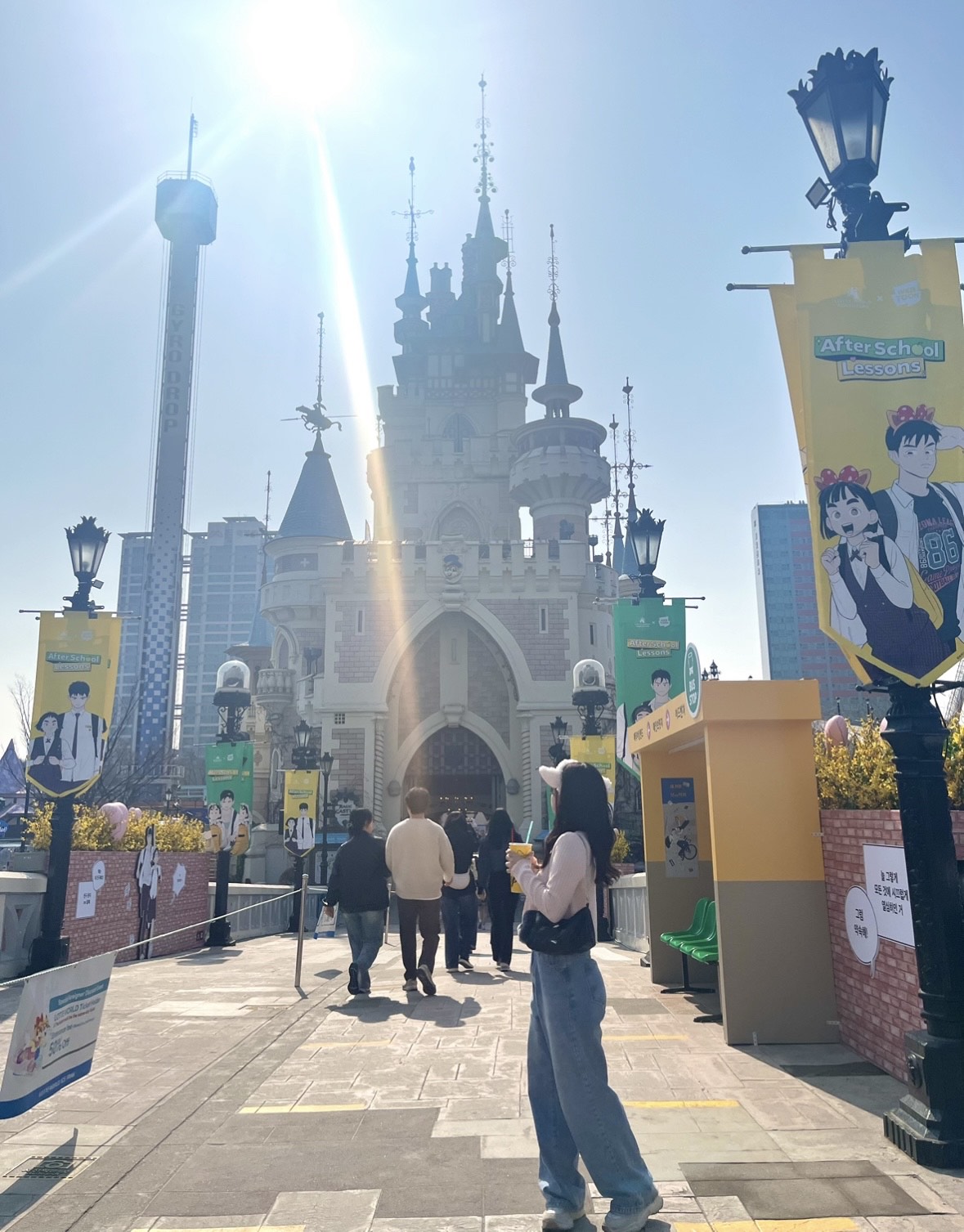 留学先に韓国を選んだ理由
留学先に韓国を選んだ理由
幼いころからK-POPに興味があり、自分の好きな人たちが何を話しているのか理解したく、小学校高学年ごろから韓国語を独学で勉強していました。何度か旅行で韓国を訪れていましたが、自分の韓国語の実力が現地の生活でどれだけ通用するのかを試すために、AUGP韓国に参加しました。
現地での授業や生活
学校の寮ではなくホテルに宿泊したため、学校まで電車やバスを乗り継いで通っていました。学校との距離が離れている分、朝早く起きなければならず少し大変でしたが、むしろ公共交通機関を使って通学していると現地の大学生に溶け込めている気分になれました。授業は初日に受けるレベルテストによって初級1、2・中級1、2・上級に分けられ、1クラス10人程度の少人数で1日4時間、週5日行われました。基本は教科書に沿って進んでいきましたが、月曜日になるとクラスのみんなが週末に何をして過ごしたのか話したり、現地学習や文化授業の後にはクラスメイトとの楽しかった思い出を先生に共有するなど、「授業」という枠にとらわれずに明るい雰囲気で進んでいきました。先ほど触れた現地学習では、ロッテワールドという遊園地や国立中央博物館のほか、ペインターズというアート・音楽・ダンスが一体化した非言語公演に行きました。ロッテワールドに行く前は、知り合ったばかりのクラスメイトと1日過ごすことに不安を感じていましたが、パレードや楽しいアトラクションを一緒に体験したことによって、むしろ仲を深めることが出来ました。国立中央博物館には40万点もの韓国文化遺産が所蔵されていました。説明書きがすべて韓国語だったため、少し難易度は高かったですが、日本の展示ゾーンもあり楽しく回ることが出来ました。ペインターズの公演は言葉をほとんど発さずにパフォーマンスで魅せる公演なので、韓国語に自信がない方でも楽しめます。また、週に1、2回行われた文化授業では、韓国ドラマ・韓国の伝統遊び・K-POP・カリグラフィーを体験しました。特に思い出に残っているのは、伝統遊びの授業です。めったに体験することのできない韓国の伝統遊びを、先生に教えてもらいながらペアで遊んだり隣のクラスと対決をして楽しい時間を過ごしました。
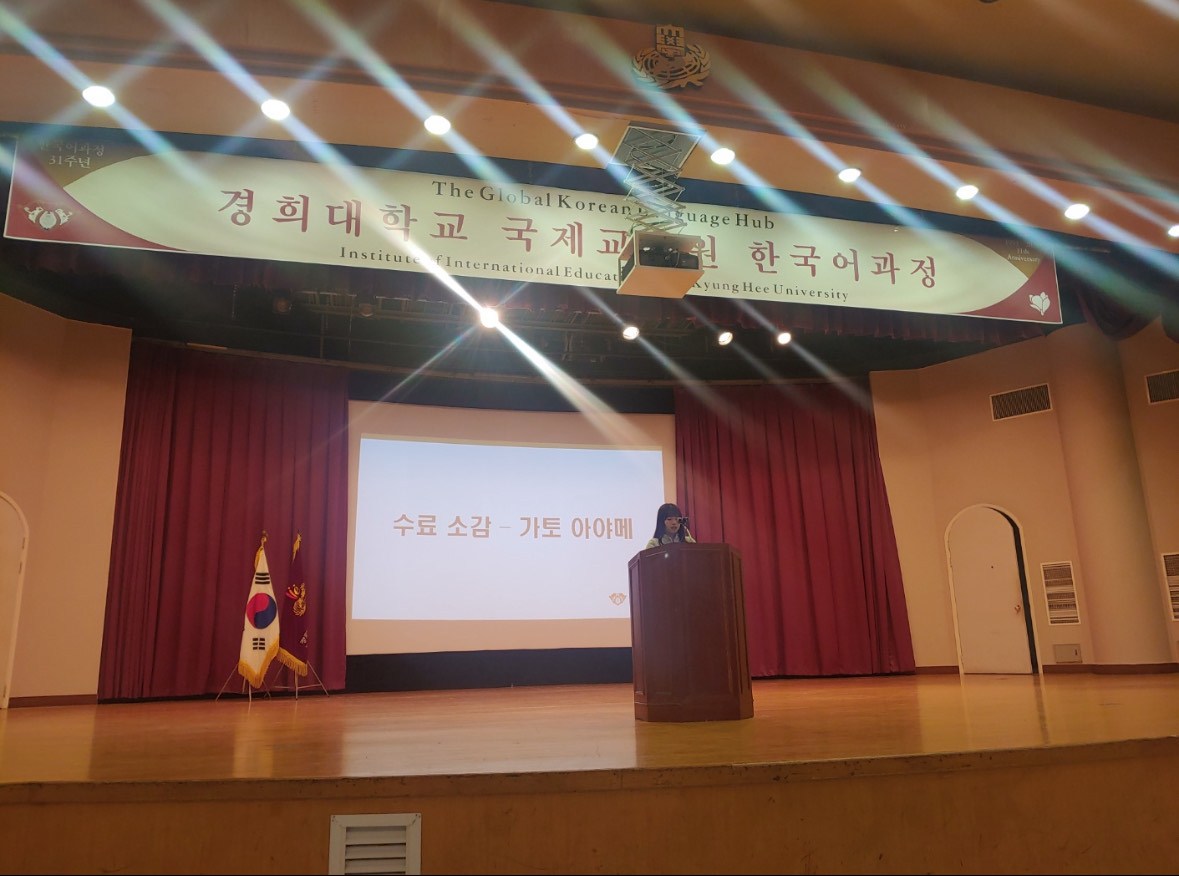
印象的な出来事
私は一年前にもAUGP韓国に参加しており、その時は中級クラスで授業を受けていました。慶熙大学では短期課程が終わると修了式が開かれ、上級クラスの留学生が修了の感想を発表します。当時中級クラスだった私は、同じ日本人の留学生が大勢の前に立ち、流暢な韓国語で修了の感想を発表している姿を見て、「私もいつかあんな風に韓国語を話せるようになりたい」という目標を持ちました。1回目の留学が終わり、帰国してから感じたことなのですが、日本にいると韓国語を使う機会はほとんどありません。留学を通して身につけた韓国語に意味を持たせるべく、通訳のアルバイトに応募したり、韓国語の動画に日本語字幕を付けるなど、自分なりに韓国語を使う努力をしました。その結果、今回は上級クラスに入ることができ、修了の感想を発表するチャンスを掴みました。私はもともと大勢の前で発表をしたり、新しい何かに挑戦することが苦手なタイプでしたが、せっかく留学に参加したからには新しいことに挑戦するべきだと思い、自ら立候補しました。留学生230人を代表し舞台に上がったのですが、声は震えてあまり顔を上げることも出来ず、1年前に見た留学生のように堂々とした発表ではなかったかもしれないですが、舞台を降りると3週間お世話になった先生方が「1年間努力してきたことが伝わる立派なスピーチだった」と褒めてくださり、今までに感じたことのない達成感を感じました。
今後の目標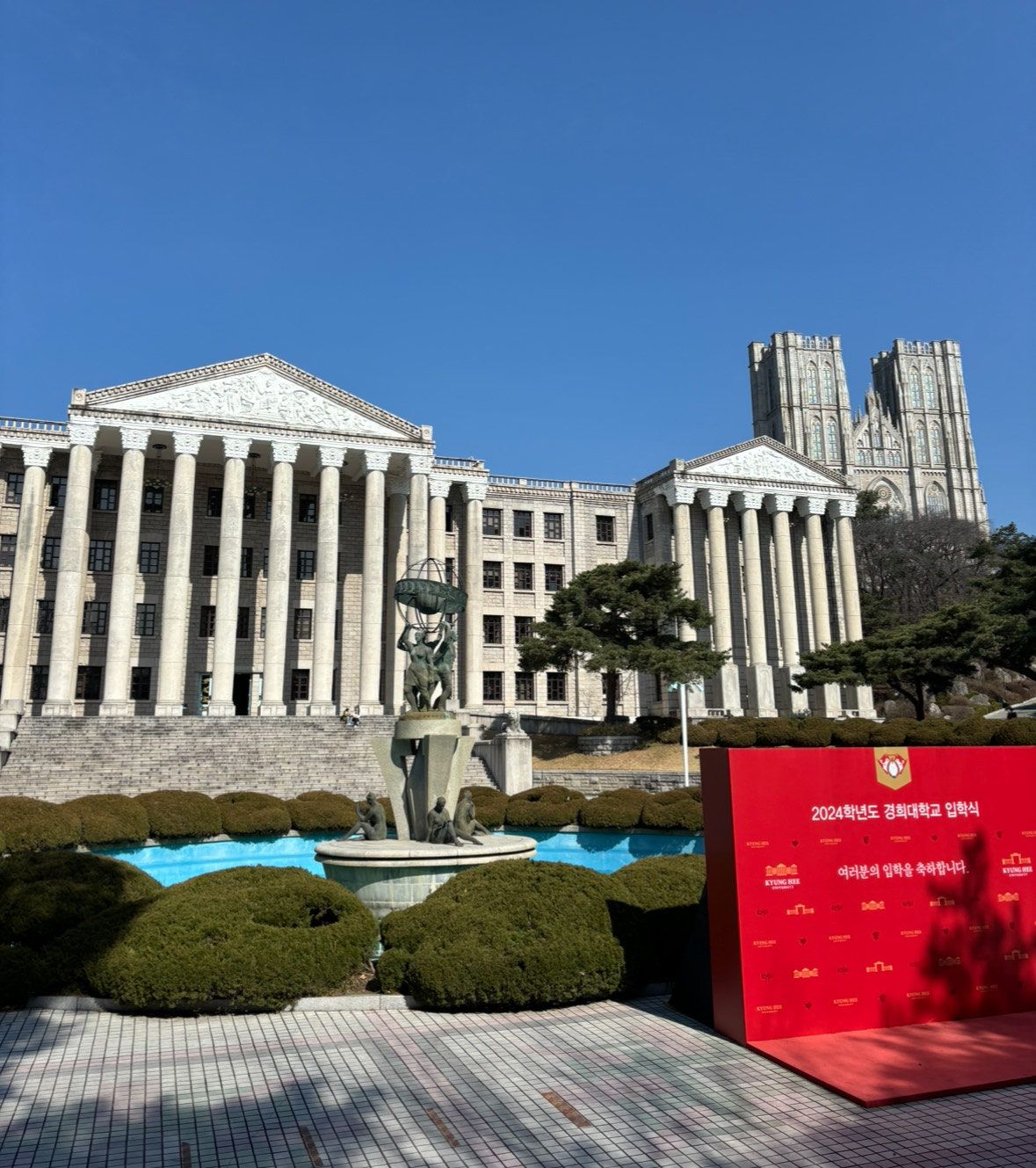
慶熙大学に通いながら言語学習のみではなく、旅行では味わうことのできない貴重な経験をしたことによって、3週間が楽しくあっという間に過ぎていきました。前回の留学では達成できなかったこと、挑戦せずに後悔したことがありましたが、今回は3週間という短い時間を有効的に使うために、何事にも積極的に自分から挑戦しました。その結果、自分の殻を破り大きな成果を残せたと思います。何よりも、韓国で生活したことによって韓国の良さ・日本の良さ両方に気づくことができ、自分の価値観が広がっていくことを実感しました。また、日常会話だけでなくビジネスで使える韓国語を身につけたいという目標も出来ました。まずは、今年中にTOPIK(韓国語能力試験)で6級を取得することを目標に今後も努力していきます。
私は一年前にもAUGP韓国に参加しており、その時は中級クラスで授業を受けていました。慶熙大学では短期課程が終わると修了式が開かれ、上級クラスの留学生が修了の感想を発表します。当時中級クラスだった私は、同じ日本人の留学生が大勢の前に立ち、流暢な韓国語で修了の感想を発表している姿を見て、「私もいつかあんな風に韓国語を話せるようになりたい」という目標を持ちました。1回目の留学が終わり、帰国してから感じたことなのですが、日本にいると韓国語を使う機会はほとんどありません。留学を通して身につけた韓国語に意味を持たせるべく、通訳のアルバイトに応募したり、韓国語の動画に日本語字幕を付けるなど、自分なりに韓国語を使う努力をしました。その結果、今回は上級クラスに入ることができ、修了の感想を発表するチャンスを掴みました。私はもともと大勢の前で発表をしたり、新しい何かに挑戦することが苦手なタイプでしたが、せっかく留学に参加したからには新しいことに挑戦するべきだと思い、自ら立候補しました。留学生230人を代表し舞台に上がったのですが、声は震えてあまり顔を上げることも出来ず、1年前に見た留学生のように堂々とした発表ではなかったかもしれないですが、舞台を降りると3週間お世話になった先生方が「1年間努力してきたことが伝わる立派なスピーチだった」と褒めてくださり、今までに感じたことのない達成感を感じました。
今後の目標

慶熙大学に通いながら言語学習のみではなく、旅行では味わうことのできない貴重な経験をしたことによって、3週間が楽しくあっという間に過ぎていきました。前回の留学では達成できなかったこと、挑戦せずに後悔したことがありましたが、今回は3週間という短い時間を有効的に使うために、何事にも積極的に自分から挑戦しました。その結果、自分の殻を破り大きな成果を残せたと思います。何よりも、韓国で生活したことによって韓国の良さ・日本の良さ両方に気づくことができ、自分の価値観が広がっていくことを実感しました。また、日常会話だけでなくビジネスで使える韓国語を身につけたいという目標も出来ました。まずは、今年中にTOPIK(韓国語能力試験)で6級を取得することを目標に今後も努力していきます。
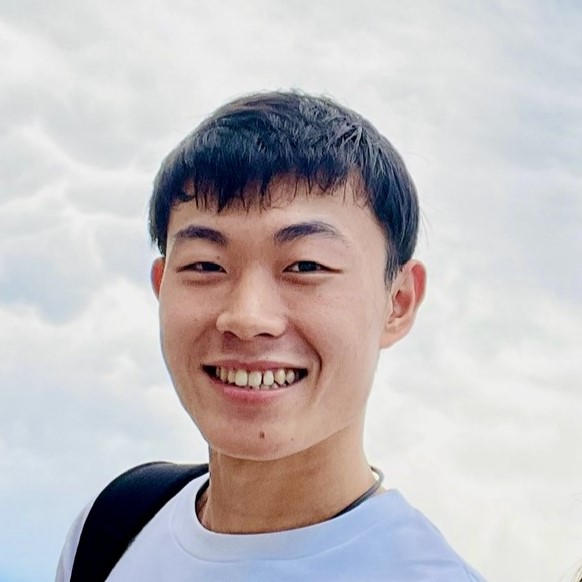
高久 幸之助(TAKAKU Konosuke)
派遣先:オーストラリア・シドニー(インターンシッププログラム)
留学先にオーストラリアを選んだ理由
私がこのプログラムを選んだ理由は、数あるプログラムの中で唯一職業体験ができる点に魅力を感じたからです。また、英語力、特にスピーキングとリスニングの向上を図るためでした。さらに、経済学部の学生として、日本と比べて最低賃金やインフレ率が高いオーストラリアでの生活や労働環境を自分の肌で感じることで、日本との違いを直接体験したかったのです。
現地での授業や生活
留学中の1週間の授業は、円形に並んだ椅子で行われ、全員の顔が見える環境でした。このスタイルは、全員が主体的に授業に取り組むための良い仕組みだと思いました。授業内容は、実生活でよく使う表現を授業で使って覚えていくというものでした。初めは周囲のレベルの高さに圧倒されることもありましたが、失敗を恐れずに積極的に参加することで、自信を持ってコミュニケーションを取れるようになりました。
オーストラリアの公共交通機関は統一されており、1枚のカードで電車からフェリーまで利用できる便利さがありました。週間の利用限度額を超えると、その週はそれ以上の料金がかからないで利用できるというシステムには驚きました。私のホストファミリーはキリスト教の信者で、毎週日曜日は教会で地元の人々と交流しました。教会での歌や共同の昼食は、異文化交流の素晴らしい機会でした。また、そこで出会った同世代の友人たちとは、平日の夜は一緒にバドミントンを楽しむなどして親交を深めました。
私がこのプログラムを選んだ理由は、数あるプログラムの中で唯一職業体験ができる点に魅力を感じたからです。また、英語力、特にスピーキングとリスニングの向上を図るためでした。さらに、経済学部の学生として、日本と比べて最低賃金やインフレ率が高いオーストラリアでの生活や労働環境を自分の肌で感じることで、日本との違いを直接体験したかったのです。
現地での授業や生活
留学中の1週間の授業は、円形に並んだ椅子で行われ、全員の顔が見える環境でした。このスタイルは、全員が主体的に授業に取り組むための良い仕組みだと思いました。授業内容は、実生活でよく使う表現を授業で使って覚えていくというものでした。初めは周囲のレベルの高さに圧倒されることもありましたが、失敗を恐れずに積極的に参加することで、自信を持ってコミュニケーションを取れるようになりました。
オーストラリアの公共交通機関は統一されており、1枚のカードで電車からフェリーまで利用できる便利さがありました。週間の利用限度額を超えると、その週はそれ以上の料金がかからないで利用できるというシステムには驚きました。私のホストファミリーはキリスト教の信者で、毎週日曜日は教会で地元の人々と交流しました。教会での歌や共同の昼食は、異文化交流の素晴らしい機会でした。また、そこで出会った同世代の友人たちとは、平日の夜は一緒にバドミントンを楽しむなどして親交を深めました。
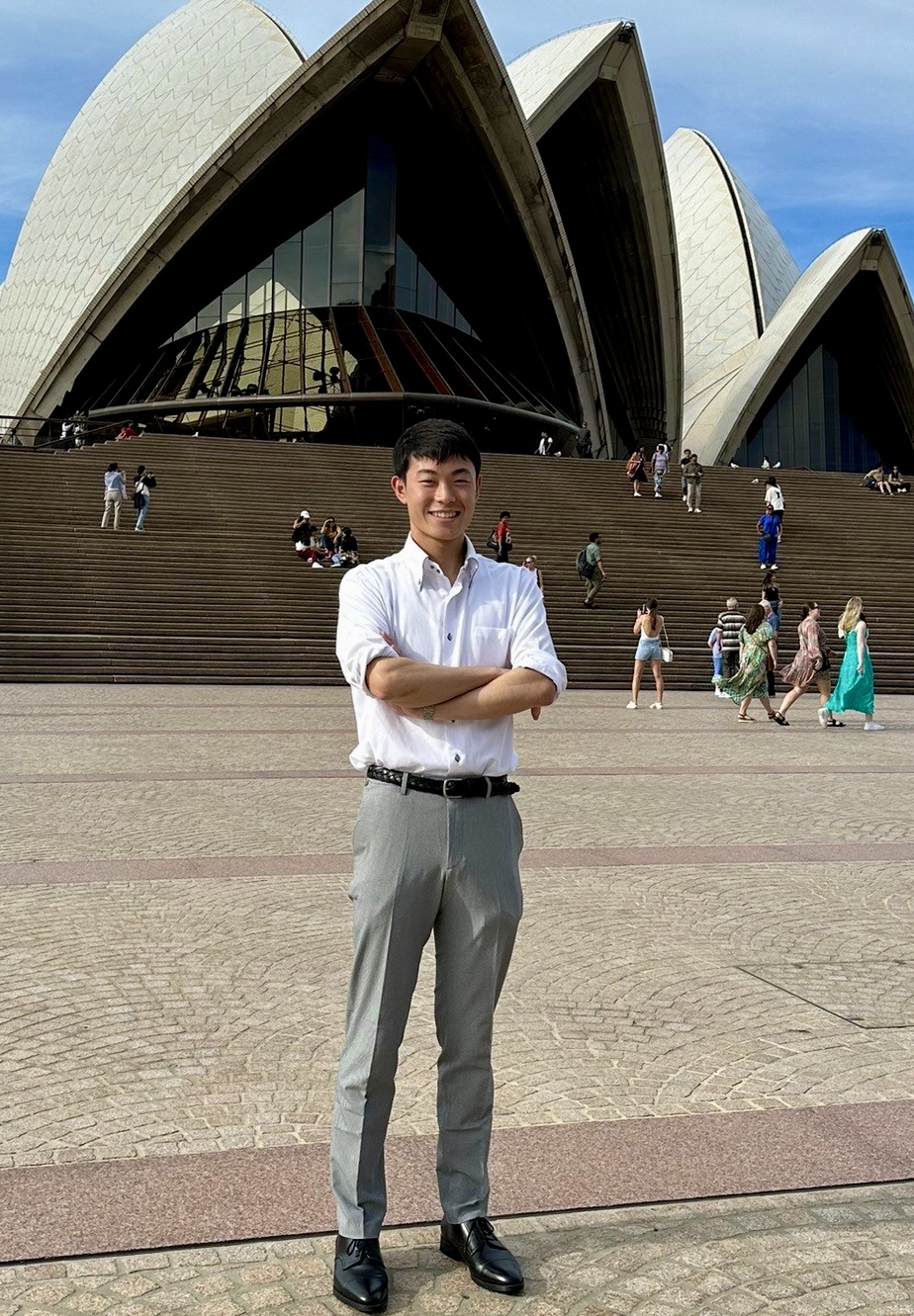
印象的な出来事
留学期間中、特に印象深かったのは職業体験でのエピソードです。上司の方から特に指示されていない新しいアイデアを試みたところ、大いに評価されたことがありました。私は広告の編集を任されていたのですが、その指示になかったイラストをその広告に挿入してみることにしました。その結果、「そのイラストがあることでわかりやすい」と上司の方に評価されました。この経験から、「自分が良いと思ったことは積極的に行動に移すこと」の大切さを学びました。
今後の目標
帰国後、私は自信を持って英語を話すことができるようになりました。また、オーストラリアに再び行き、そこで働くことを強く望むようになりました。現在は英語力をさらに向上させるために努力しており、国際的な職場での活躍を目指しています。この留学経験は私にとって、自己成長と将来のキャリア形成において大きなターニングポイントとなりました。今後も異文化理解と言語スキルの向上に努めながら、多様な価値観を持つ人々との交流を深めていきたいと思います。
留学期間中、特に印象深かったのは職業体験でのエピソードです。上司の方から特に指示されていない新しいアイデアを試みたところ、大いに評価されたことがありました。私は広告の編集を任されていたのですが、その指示になかったイラストをその広告に挿入してみることにしました。その結果、「そのイラストがあることでわかりやすい」と上司の方に評価されました。この経験から、「自分が良いと思ったことは積極的に行動に移すこと」の大切さを学びました。
今後の目標
帰国後、私は自信を持って英語を話すことができるようになりました。また、オーストラリアに再び行き、そこで働くことを強く望むようになりました。現在は英語力をさらに向上させるために努力しており、国際的な職場での活躍を目指しています。この留学経験は私にとって、自己成長と将来のキャリア形成において大きなターニングポイントとなりました。今後も異文化理解と言語スキルの向上に努めながら、多様な価値観を持つ人々との交流を深めていきたいと思います。
舩山 稜平(FUNAYAMA Ryohei)
派遣先:アメリカ
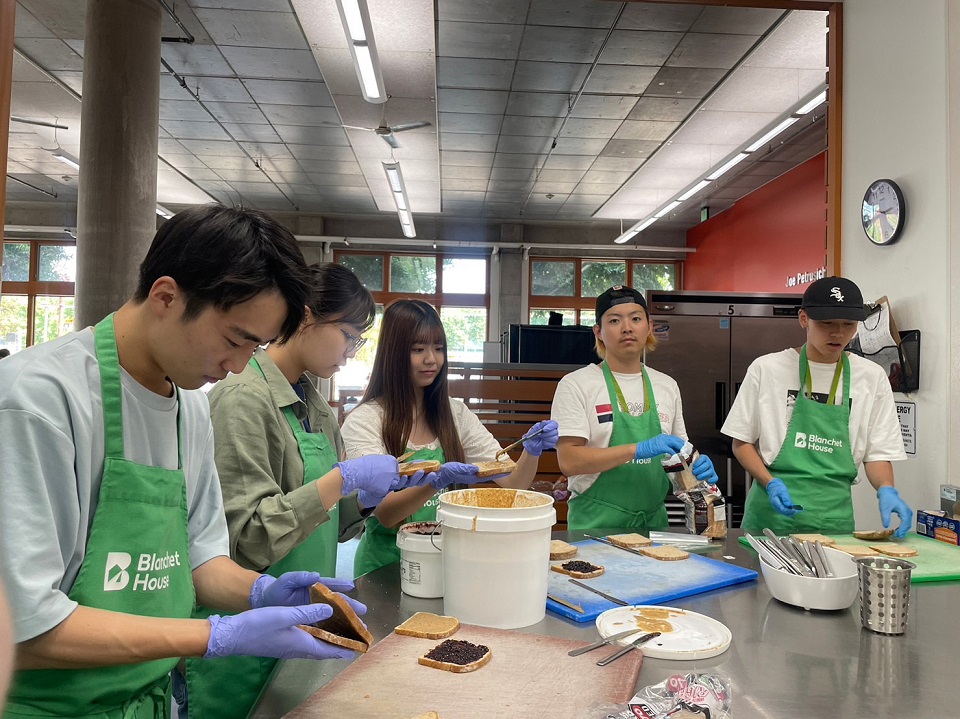
留学先にアメリカを選んだ理由
私は中学1年生の頃に、マレーシアでの1週間の海外研修に参加したことがあります。その時の体験が忘れられず、ぜひまた海外を訪れたいと思ったことから、AUGPアメリカへの参加を決めました。アメリカに留学するプログラムはAUAP(5か月間)の選択肢もありましたが、やはり異国の地での生活への不安もあったため、不安はあり初めての長期の滞在はハードルが高いと感じていました。その反面、AUGPのプログラム期間は1ヶ月間と短期間であったことも、AUGPを選択する際の決め手になりました。
現地での授業や生活
私はポートランド州立大学に留学しました。クラスはAUGPメンバーを含む日本人のみのクラスで15人ほど。授業は月曜から木曜は教室で英語の学習をしました。午前中は文法や発音などの英語の基礎を学ぶほか、ペアやグループで特定のテーマを研究したり意見交換をするディスカッションをしました。授業中は自分の意見を話すことや思考力、向き合う姿勢が求められました。午後は現地のサポート学生と一緒に、カードを使ったゲームやボードゲーム通して交流する時間が設けられていました。金曜日と土曜日はアメリカやオレゴン、ポートランドの文化に触れ、観光地にも足を運びました。
「Blanchet House」というところでは、Houselessの人に向けた食事と場所の提供を行っており、実際に渡す食事の準備を手伝いました。
「Canon Beach」では、きれいな景色を見ながら近くの飲食店でメンバーと食事をしたり、お土産を見たりと自由な時間も多くありました。現地の方もたくさんの日本人学生が集団行動している珍しさから話しかけられ、会話をすることもあり貴重な体験ができました。
こうした毎日の経験を授業で振り返り、わからない単語を教え合ったりチャレンジしたことを話し、日々の成長を感じられました。その他の時間は自由な日も多く、ダウンタウンに買い物に出かけたり、学校のジムや体育館で運動をしたりと友人や現地の学生と多くの時間を過ごしました。
私は中学1年生の頃に、マレーシアでの1週間の海外研修に参加したことがあります。その時の体験が忘れられず、ぜひまた海外を訪れたいと思ったことから、AUGPアメリカへの参加を決めました。アメリカに留学するプログラムはAUAP(5か月間)の選択肢もありましたが、やはり異国の地での生活への不安もあったため、不安はあり初めての長期の滞在はハードルが高いと感じていました。その反面、AUGPのプログラム期間は1ヶ月間と短期間であったことも、AUGPを選択する際の決め手になりました。
現地での授業や生活
私はポートランド州立大学に留学しました。クラスはAUGPメンバーを含む日本人のみのクラスで15人ほど。授業は月曜から木曜は教室で英語の学習をしました。午前中は文法や発音などの英語の基礎を学ぶほか、ペアやグループで特定のテーマを研究したり意見交換をするディスカッションをしました。授業中は自分の意見を話すことや思考力、向き合う姿勢が求められました。午後は現地のサポート学生と一緒に、カードを使ったゲームやボードゲーム通して交流する時間が設けられていました。金曜日と土曜日はアメリカやオレゴン、ポートランドの文化に触れ、観光地にも足を運びました。
「Blanchet House」というところでは、Houselessの人に向けた食事と場所の提供を行っており、実際に渡す食事の準備を手伝いました。
「Canon Beach」では、きれいな景色を見ながら近くの飲食店でメンバーと食事をしたり、お土産を見たりと自由な時間も多くありました。現地の方もたくさんの日本人学生が集団行動している珍しさから話しかけられ、会話をすることもあり貴重な体験ができました。
こうした毎日の経験を授業で振り返り、わからない単語を教え合ったりチャレンジしたことを話し、日々の成長を感じられました。その他の時間は自由な日も多く、ダウンタウンに買い物に出かけたり、学校のジムや体育館で運動をしたりと友人や現地の学生と多くの時間を過ごしました。
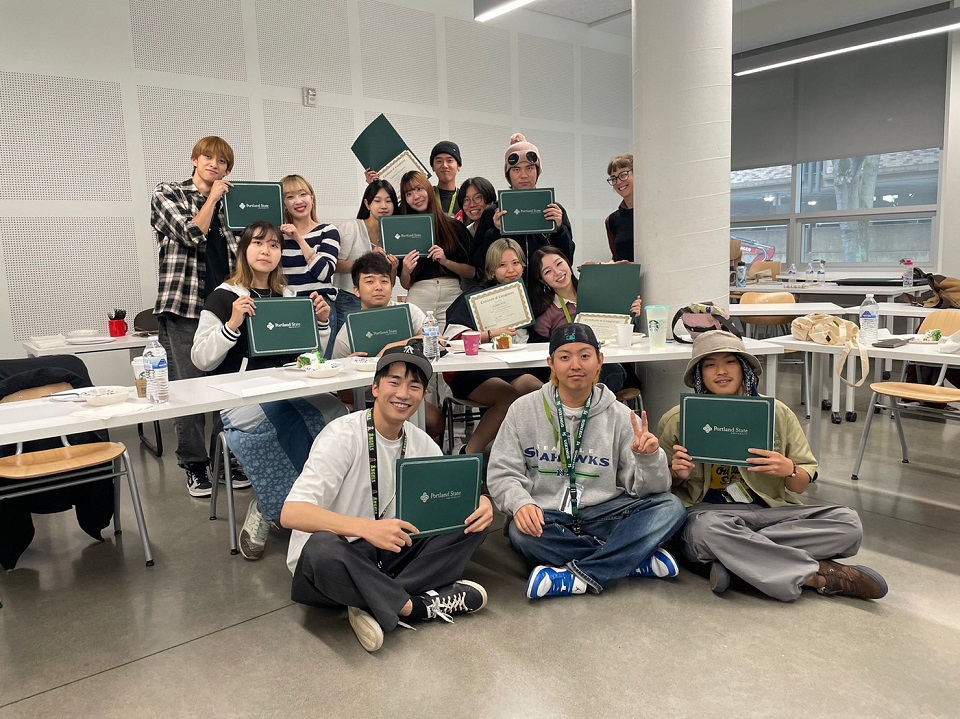
印象的な出来事
「スカベンジャーハント」というゲームをしました。町の人に自ら声をかけ、事前に指定されたお題に当てはまる人物を探していくものです。私は最初、どの人も怖そうに見えてしまいなかなか声をかけることができませんでした。まずは接客をしているお店の人に聞いてみようと勇気を出して話したところ、笑顔で受け入れてくれ不安などは杞憂だったと思わされました。その後もお店の店員さんからや一般の方など、7~8人に声をかけゲームを楽しむことができました。話しかけに行く私が相手に壁を作ってしまっていたことに気づかされ同時に、受け入れることや気さくな笑顔でコミュニケーションをとることの大切さに気付かされました。人の温かさを感じた印象的な出来事でした。
今後の目標
今回AUGPで過ごした1ヶ月間は非常に充実していて、あっという間に終わってしまいました。英語の能力に関しては、スピーキングは現地のコミュニケーションの様子を見る機会も沢山あったため、返事や表現を知ることができ、それらを実際に使うことで一番向上した力だと思います。
留学に参加するまでの私は、「機会があれば英語を使ってみたい」という気持ちでしたが、今回の留学を通して「自分から機会を作る」という意識に変わりました。
私は接客業のアルバイトをしており、アルバイト先には海外からのお客様もたくさんいらっしゃいます。そんな時にすぐに英語で話しかけ、海外のお客様から見たときに、異国の地である日本で不安に感じているお客様を安心させられるような対応ができるように、今回学んだコミュニケーション力を生かしていきたいと思います。私が今回の留学で、現地で聞いた日本語に嬉しさや安心を感じたように、海外の方にも日本で同じ体験をしてもらえたらと思っています。そのために、日ごろから積極的に英語を使い、英語やコミュニケーションの引き出しを増やすべく、これからも努力を続けていきたいと思います。
1ヶ月という短い期間でしたが、英語力のみならず意識や考え方、精神面でも成長を感じることができました。異国の地で生活することは自分自身に大きな変化をもたらしてくれます。皆さんもAUGPで新しい自分を見つけに行きませんか?
「スカベンジャーハント」というゲームをしました。町の人に自ら声をかけ、事前に指定されたお題に当てはまる人物を探していくものです。私は最初、どの人も怖そうに見えてしまいなかなか声をかけることができませんでした。まずは接客をしているお店の人に聞いてみようと勇気を出して話したところ、笑顔で受け入れてくれ不安などは杞憂だったと思わされました。その後もお店の店員さんからや一般の方など、7~8人に声をかけゲームを楽しむことができました。話しかけに行く私が相手に壁を作ってしまっていたことに気づかされ同時に、受け入れることや気さくな笑顔でコミュニケーションをとることの大切さに気付かされました。人の温かさを感じた印象的な出来事でした。
今後の目標
今回AUGPで過ごした1ヶ月間は非常に充実していて、あっという間に終わってしまいました。英語の能力に関しては、スピーキングは現地のコミュニケーションの様子を見る機会も沢山あったため、返事や表現を知ることができ、それらを実際に使うことで一番向上した力だと思います。
留学に参加するまでの私は、「機会があれば英語を使ってみたい」という気持ちでしたが、今回の留学を通して「自分から機会を作る」という意識に変わりました。
私は接客業のアルバイトをしており、アルバイト先には海外からのお客様もたくさんいらっしゃいます。そんな時にすぐに英語で話しかけ、海外のお客様から見たときに、異国の地である日本で不安に感じているお客様を安心させられるような対応ができるように、今回学んだコミュニケーション力を生かしていきたいと思います。私が今回の留学で、現地で聞いた日本語に嬉しさや安心を感じたように、海外の方にも日本で同じ体験をしてもらえたらと思っています。そのために、日ごろから積極的に英語を使い、英語やコミュニケーションの引き出しを増やすべく、これからも努力を続けていきたいと思います。
1ヶ月という短い期間でしたが、英語力のみならず意識や考え方、精神面でも成長を感じることができました。異国の地で生活することは自分自身に大きな変化をもたらしてくれます。皆さんもAUGPで新しい自分を見つけに行きませんか?
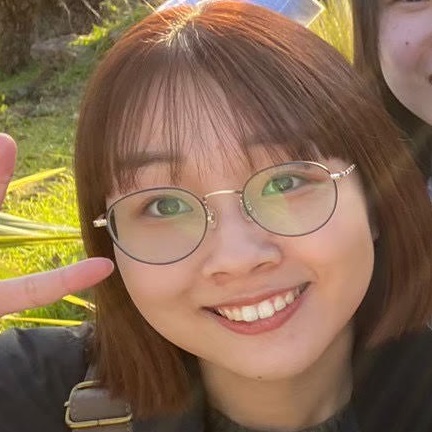
吉井 美乃莉(YOSHII Minori)
派遣先:ニュージーランド
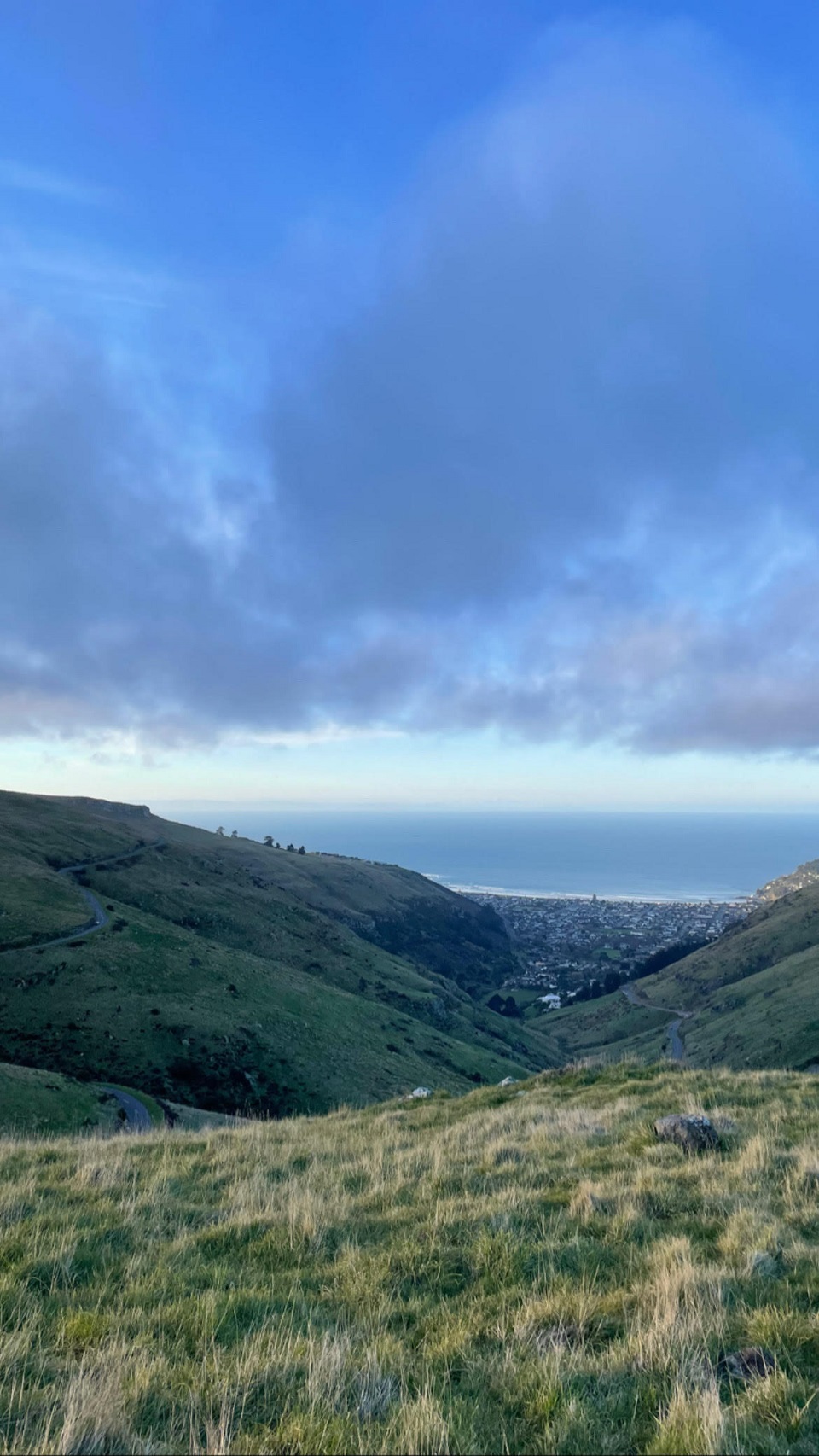
私がAUGPに参加した理由は、英語力の向上はもちろん、日本とは違う文化を体験してみたかったからです。また、私が参加した時期の英語圏の派遣先はアメリカとニュージーランドの2つでしたが、ニュージーランドは自然が多く落ち着いた印象を持っていたため、自分に合っているのではないかと思いニュージーランドを選びました。また、滞在形態がホームステイだったので、現地の人と生活し、学校以外でも英語でコミュニケーションを取ることができる点も魅力に感じました。
学校初日はオリエンテーションとクラス分けテストがあり、そのテストの結果によって自分のレベルに合ったクラスに分けられます。私のクラスの人数は大体15人程で、国籍も年代も様々でした。授業は月曜日から木曜日の週4日あり、午前の授業は教科書に沿って学習し、午後の授業はあるテーマについて動画の視聴やロールプレイなど、実践を通して英語を学ぶことが多かったです。ペアワークやグループワークが多かったため、自分の意見を伝え相手の意見を聞く練習を通してスピーキングとリスニング力が養われたと思います。授業が無い日でも、申し込めばボランティアや観光など、様々なアクティビティに参加することもできました。
学校生活の中で一番記憶に残っていることは、国際交流パーティーです。ニュージーランドをはじめヨーロッパやアジアの文化について知ることができる行事で、様々な国の食べ物を食べたり、伝統芸能などの出し物を見ました。特に、マオリ族の民族舞踊であるハカを間近で見ることができ、大迫力でとても印象に残っています。また、休日にはホストファミリーや友人とご飯に行ったり、観光地に行ったりしてリフレッシュできました。4週間という短い時間の中でも毎日英語に触れ、慣れない地で生活するという大変でありながらも充実した日々を送ることができたと思います。
私は、留学前は間違いを恐れて積極的に英語を話すことが苦手でした。しかし、現地での授業や生活を通して、語学力ももちろん大切ですが、相手に伝えようとする姿勢が何よりも大切だと学びましました。今回の留学を通して英語を話すことに自信がつき、楽しさを見出せたことが、最大の成長点だと実感しています。
そして、留学を経験して英語学習への意欲がさらに高まったと同時に、言語や文化などはまだまだ学ぶことが沢山あると実感しました。現状、日本では日常的に英語を話すことが少ないと思うので、自分から英語を話す機会を作り、語学力を磨いていこうと思います。また、将来は何らかの形で英語を使う、または外国と関わる職に就きたいと考えています。そのためにも引き続き英語学習に取り組み、何事にも積極的に行動しようと思います。
学校初日はオリエンテーションとクラス分けテストがあり、そのテストの結果によって自分のレベルに合ったクラスに分けられます。私のクラスの人数は大体15人程で、国籍も年代も様々でした。授業は月曜日から木曜日の週4日あり、午前の授業は教科書に沿って学習し、午後の授業はあるテーマについて動画の視聴やロールプレイなど、実践を通して英語を学ぶことが多かったです。ペアワークやグループワークが多かったため、自分の意見を伝え相手の意見を聞く練習を通してスピーキングとリスニング力が養われたと思います。授業が無い日でも、申し込めばボランティアや観光など、様々なアクティビティに参加することもできました。
学校生活の中で一番記憶に残っていることは、国際交流パーティーです。ニュージーランドをはじめヨーロッパやアジアの文化について知ることができる行事で、様々な国の食べ物を食べたり、伝統芸能などの出し物を見ました。特に、マオリ族の民族舞踊であるハカを間近で見ることができ、大迫力でとても印象に残っています。また、休日にはホストファミリーや友人とご飯に行ったり、観光地に行ったりしてリフレッシュできました。4週間という短い時間の中でも毎日英語に触れ、慣れない地で生活するという大変でありながらも充実した日々を送ることができたと思います。
私は、留学前は間違いを恐れて積極的に英語を話すことが苦手でした。しかし、現地での授業や生活を通して、語学力ももちろん大切ですが、相手に伝えようとする姿勢が何よりも大切だと学びましました。今回の留学を通して英語を話すことに自信がつき、楽しさを見出せたことが、最大の成長点だと実感しています。
そして、留学を経験して英語学習への意欲がさらに高まったと同時に、言語や文化などはまだまだ学ぶことが沢山あると実感しました。現状、日本では日常的に英語を話すことが少ないと思うので、自分から英語を話す機会を作り、語学力を磨いていこうと思います。また、将来は何らかの形で英語を使う、または外国と関わる職に就きたいと考えています。そのためにも引き続き英語学習に取り組み、何事にも積極的に行動しようと思います。
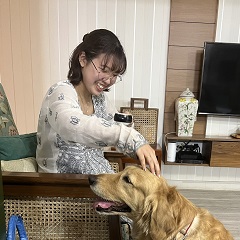
中田 あおい(NAKADA Aoi)
派遣先:インド
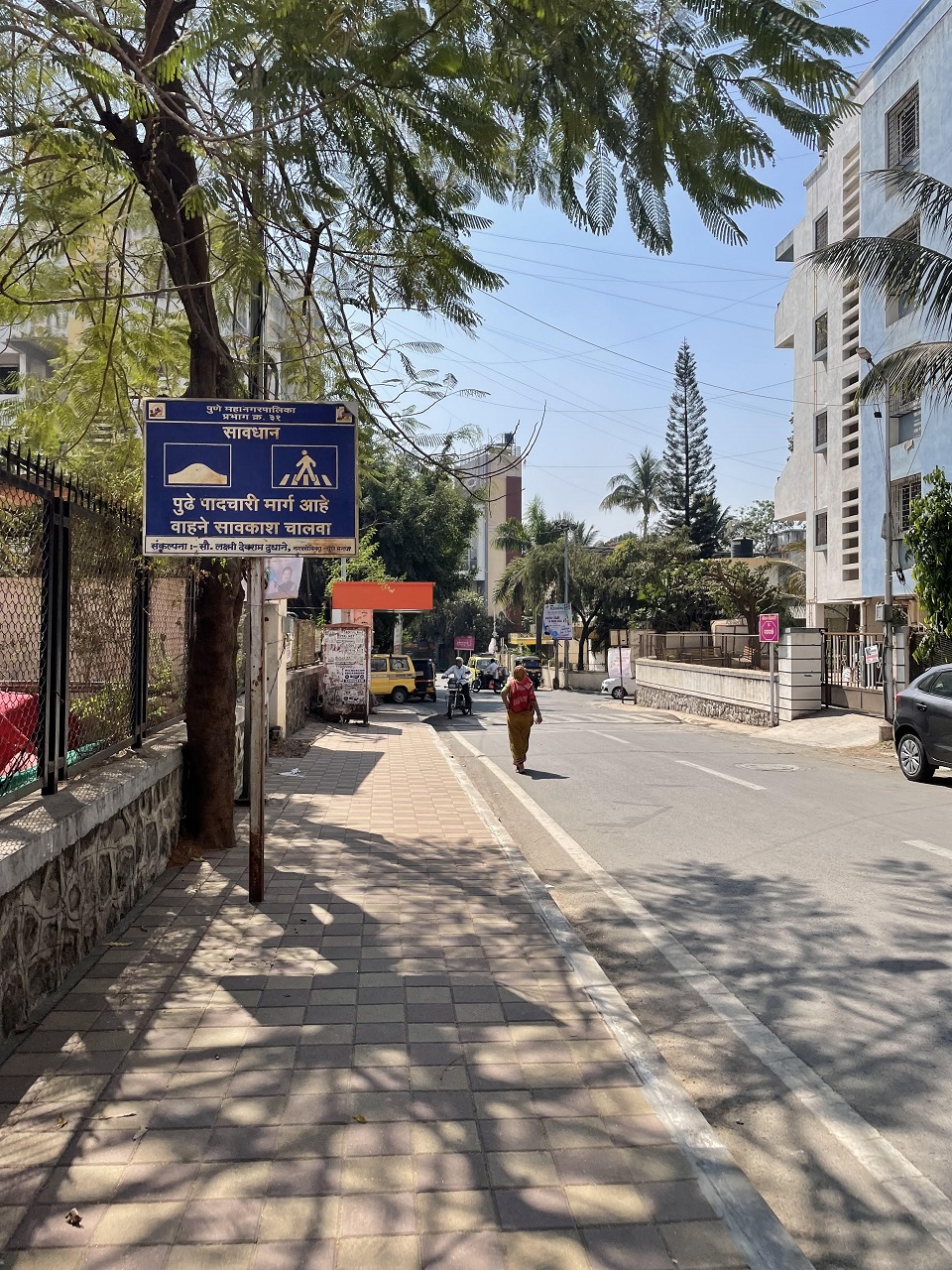
■なぜインド留学をしたのか。
私はインド好きの祖母の影響で、大学入学前からインドの文化や生活に興味がありました。地域言語としてヒンディー語を学べることや、インドへの留学プログラムがあることから、亜細亜大学に入学することを志望しました。そのため、入学当初から、国際関係学部に入ったからには留学をしたいと考えていました。
また、高校時代にもインドに行ったことがあるのですが、その時の現地の雰囲気がとても好きだったため、大学在学中に必ずインドに留学しようという想いがありました。
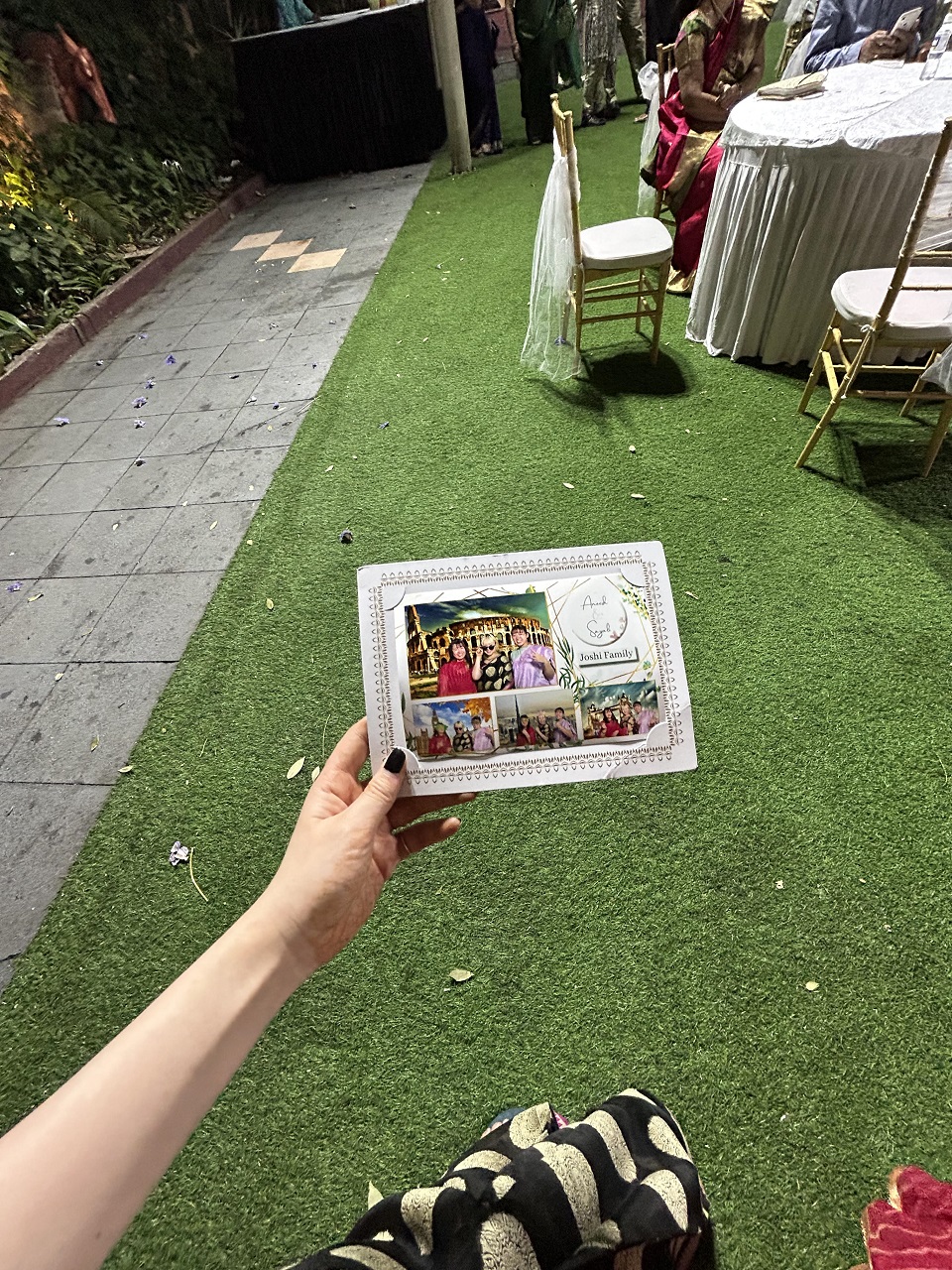
■学校はどのような感じだったか。
日本と同じように月曜日から金曜日まで学校があります。登校する際にはオートリキシャというインド伝統の自動人力車のドライバーさんが家の前まで迎えに来てくれて、学校まで送り届けてくれました。授業は9:00〜15:00で、最初から最後までひたすらヒンディー語を勉強していきます。先生はずっと同じ方で、1対3での授業でした。私たちの理解度に合わせてカリキュラムを組んでくれるため、わかるところからコツコツと進んでいったことで自分の成長を感じることができました。私たちが行った学校には日本語を学ぶ学生さんがいたので、放課後に交流することもありました。学校から帰ると、いつもチャイタイム(おやつの時間)があり、毎日美味しいチャイをいただきました。夜にはホストファミリーとリビングで歌番組を見るのが日課になっていました。休日はホストファミリーに美術館やショッピングモール、観劇、博物館など毎週のように色々な場所へ連れて行ってもらいました。
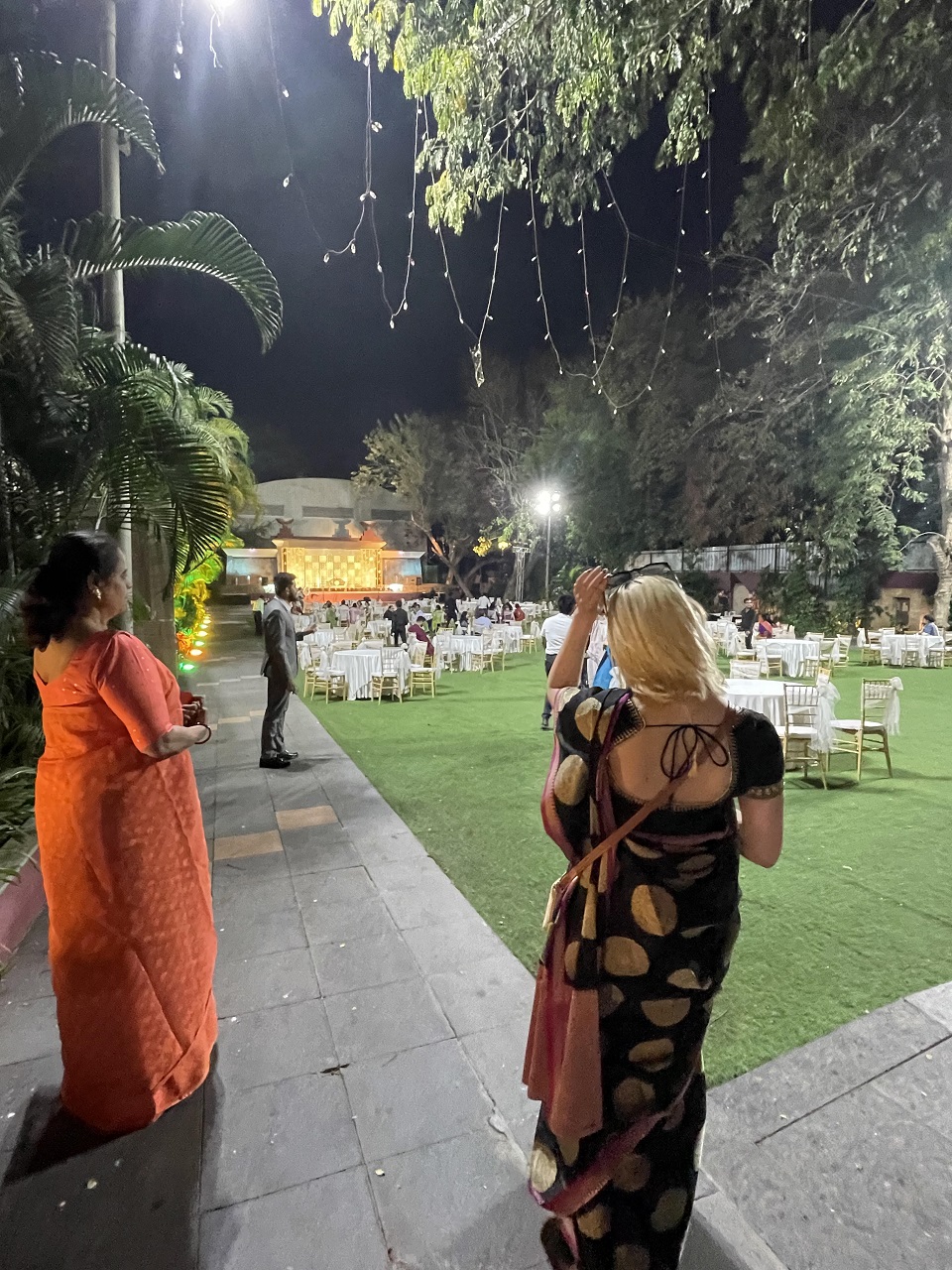
■経験して驚いたこと
面白いというよりも、インドって凄いと感じたことがありました。留学中にホストファミリーの息子さんが婚約式を挙げるので、私たちも出席することになりました。当日はインドの伝統衣装のサリーを着て、ヘナタトゥーも施し、婚約式に出席するという素敵な経験をさせていただきました。ホストファミリーのお友達もたくさん出席してお話する場面もありました。その中で日本ではあり得ないことが起きました。結婚式の招待客から、「来週、私の息子の結婚式があるから是非!」と日本では考えられないお誘いをいただきました。インドでは結婚式を盛大に祝う文化があるらしく、参加者は200人~300人、富裕層であれば1000人規模の時もあるとか。実際に参加して、結婚式場の規模に驚きました。そして、式場の一角にプリクラのような写真を撮る機械があったのが印象的でした。
結婚式に参加したことで、インドと日本の人の繋がりにおける価値観の違いに気づきました。私の体感として、インドは人と人との繋がりが強く、1度会えば友達、友達の友達は友達の用な感じがあったように思います。そのことから、インドの方たちはフレンドリーで温かい人が多いように感じました。日本では成長するにつれて、地域との繋がりが薄くなっている中で、色々な世代の人と触れ合えて、懐かしい感覚がありました。

■留学を通して
留学を経験して、語学を学ぶ大事さをより実感し、ヒンディー語と英語を翻訳ソフトが無くても意思疎通ができるくらいに話せるようになりたいという思いが強くなりました。また、5週間日本以外の国に滞在したことで、将来海外で働くという選択肢もできました。就職に対して視野が広くなったことは、留学に行って良かった点のひとつです。
留学では特にリスニング力の向上を感じました。今後、その力を伸ばしていくとともに、留学の際にインドの学校から貰ったテキストを使い、文章読解も今よりできるようになりたいです。目標としては、またインドに言った際にホストファミリーとヒンディー語だけで日常のコミュニケーションを取りたいです。
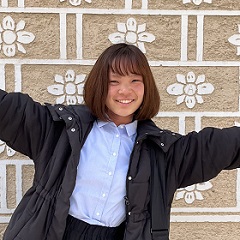
須藤 友美(SUDO Tomomi)
派遣先:スペイン
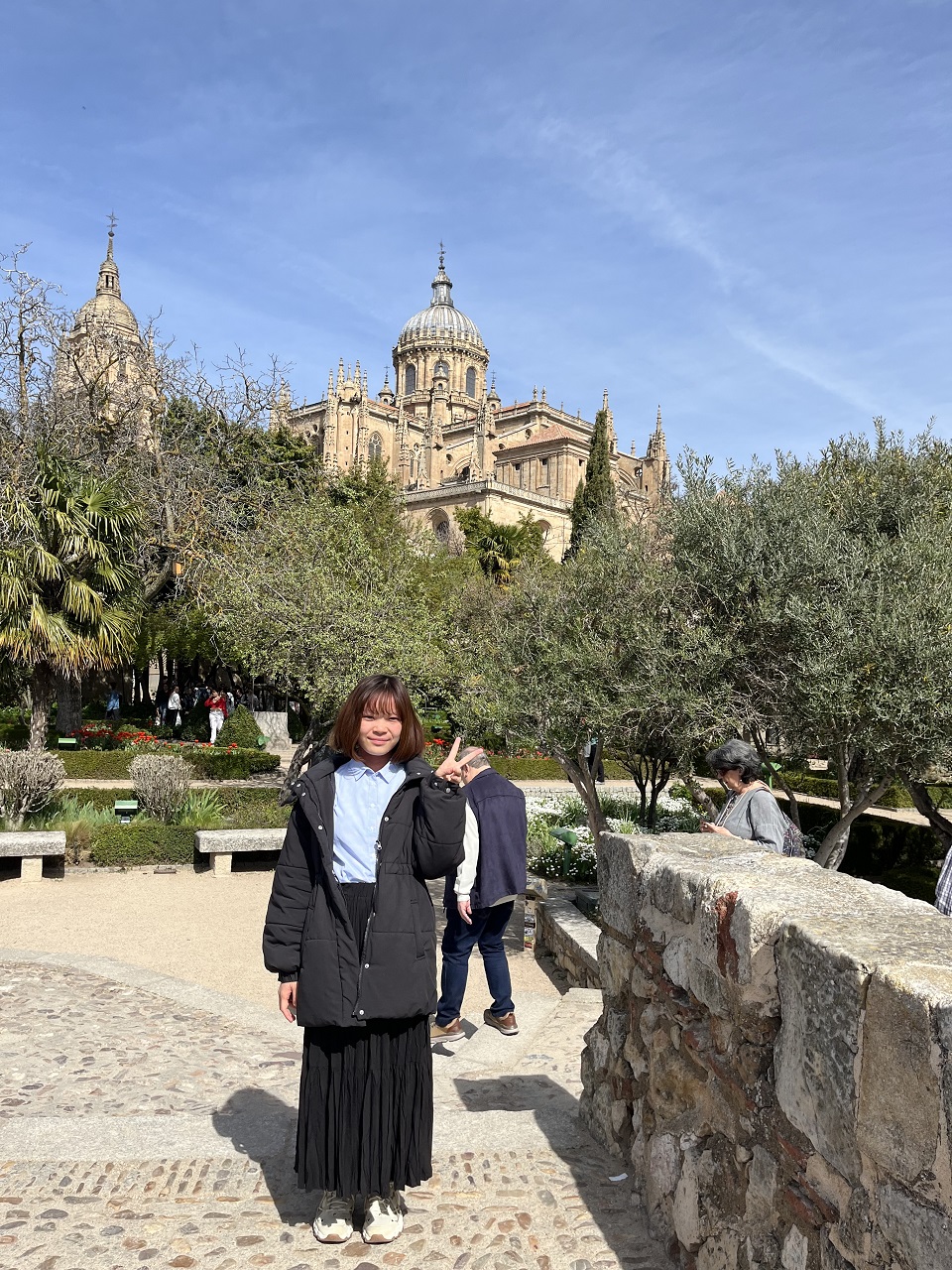
「私がAUGPスペインで得たもの」
私は大学入学後からスペイン語を学び始め、基本的な文章の「読み書き」はできるようになりましたが、「話す」ことは上手くできないことにもどかしさを感じていました。そんなときにAUGPの派遣が再開したことを知り、授業では学べない、よりリアルなスペイン語やスペインの文化・生活を学びたいと思い、AUGPスペインに参加することを決めました。
派遣先のサラマンカ大学では、午前に文法・ボキャブラリー・会話の授業がありました。文法の授業時間は他の二つよりも長く、じっくりと基礎的な文法を学ぶことができる内容でした。授業中は先生やクラスメイトと会話をする機会が多く、知識を深めると同時に楽しくリスニング力とスピーキング力を鍛えることができます。スペイン語を「話せるようになる」ことを目標としていた私にとって、良い環境だったと思います。午後は、文法の授業の宿題をした後、20時の夕飯まで街中を散策しました。サラマンカには、有名な大聖堂や美術館がたくさんあるので友達と訪れ、美しい建築やアートに触れることができました。また、現地の人たちに人気なジェラートやチョコラテをつけて食べるチュロスがあるカフェを巡ったことも、楽しかったです。私が留学した際にはサラマンカ大学に申込むと、大学内のツアーや休日に他の地域を観光するツアーに参加できました。旅先では、歴史ある城壁や美しい大聖堂を見学したり、その土地の伝統料理をガイドの方に聞いて食べてみたりと、スペインの魅力をたくさん味わうことができました。
私は大学入学後からスペイン語を学び始め、基本的な文章の「読み書き」はできるようになりましたが、「話す」ことは上手くできないことにもどかしさを感じていました。そんなときにAUGPの派遣が再開したことを知り、授業では学べない、よりリアルなスペイン語やスペインの文化・生活を学びたいと思い、AUGPスペインに参加することを決めました。
派遣先のサラマンカ大学では、午前に文法・ボキャブラリー・会話の授業がありました。文法の授業時間は他の二つよりも長く、じっくりと基礎的な文法を学ぶことができる内容でした。授業中は先生やクラスメイトと会話をする機会が多く、知識を深めると同時に楽しくリスニング力とスピーキング力を鍛えることができます。スペイン語を「話せるようになる」ことを目標としていた私にとって、良い環境だったと思います。午後は、文法の授業の宿題をした後、20時の夕飯まで街中を散策しました。サラマンカには、有名な大聖堂や美術館がたくさんあるので友達と訪れ、美しい建築やアートに触れることができました。また、現地の人たちに人気なジェラートやチョコラテをつけて食べるチュロスがあるカフェを巡ったことも、楽しかったです。私が留学した際にはサラマンカ大学に申込むと、大学内のツアーや休日に他の地域を観光するツアーに参加できました。旅先では、歴史ある城壁や美しい大聖堂を見学したり、その土地の伝統料理をガイドの方に聞いて食べてみたりと、スペインの魅力をたくさん味わうことができました。
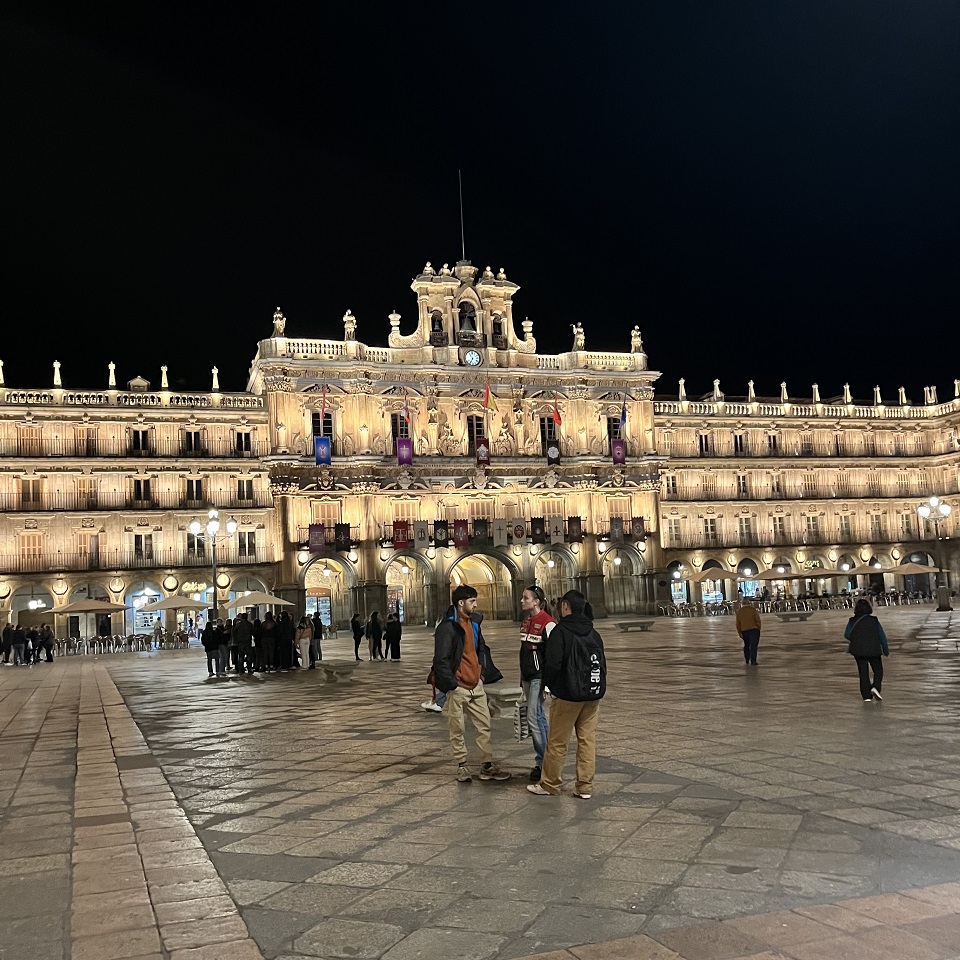
今回の留学の課題であるスピーキング力については、毎日の生活で少しずつ会話ができるようになり、日本に帰る頃にはネイティブと簡単な日常会話程度は出来るようになりました。あるお店に入ったときに、店員さんにスペイン語が上手だと褒められ、その言葉がとても自信に繋がりました。しかし、ホストファミリーとの会話は話すスピードが速く、知らない単語を使うことが多かったため聞き取りがとても難しかったです。また、スペイン人の価値観を理解できず、思うように自分の考えが伝わらなくて悔しい場面が何度もありました。特に、入浴や部屋の使い方を日本と同じようにしていたところ、スペインの価値観とは合わない部分もあったようで、時々注意をうけてしまうこともありました。この体験から、いくら文法や文化を学習しても、相手が持つ価値観を理解しなければ意思疎通が難しいことを痛感しました。また、より正確に自分の意見を伝えるためにさらにスペイン語と文化を勉強しようと決心しました。
留学してよかったと思う理由の一つは、人との出会いに恵まれたことです。私は日本が好きなスペイン人たちが集まる交流会に何度か参加しました。そこで色々なバックグラウンドを持つスペイン人と、日本やスペインの生活や文化について話したり、共通の話題で意気投合したことは良い思い出になりました。また、私のホームステイ先ではフランス人、イタリア人、ポルトガル人の子供が毎週入れ替わりでホームステイをしていました。食事の時に彼女たちの国や日本について語り合い、今でも連絡を取るほど大切な友達になりました。サラマンカ大学で知り合った日本人やAUGPスペインに一緒に参加した仲間も含め、スペインで様々な背景を持った人と出会った経験は私の人生の大きな財産になると思います。今回出会えた人たちと再会するために、いつか再びスペインを訪れたいと思います。
留学してよかったと思う理由の一つは、人との出会いに恵まれたことです。私は日本が好きなスペイン人たちが集まる交流会に何度か参加しました。そこで色々なバックグラウンドを持つスペイン人と、日本やスペインの生活や文化について話したり、共通の話題で意気投合したことは良い思い出になりました。また、私のホームステイ先ではフランス人、イタリア人、ポルトガル人の子供が毎週入れ替わりでホームステイをしていました。食事の時に彼女たちの国や日本について語り合い、今でも連絡を取るほど大切な友達になりました。サラマンカ大学で知り合った日本人やAUGPスペインに一緒に参加した仲間も含め、スペインで様々な背景を持った人と出会った経験は私の人生の大きな財産になると思います。今回出会えた人たちと再会するために、いつか再びスペインを訪れたいと思います。
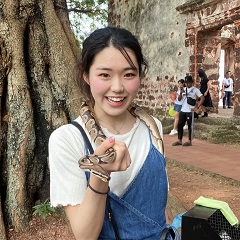
歸山 美菜(KIYAMA Mina)
派遣先:マレーシア

「2ヶ月間でのマレーシア留学で経験した貴重な体験」
1.留学を考えた理由、マレーシアを選んだ理由
私は語学力(英語を話す能力)を向上させたいと思い留学に挑戦しました。「日本人」に囲まれた環境ではなく、日常に英語が溢れる環境で生活する事で英語に慣れる習慣をつけたいと考えていました。
AUGP派遣先の中で私がマレーシアを選んだ理由は、多分化共生国家でありたくさんの文化や価値観に触れ合うことができるのではないかと思ったからです。また、春休みという長期休暇の中で充実した生活を送りたいと考え、AUGPプログラムへの参加を決意しました。
2.現地での生活について
◯授業
授業では初回に受けたテストのスコアによってクラス分けされます。私のクラスでは英語の4技能に特化した授業があり、それを中心に勉強していました。教科書に沿って学習し、リーディングやリスニングは現地の学生とペアになって問題を解いたり、スピーキングは指示されたテーマに沿ってプレゼンテーションを行うこともありました。
午前中はバディーセッションと呼ばれる英語を使ったアクティビティを行いました。現地の学生がバディーとして毎回参加し、楽しいゲームを考えてくれていました。
午後のクラスは13:00-17:00までありましたが、休憩時間があったので途中で息抜きに売店へ行きワッフルを食べに行くこともありました。先生は気さくで優しい方が多く、安心して英語を学べる環境にありました。クラスで仲良くなった中国人には中国語を教えてもらったりもしました。スーダン人の友達もでき、休みの日には夜ご飯を食べにいったりKLCC(クアラルンプール市内)に遊びに行ったりもしました。
◯食事
バディーセッションの後はよくバディー達と一緒にお昼ご飯を食べに行っていました。UCSI大学の近くにはローカルフード店やカフェなど美味しい食べ物屋さんがたくさんあり、食事の時間も楽しみで充実していました。私のお気に入り料理はロティスと呼ばれるもちもちとしたクレープ生地にコンデンスミルクが塗られたデザート料理と、パイナップルナシゴレンと呼ばれるマレーシア料理です!現地ならではの味わいを楽しむことができ、今ではマレーシア料理が恋しくなっています。
◯外出
私はせっかく2ヶ月間留学へ行くのなら充実した毎日を過ごしたいと思い、空いている時間には現地の友達と遊ぶ予定を作る事や様々な経験に挑戦する事を心がけていました。午前中に授業がない日は、現地でできた中国人の友達とバスケットボールをしたり、休日には映画館やショッピング、スケボーをしたり誘われたら行く!をモットーに積極的に行動していました。そのおかげで、英語で会話したりたくさんの人に出会う機会が増え、英語に対するハードルがどんどん下がっていきました。印象に残っている外出先は夜に見たツインタワーであり、あまりの絶景にその光景が今でも忘れられません。
現地で知り合った友人とは帰国した今でも連絡を取り合っており、いつか日本を案内したいと考えています!
1.留学を考えた理由、マレーシアを選んだ理由
私は語学力(英語を話す能力)を向上させたいと思い留学に挑戦しました。「日本人」に囲まれた環境ではなく、日常に英語が溢れる環境で生活する事で英語に慣れる習慣をつけたいと考えていました。
AUGP派遣先の中で私がマレーシアを選んだ理由は、多分化共生国家でありたくさんの文化や価値観に触れ合うことができるのではないかと思ったからです。また、春休みという長期休暇の中で充実した生活を送りたいと考え、AUGPプログラムへの参加を決意しました。
2.現地での生活について
◯授業
授業では初回に受けたテストのスコアによってクラス分けされます。私のクラスでは英語の4技能に特化した授業があり、それを中心に勉強していました。教科書に沿って学習し、リーディングやリスニングは現地の学生とペアになって問題を解いたり、スピーキングは指示されたテーマに沿ってプレゼンテーションを行うこともありました。
午前中はバディーセッションと呼ばれる英語を使ったアクティビティを行いました。現地の学生がバディーとして毎回参加し、楽しいゲームを考えてくれていました。
午後のクラスは13:00-17:00までありましたが、休憩時間があったので途中で息抜きに売店へ行きワッフルを食べに行くこともありました。先生は気さくで優しい方が多く、安心して英語を学べる環境にありました。クラスで仲良くなった中国人には中国語を教えてもらったりもしました。スーダン人の友達もでき、休みの日には夜ご飯を食べにいったりKLCC(クアラルンプール市内)に遊びに行ったりもしました。
◯食事
バディーセッションの後はよくバディー達と一緒にお昼ご飯を食べに行っていました。UCSI大学の近くにはローカルフード店やカフェなど美味しい食べ物屋さんがたくさんあり、食事の時間も楽しみで充実していました。私のお気に入り料理はロティスと呼ばれるもちもちとしたクレープ生地にコンデンスミルクが塗られたデザート料理と、パイナップルナシゴレンと呼ばれるマレーシア料理です!現地ならではの味わいを楽しむことができ、今ではマレーシア料理が恋しくなっています。
◯外出
私はせっかく2ヶ月間留学へ行くのなら充実した毎日を過ごしたいと思い、空いている時間には現地の友達と遊ぶ予定を作る事や様々な経験に挑戦する事を心がけていました。午前中に授業がない日は、現地でできた中国人の友達とバスケットボールをしたり、休日には映画館やショッピング、スケボーをしたり誘われたら行く!をモットーに積極的に行動していました。そのおかげで、英語で会話したりたくさんの人に出会う機会が増え、英語に対するハードルがどんどん下がっていきました。印象に残っている外出先は夜に見たツインタワーであり、あまりの絶景にその光景が今でも忘れられません。
現地で知り合った友人とは帰国した今でも連絡を取り合っており、いつか日本を案内したいと考えています!

3.留学中に驚いた事・発見した事
マレーシアでは、日本と比べ物価がとても安かった事です。自分が食べたいと思ったもの、やりたいと思ったアクティビティはリーズナブルな価格でチャレンジすることができました!何事にも挑戦したいと考える人には、マレーシアは最適な環境であると思います。私は休日に学校のプログラムでマラッカと呼ばれる世界遺産の場所に訪れた時、蛇を首に巻く挑戦をしました。勇気がいりましたが、日本では体験できないような経験をすることができ、今では良い思い出話として心に残っています。毎週水曜にUCSI大学の近くで開催されるナイトマーケットと呼ばれるお祭りでは、自分が食べた事のない料理にたくさん出会う事ができたので楽しかったです。現地の学生が多く参加しており、友人と思い出をたくさん作ることができました。
4.留学を経験して今後どうしたいか?
2ヶ月間のマレーシアでの留学では、たくさんの国籍や背景の人と出会う事で、日本にいる時では想像のできなかった出来事や考え方など様々な価値観を学ぶことができました。東南アジアならではの人との関わりとして、時間に対する考え方や誰にでもオープンに接する姿勢などマレーシアでは柔軟性を強く感じました。日本でもそうですが、どこにいても、どんな環境でも自分から行動しなければ何も始まらないということを強く実感しました。今回の留学経験を通して、自分が挑戦したいと思ったことは、考えるだけではなく行動に移すことが大切だと学ぶことができました。インフルエンザにかかってしまうなど思わぬハプニングに出会うことも多くありましたが、留学先で出会った友人や日本人学生に助けを借りながら乗り越えてきました。留学前では語彙力に自信のなかった私ですが、留学スタッフに英語で助けを求め、それが伝わるレベルにまで成長を遂げることができました。私はこれらの経験を通して今後も自分から行動すること、積極的にコミュニケーションをとることを意識していきたいと思っています。また、留学を経て日本人の真面目さや義理堅さ、時間遵守意識など日本の良さにもたくさん気づくことができました。最後になりますが、マレーシアにはたくさんの文化や人々、価値観や挑戦に出会える環境が整っています。実際に、現地では様々な国籍や背景の人達と出会うことができ、自分の価値観がマレーシアに来る前と比べると大きく広がっています。留学の行き先を迷っている学生にはぜひマレーシアをおすすめしたいです!
学生時代に体験する「留学」は貴重であり、非常に将来役に立つと思います。
ぜひ一生に一度の貴重な留学体験をマレーシアで過ごしてみてください!
マレーシアでは、日本と比べ物価がとても安かった事です。自分が食べたいと思ったもの、やりたいと思ったアクティビティはリーズナブルな価格でチャレンジすることができました!何事にも挑戦したいと考える人には、マレーシアは最適な環境であると思います。私は休日に学校のプログラムでマラッカと呼ばれる世界遺産の場所に訪れた時、蛇を首に巻く挑戦をしました。勇気がいりましたが、日本では体験できないような経験をすることができ、今では良い思い出話として心に残っています。毎週水曜にUCSI大学の近くで開催されるナイトマーケットと呼ばれるお祭りでは、自分が食べた事のない料理にたくさん出会う事ができたので楽しかったです。現地の学生が多く参加しており、友人と思い出をたくさん作ることができました。
4.留学を経験して今後どうしたいか?
2ヶ月間のマレーシアでの留学では、たくさんの国籍や背景の人と出会う事で、日本にいる時では想像のできなかった出来事や考え方など様々な価値観を学ぶことができました。東南アジアならではの人との関わりとして、時間に対する考え方や誰にでもオープンに接する姿勢などマレーシアでは柔軟性を強く感じました。日本でもそうですが、どこにいても、どんな環境でも自分から行動しなければ何も始まらないということを強く実感しました。今回の留学経験を通して、自分が挑戦したいと思ったことは、考えるだけではなく行動に移すことが大切だと学ぶことができました。インフルエンザにかかってしまうなど思わぬハプニングに出会うことも多くありましたが、留学先で出会った友人や日本人学生に助けを借りながら乗り越えてきました。留学前では語彙力に自信のなかった私ですが、留学スタッフに英語で助けを求め、それが伝わるレベルにまで成長を遂げることができました。私はこれらの経験を通して今後も自分から行動すること、積極的にコミュニケーションをとることを意識していきたいと思っています。また、留学を経て日本人の真面目さや義理堅さ、時間遵守意識など日本の良さにもたくさん気づくことができました。最後になりますが、マレーシアにはたくさんの文化や人々、価値観や挑戦に出会える環境が整っています。実際に、現地では様々な国籍や背景の人達と出会うことができ、自分の価値観がマレーシアに来る前と比べると大きく広がっています。留学の行き先を迷っている学生にはぜひマレーシアをおすすめしたいです!
学生時代に体験する「留学」は貴重であり、非常に将来役に立つと思います。
ぜひ一生に一度の貴重な留学体験をマレーシアで過ごしてみてください!
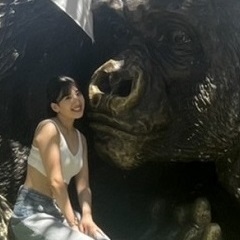
中山 いちご(NAKAYAMA Ichigo)
派遣先:オーストラリア・シドニー(インターンシッププログラム)
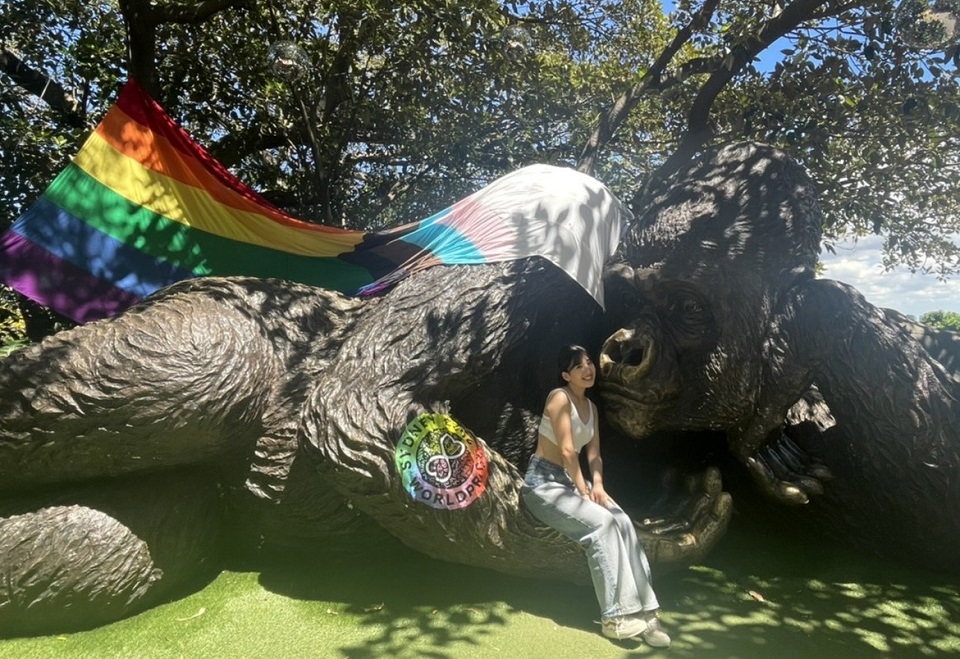 △タロンガ動物園にて
△タロンガ動物園にてまず初めに、私がなぜAUGP制度を利用してオーストラリアでのインターンシップを選んだかお伝えします。高校生時代に一年間オーストラリアに留学していました。「もう一度行きたい。でも今度は長くなくていいし、語学留学ではない形で海外に行って自分の力を試したい。」と思っていた時に、短期間留学制度であるAUGPを見つけました。様々な国の中で唯一、オーストラリアのみインターンシップが行える国であった為、AUGPインターンシップに参加することを即決しました。
5週間という短い期間でしたが、非常に濃く、充実した時間を過ごすことができたと思います。研修期間中、初めの1週間は語学学校で過ごし、残りの4週間をホテルでのインターンシップを行いました。語学学校では最初に受けるテストによってクラス分けをされ、同等レベルの留学生と共に少人数クラスで授業が行われました。クラスメイトがとても意欲的に授業に参加する姿勢に刺激を受け、英語を勉強するのに最適な環境であったと思っています。インターンシップ先のホテルでは、主にコンシェルジュとして実際に働きました。コンシェルジュとはお客様のあらゆるご要望にお応えするお仕事です。私が働いていたホテルは旅行用途で宿泊される海外からのお客様が多かった為、近くの観光地や交通機関といったホテル付近の情報を頭に入れて働いていました。
5週間という短い期間でしたが、非常に濃く、充実した時間を過ごすことができたと思います。研修期間中、初めの1週間は語学学校で過ごし、残りの4週間をホテルでのインターンシップを行いました。語学学校では最初に受けるテストによってクラス分けをされ、同等レベルの留学生と共に少人数クラスで授業が行われました。クラスメイトがとても意欲的に授業に参加する姿勢に刺激を受け、英語を勉強するのに最適な環境であったと思っています。インターンシップ先のホテルでは、主にコンシェルジュとして実際に働きました。コンシェルジュとはお客様のあらゆるご要望にお応えするお仕事です。私が働いていたホテルは旅行用途で宿泊される海外からのお客様が多かった為、近くの観光地や交通機関といったホテル付近の情報を頭に入れて働いていました。
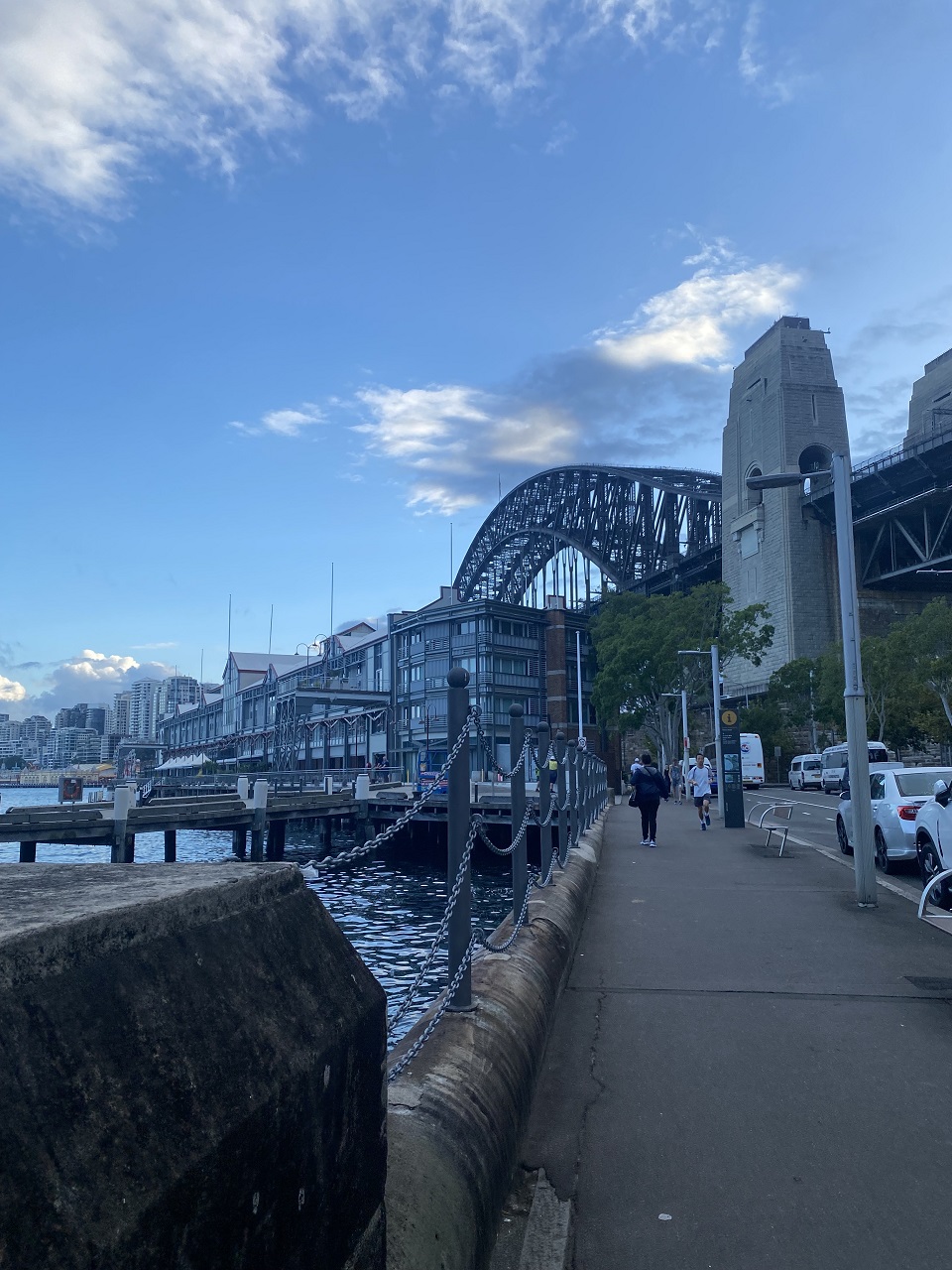 △インターンシップ先のホテル
△インターンシップ先のホテルホテルでのインターンシップを終えて一番印象に残ったことは、日本と海外の「ホスピタリティ」の違いです。日本では接客時お客様は敬う存在とされ、丁寧さが求められます。また接客する側とされる側には一定の距離がいつも生じている、と私は思っています。一方で今回オーストラリアでのインターンシップでは、比較的フランクで友人のような温かい、安心感がある接客をしている従業員が多く見受けられました。その為オーストラリアのホスピタリティはお客様と接客をする側には絆のようなものが存在していると感じました。私はホスピタリティ・マネジメント学科に所属し、ホスピタリティ産業を学んでいるからこそ、身をもってその違いを体験できたことが嬉しかったです。稀にホテル側からアイスやお菓子が従業員に配られる日があり、それを楽しみにお仕事を頑張ったことも印象に残っている思い出の一つです!
最後に、留学を経験して、やはりまだまだ自分の英語力は伸び代があると感じました。言語学習へのモチベーションが更に高まったので、より真剣に勉強に取り組み、レベルアップを目指していきたいと思っています。また海外での働き方を直で見て実際に体験し、魅力的に感じた部分がありました。これから就職活動が始まりますが、海外に関わる仕事も視野に入れつつ、これから始まる就職活動を頑張っていきたいです。
最後に、留学を経験して、やはりまだまだ自分の英語力は伸び代があると感じました。言語学習へのモチベーションが更に高まったので、より真剣に勉強に取り組み、レベルアップを目指していきたいと思っています。また海外での働き方を直で見て実際に体験し、魅力的に感じた部分がありました。これから就職活動が始まりますが、海外に関わる仕事も視野に入れつつ、これから始まる就職活動を頑張っていきたいです。
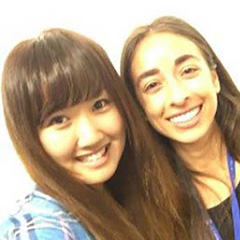
田中 美穂(TANAKA Miho)
派遣先:オーストラリア・シドニー(インターンシッププログラム)
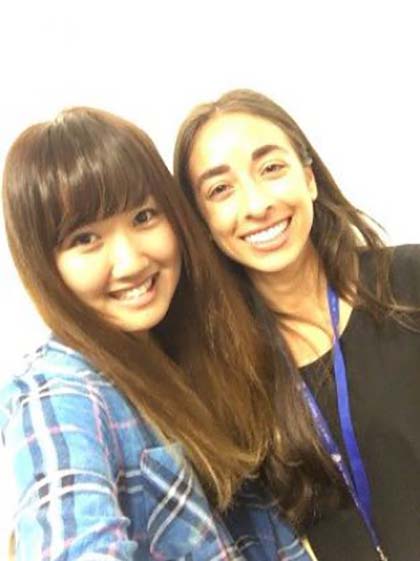
田中 美穂(TANAKA Miho)
国際関係学部 多文化コミュニケーション学科
国際関係学部 多文化コミュニケーション学科
- 平成26年度 AUAPに参加 5か月間アメリカ・イースタンワシントン大学に留学
- 平成27年度 AUGPオーストラリア(シドニー)に参加 約5週間シドニーで語学研修、インターンシップを経験
- 平成28年度 AUEPに参加 約1年間アメリカ・セントラルワシントン大学に留学中
AUGPに参加したきっかけは?
今回AUGPシドニーに参加するにあたって、私は3つの目標を立てました。一つ目は、多国籍国家であるオーストラリアで多文化共生を体験すること。二つ目は、語学学校やインターンシップ先などで人脈を広げること。そして最後に、旅行会社でのインターンシップにおいて専門的な英語(ビジネスで通用する英語)を習得することです。語学授業はどのように行われていましたか?
最初の語学学校での英語の授業は、朝8時から12時まで行われており、担当していたのはオーストラリア出身とイギリス出身の教員で、クラスは17人程度、その半分以上が中国人でその他日本人、韓国人、イラク人、コロンビア人の学生など国際色豊かなクラスでした。授業では毎回テーマを用いて、ペアになり意見交換をしたり、テーマに沿ったゲームをしたりと楽しみながら受けることができました。課外授業では博物館へ行き、オーストラリアの先住民であるアボリジニに関する展示を見学するなど、オーストラリアの歴史についても学ぶことができました。毎回の授業で新しい単語を学び、オーストラリア特有の言い回しも知ることができ、日々成長を感じることができました。インターナショナルなクラスであったからこそ、テーマに対するディベートを通してそれぞれの国の文化や習慣について伝え合い、異文化理解につながったと感じました。
現地でのインターンシップではどのような経験をしましたか?

インターンシップにおいては、現地の旅行会社でカーレンタルのサポート と、別の旅行会社とのやり取りにおける事務サポートを主にしていました。 まったく知識のなかった車やカーレンタルの会社について知ることができ、 英語でのやり取りのメールの中で、ビジネスで使う、より丁寧な伝え方や 新たな語句を学びました。
外資系企業ということで日本人は自分のみだったため、より英語を聞き取る力・伝える力がついたと実感しています。 オフィスには出身国の異なる人々が共に仕事をしており、彼らの中には学生をしながら働いている人もいました。異なる背景を持つ人々が互いの違いを理解しながら共に働く様子は、心に深く残っています。
外資系企業ということで日本人は自分のみだったため、より英語を聞き取る力・伝える力がついたと実感しています。 オフィスには出身国の異なる人々が共に仕事をしており、彼らの中には学生をしながら働いている人もいました。異なる背景を持つ人々が互いの違いを理解しながら共に働く様子は、心に深く残っています。
授業やインターンシップ以外ではどのように過ごしていましたか?
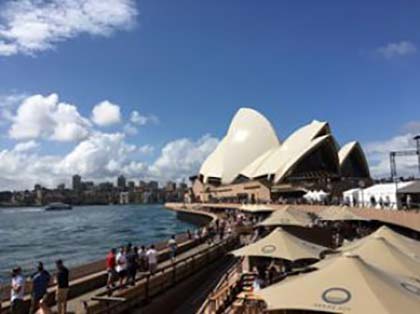
授業やインターンシップ以外の自由時間や週末は、できるだけ 観光地や街中を散策しようと外で過ごすようにしていました。 平日は街から近くの観光スポットを訪れ、クラスでできた友達と ランチへ行ったり、コーヒーを買って公園でただ過ごしたり しました。
街中には様々な国の料理が食べられるレストランやカフェが多く、毎日異なる国の料理を味わうことができます。また、オーストラリアでは 学校も会社も朝が早いため、カフェも開くのが早く、皆朝ごはんを買って出勤していて、朝から公園で運動している人も見かけました。都会の中にある公園は皆がくつろぐ場所で、お昼の休憩時間にサラリーマンが昼寝をしていることもあり、日本とは異なる習慣が見られて新鮮でした。
街中には様々な国の料理が食べられるレストランやカフェが多く、毎日異なる国の料理を味わうことができます。また、オーストラリアでは 学校も会社も朝が早いため、カフェも開くのが早く、皆朝ごはんを買って出勤していて、朝から公園で運動している人も見かけました。都会の中にある公園は皆がくつろぐ場所で、お昼の休憩時間にサラリーマンが昼寝をしていることもあり、日本とは異なる習慣が見られて新鮮でした。
AUGPでの留学を総括すると?
この留学生活で楽しかったことは、多くの人に出会い、ネットワークが広がったことです。キャンパスで出会ったイラク出身の女性とは、私が大学で第2外国語として学んでいたアラビア語を通じてより深くコミュニケーションをとることができました。今まで出会ったことのない国の出身者と出会う機会が多くあったため、新たに知ることが多く、毎日勉強の日々でした。多国籍国家、オーストラリアでの5週間の留学で、多くの人に出会うことができ、多文化共生社会を体験することができました。特に、インターンシップでは、目標としていたビジネス英語を習得することができ、これから参加する交換留学(AUEP)にもつながったと思います。将来海外の旅行会社で働くことを考えているため、今回実際にビジネスの現場で体験できたことで、さらにその目標への気持ちが強くなりました。今回の経験で、専門的知識のみでなく一般教養も必要であると感じたため、帰国後も勉強して将来に活かしたいと思います。
留学後の成果~My Before After~
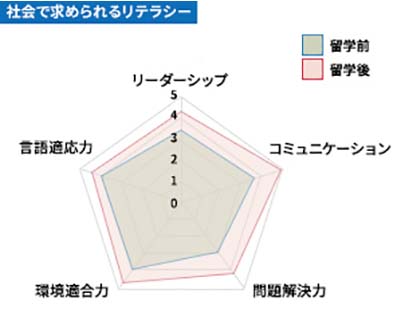
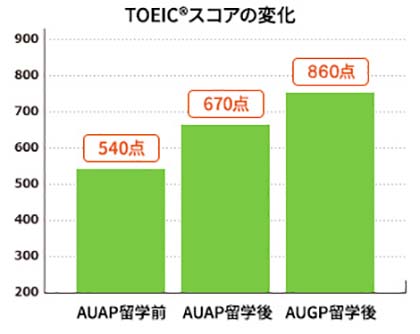
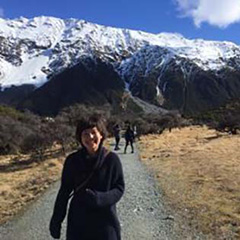
安部 真規子(ABE Makiko)
派遣先:ニュージーランド
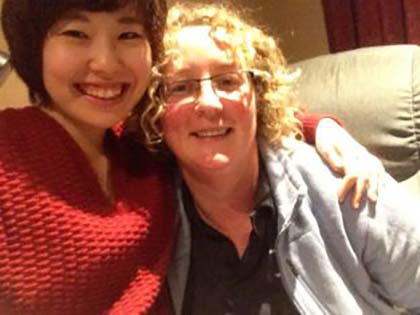
安部 真規子(ABE Makiko)
国際関係学部 国際関係学科
国際関係学部 国際関係学科
- 平成26年度 AUGPアイルランドに参加 約3週間リムリック大学に留学
- 平成27年度 AUAPに参加 5か月間アメリカ・サンディエゴ州立大学に留学
- 平成28年度 AUGPニュージーランドに参加 約4週間アラ・インスティチュート・オブ・カンタベリー(旧クライストチャーチ・ポリテクニック工科大学)に留学
AUGPに参加したきっかけは?
もともと知らない土地へ行くことや新しい人に出会うのが好きだということ、また5か月間のAUAPで培った英語力や経験を活かして留学してみたいと思ったことがきっかけでした。その中でもニュージーランドを選んだのは、自然が多く落ち着いた雰囲気に惹かれたのと、東日本大震災と同時期に大きな地震が起こった街であるということに関心を持ったからです。
現地では、どのような授業を受けていましたか?
15人程度の少人数のクラスで、ペアワークやグループワークが中心の授業でした。クラスメイトや先生と会話をしながら、楽しく文法やボキャブラリーを学ぶことができます。面白かった授業は、ロールプレイと音楽を聴く授業です。ロールプレイは、クラスメイトとペアを組み、テーマに合わせて短い芝居をします。それぞれの個性がでていて、内容を考えるのもみんなの芝居を見るのも、とても楽しい時間でした。音楽は、ひとりの生徒が好きな曲をクラスメイトに披露し、単語を聞き取ったり歌詞の意図を考えたりする授業です。披露する生徒が先生の立場になって授業を進める形なので、新鮮な気持ちで楽しく受けることができました。
全体的にコミュニケーションをとる機会がとても多いので、スピーキングやリスニングの力がつき、クラスメイトと仲良くなりやすい環境でした。
留学を振り返って楽しかったことや印象に残っていることは?
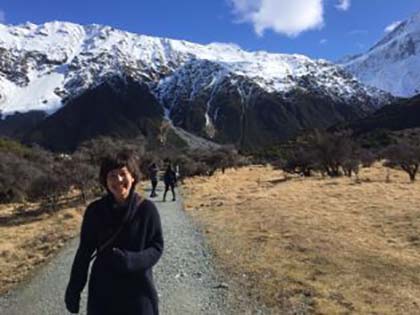
最も印象に残っているのは、休暇を利用して行ったマウントクックとテカポ湖です。マウントクックは世界遺産に登録されている山々で、テカポ湖は世界で一番星が綺麗に見られると言われている場所です。日本では出会うことのできない壮大な山や湖、星空を見て感動し、ニュージーランドに来て良かったと心から思いました。また仲間と共に宿泊施設で自炊をしたり、ステイ先のファームで動物たちと触れ合ったりしたのも印象深い思い出です。一生忘れられない旅行になりました。
また、日常の中で印象に残っていることは、震災の復興状況です。未だ多くの建物が工事中で、壊れかけたまま放置されているビルもありました。日本に比べゆっくりではありますが復興中の街の様子を実際に見て、本当に大きな地震だったのだと感じました。
また、日常の中で印象に残っていることは、震災の復興状況です。未だ多くの建物が工事中で、壊れかけたまま放置されているビルもありました。日本に比べゆっくりではありますが復興中の街の様子を実際に見て、本当に大きな地震だったのだと感じました。
これまでAUAP、AUGPアイルランドとさまざまな留学プログラムに参加した中で、今回のAUGPニュージーランドの経験はどのようなものでしたか?
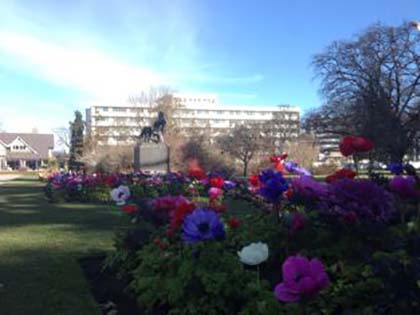
これまで参加したAUGPアイルランドやAUAPは、自分の英語力を伸ばす場と思い参加してきました。それに対して今回のニュージーランドは、英語力をさらに伸ばすというだけではなく「今までの留学で得たものや後悔をどれだけ活かせるか」と考え参加しました。
実際にこれまでの留学で英語力や行動力に自信をつけてきたことで、ニュージーランドでは何事も積極的に前向きに取り組むことができました。自分から進んで行動することで、1か月という短い期間でも密度の濃い経験ができたと思います。例えば、これまでの留学で「ホストファミリーと過ごす時間が少なかった」という後悔も、ニュージーランドでは自分から進んで誘うこと、そしてなんでも本音を話すことで、より親密な関係を築くことができました。これまでの留学経験を無駄にせず、今回のAUGPでさらに成長できたと感じています。
実際にこれまでの留学で英語力や行動力に自信をつけてきたことで、ニュージーランドでは何事も積極的に前向きに取り組むことができました。自分から進んで行動することで、1か月という短い期間でも密度の濃い経験ができたと思います。例えば、これまでの留学で「ホストファミリーと過ごす時間が少なかった」という後悔も、ニュージーランドでは自分から進んで誘うこと、そしてなんでも本音を話すことで、より親密な関係を築くことができました。これまでの留学経験を無駄にせず、今回のAUGPでさらに成長できたと感じています。
留学後の成果~My Before After~
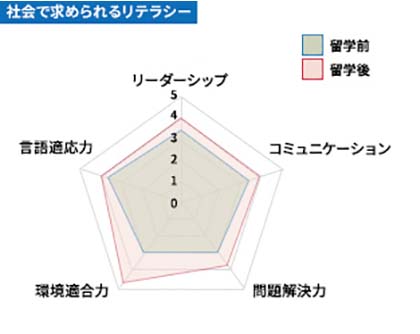
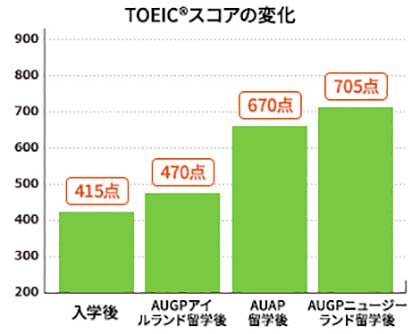
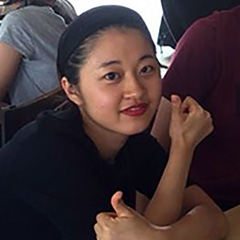
吉川 千菜枝(Kikkawa Chinae)
派遣先:マレーシア
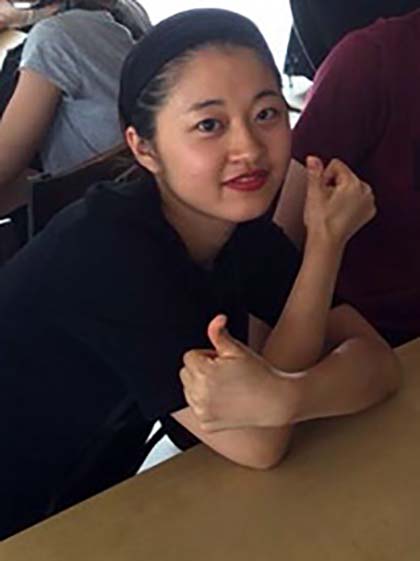
吉川千菜枝(Kikkawa Chinae)
経営学部 ホスピタリティ・マネジメント学科
経営学部 ホスピタリティ・マネジメント学科
- 平成26年度 AUGPマレーシアに参加 約4週間マレーシア・UCSI大学に留学
AUGPに参加したきっかけは?
私が今回、マレーシアへの短期留学プログラムであるAUGPに参加した目的は2つあります。1つ目は英語のスキルを上げることです。英語は世界で1番話されている言語です。自分自身の英語のスキルを上げ、もっとグローバルに活動したいという思いがありました。そして、2つ目はマレーシアの文化を知ることです。留学前、マレーシアのことを調べていると、マレーシアは多民族国家であることがわかりました。マレー人、華人、インド人を中心に他の民族の方々といっしょに共存しており、日本とは異なったカルチャーに興味深い思いでいっぱいでした。
現地では、どのような授業を受けていましたか?
授業は8時~12時の時間帯で、朝早くから授業が始まりましたが、早朝からの授業に対しての抵抗はありませんでした。1ケ月しかないマレーシア生活を思う存分、楽しみたかった私にとっては、朝早くから活動できることは嬉しいことでした。授業内容はやや簡単に思える部分もありましたが、理解している内容を英語で聞いて学ぶことは別格で、苦手だったSpeakingとListeningのスキルを上げることに繋がりました。結果、日々の授業に真剣に取り組むことができました。私のクラスは他のクラスに比べて比較的、日本人が少ないクラスであったことが良かった点でもあります。できるだけ英語のある環境で過ごしたかった私にとっては最適な環境でした。
語学授業の他にも、マレーシアの文化を学ぶクラスを受講し、マレーシアの企業を訪問する機会に恵まれました。
短期間の研修でどのように語学力を上げましたか?
留学前は英語のスキルを上げたいという思いが強かったため、マレーシアでの授業以外の英語の学習は、日本から持ってきた教材を使用する計画でした。しかし、実際にマレーシアに来てすぐ、この勉強方法は良くないと感じ、できるだけ外国人と会話をするのがベストだと考えました。日本の教材を使っての学習は夜に自分の部屋に戻ってからするようにしました。留学の最後の方には、日本人私1人が外国人の中に混ぜてもらうことも多々ありました。同じ研修に参加していたメンバーの中には、クアラルンプールの中心部にあるツインタワーに何度も行っている人がいて、「なぜ何回も行くのか?」と尋ねると、「一緒に行く人たち(他国の留学生または現地の学生)と過ごすことに意味があるから」と言われ、意識が高いと感じました。
現地はどのような生活を送っていましたか?
わたしは「1ケ月しかないから日々を充実させる」という思いが強すぎたため、朝から夜まで活動し、充実した楽しい時間を過ごすことができました。ですので、休日の自由時間に寝て過ごすという考えは嫌でした。寝るくらいならどこかへ出かけたい、何かをしたいと思っていました。マレーシアは日本と比べて物価が安く、毎日が外食文化であったことがとても新鮮で、日々「今日は何を食べようかな?」と考えていました。さらに、今まで食べたことのない食べ物にも出会うことができて幸せでした。そして、留学を通してマレーシア人、韓国人、中国人、インドネシア人、タイ人、ヨルダン人、リビア人、カザフスタン人など様々な国の友達と知り合えたことが留学の収穫の一つです。留学生活から学んだことを、今後どう生かしていきたいですか?
私は影響されやすい性格なので、留学最終日はもっとマレーシアで過ごしたいという思いに駆られました。日本に帰国してからは、英語はもちろんのこと、韓国語や考えてもいなかったアラビア語を学びたいとも思いました。このような興味が湧いたのも、マレーシアでの留学生活のおかげだと思います。今回の留学で、マレーシアに興味を持ち、そこからマレーシアの「観光業」に興味を持つようになりました。卒業後は、マレーシアで観光業を学ぶと決めています。
マレーシアは、マレー人を中心に中国人やインド人など、様々な民族が共存している「多民族国家」です。それに伴い、多様な言語、多様な食文化といった日本にはない「多様性」が富んでいる国です。この夏マレーシアを訪れて、「英語学習」+「異文化体験」をしてみてください!
留学後の成果~My Before After~
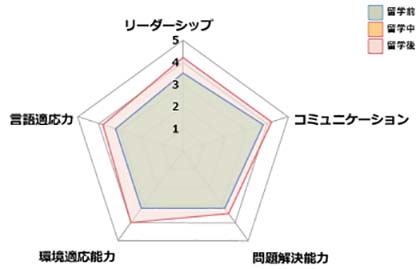
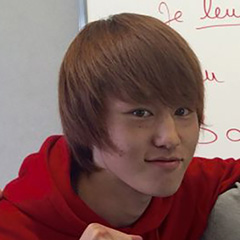
中島 弘隆(NAKAJIMA Hirotaka)
派遣先:フランス
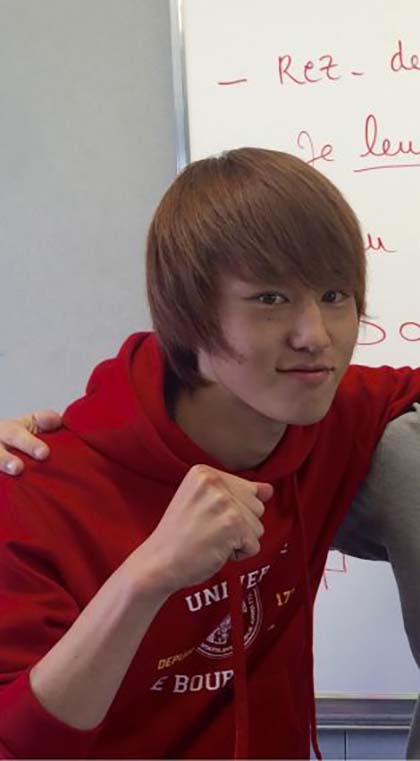
中島 弘隆(NAKAJIMA Hirotaka)
法学部 法律学科
法学部 法律学科
- 平成27年度 AUGPフランスに参加 約4週間フランス・ブルゴーニュ大学に留学
AUGPに参加したきっかけは?
フランス語をより学びたいということと、フランスの文化に直接触れたいという理由からです。英語の次に話者の多いこの言語を学んで、将来に活かしたいということもありました。そもそも海外留学を選んだのもただ海外に行きたいからという理由ではなく、元からヨーロッパ、特にフランスに興味があったことも大きな理由です。歴史や文化は日本にいても調べることはできますが、自分で観たり感じたりしなければ本当のところはわからないと思い、参加しました。
現地では、どのような授業を受けていましたか?

授業は1日4時間ありました。文法を学んだ後に会話で実践するというのが基本的な授業内容で、加えてディクテ(フランス語を聞いて、それを書き取ること)などを行いました。
文法の授業、会話の授業などと分かれているわけではなく、1回で様々なカテゴリを学びました。文法に関しては既に習ったことが多く復習する形でしたが、それをフランス語で聞いて理解するのは難しく、特に最初の方はそれを強く感じました。しかし注意深く聞いていたので、日本では練習できなかった「聞き取る力」を大いに養うことができました。
語学の授業の他は、放課後に希望する学生が受講できる文化の授業もありました。1週間に1つのテーマで、音楽や社会など興味深い内容の講義でした。語学の授業と違いフランス語も難しいものでしたが、少しずつ辞書で調べたりしながら、楽しく受講していました。
また、大学主催の課外授業があり、ボーヌへ行きました。シャトーやワイン畑の見学もできました。以前から興味もありましたし、フランスの文化を知る上では欠かせないものですので、実際にその文化に触れられたことはとてもいい経験になりました。 授業以外でも、現地の人と会話することで伝えることの難しさを実感し、ただ授業で習っただけでは意味がなく、その言語を使うことで身についていくものなのだと気付かされました。ほかにも、頻繁に中心部や郊外を散策して本にも載ってないような発見や、日本にいてはわからないような文化の違いなどを、肌で感じることができました。
文法の授業、会話の授業などと分かれているわけではなく、1回で様々なカテゴリを学びました。文法に関しては既に習ったことが多く復習する形でしたが、それをフランス語で聞いて理解するのは難しく、特に最初の方はそれを強く感じました。しかし注意深く聞いていたので、日本では練習できなかった「聞き取る力」を大いに養うことができました。
語学の授業の他は、放課後に希望する学生が受講できる文化の授業もありました。1週間に1つのテーマで、音楽や社会など興味深い内容の講義でした。語学の授業と違いフランス語も難しいものでしたが、少しずつ辞書で調べたりしながら、楽しく受講していました。
また、大学主催の課外授業があり、ボーヌへ行きました。シャトーやワイン畑の見学もできました。以前から興味もありましたし、フランスの文化を知る上では欠かせないものですので、実際にその文化に触れられたことはとてもいい経験になりました。 授業以外でも、現地の人と会話することで伝えることの難しさを実感し、ただ授業で習っただけでは意味がなく、その言語を使うことで身についていくものなのだと気付かされました。ほかにも、頻繁に中心部や郊外を散策して本にも載ってないような発見や、日本にいてはわからないような文化の違いなどを、肌で感じることができました。
現地での生活を振り返って、どうでしたか?
楽しかったことは挙げればきりがありませんが、同じフランス語を学んでいる人と知り合えたことは自分にとって1つの大きな収穫と言えると思います。同じぐらいの年齢で自分よりもはるかに語学力がある、そんな友人ができ、いい刺激をたくさんもらいました。事前研修の際にいわゆるカルチャーショックに陥る人もいる、と適応手段も含めて指導されて多少心配してはいましたが、そのようなことにはなりませんでした。日本とは違う、慣れない文化に早く溶け込みたいなと思いどんどん吸収していき、異文化ストレスを存分に楽しんでいました。確かに自分の言いたいことが現地の人にうまく伝わらないこともありましたが、そこは相手の理解力に助けられ、人々の優しさを実感した面もありました。
終わりに近づくにつれてフランス語が理解できるようになり、嬉しさの反面、もうこの留学が終わってしまうという残念な気持ちがありました。最後に街を離れる際には先生や寮長にフランス語が進歩していると言われ、とても嬉しかったことを覚えています。
留学生活から学んだことを、今後どう生かしていきたいですか?
今回の留学で視野を大きく広げることができ、可能性も道筋もたくさん見えました。この経験を決して無駄にせず、必ず活かしていきたいです。できることならフランスに関わる仕事に就きたいです。もちろんフランス語はこの先ずっと続けるし、フランスにはもっと魅せられるのだろうなと思っています。 非日常の中の日常というのはとても刺激的なもので、忘れられることではありません!
留学後の成果~My Before After~
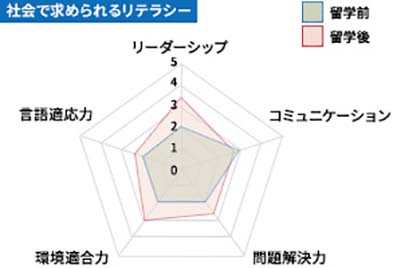
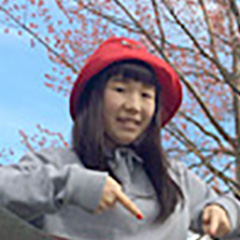
清水 香菜(SHIMIZU Kana)
派遣先:韓国
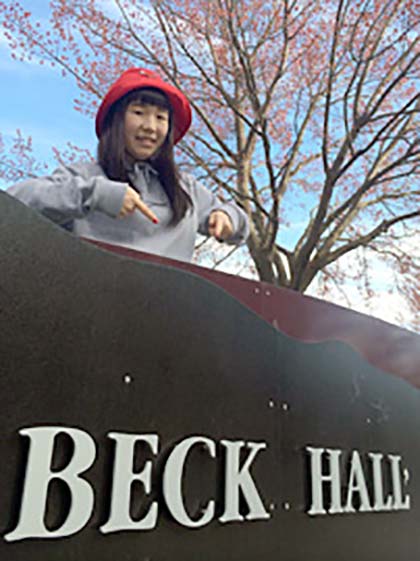
清水 香菜(SHIMIZU Kana)
国際関係学部 多文化コミュニケーション学科
国際関係学部 多文化コミュニケーション学科
- 平成26年度 AUGP韓国に参加 約3週間韓国・慶煕大学校に留学
- 平成27年度 AUAPに参加 5か月間アメリカ・セントラルワシントン大学に留学
AUGPに参加したきっかけは?
以前から韓国について興味があり、何度か旅行で訪れていましたが、留学をすることによって実際の生活や文化を体験してより知識を深め、今後の就職活動に活かしていきたかったからです。現地では、どのような授業を受けていましたか?
授業時間は50分で、私としてはとても短く感じました。内容は毎日「聞く・話す」の授業をやり、週に1、2回ある文化特講という授業では、「書く」授業を選択しました。「聞く・話す」の授業では日常生活で使えるフレーズや様々な文法を学び、日本語には無い難しい発音を1人ひとり先生が見てくださいました。文化特講では「書く」授業を今回集まった百十数人いる留学生の中で4人しか選択しなかったので、先生が毎回1人ひとり細かく見てくださいました。そのため留学前は文章が少ししか書けませんでしたが、友達の紹介ができるぐらい長く書くことができるようになりました。先生は韓国人で、日本語を少し話せる方もいましたが、ほとんど韓国語を話しながらの授業だったので話を聞き取るだけでも勉強になる環境でした。また、今回の3週間の留学期間の中で2回行われた現地学習では、1回目に陶磁器製作、韓国民族村の見学をし、2回目はソウルタワーの見学、「乱打」の観覧、景福宮の見学をしました。そして日本のお盆のような秋夕休み以外は毎日授業があり、宿題も毎日ありました。
留学期間中に韓国のグローバル企業を訪問する機会があり、Samsung d’light(サムスン電子のグローバルブランド広報施設)を訪ね、お話を伺いました。デザイン性などをより幅広く生み出すために、現在韓国人の社員よりも海外の社員や女性を起用しているそうです。Samsungだけではありませんが、他にも海外の社員を必要としている企業は多いと私は思います。海外で活躍したり、日本人のアイデアを世界に広げていくためにも英語は必要不可欠なので、意思疎通ができるようにならなければならないと思いました。
現地での生活を振り返って、どうでしたか?
韓国人と話をして意思疎通を図ることができたのは嬉しかったのですが、私の勉強不足で分からない単語や文法などが出てきたときにお互い戸惑ってしまい、言いたい事を言えなかったことがありました。このような事が何度もあり、留学に行く前からもう少し勉強すればよかったと思いました。また日本語には無い発音が韓国語には多いので、慣れていない発音をしても通じなかったこともありました。言葉の面で成長できたこともあり、苦しんだこともありましたが、トウミ(留学生の韓国語学習の手助けをする、慶煕大学校の学生チューター)の方や他の韓国人の友人に韓国人しか行かないような所へ案内してもらったり、旅行では滅多に食べないようなものを食べたり、目標としていた「現地の方の中に溶け込んで生活する」ということができ、とても楽しい留学生活を送れました。また、寮の隣にあるコンビニの店員さんや大学の近くにあるコーヒーショップの店員さん、買い物をしている際に仲良くなった店員さんなど、そこへ行くたびに私のことを覚えてくださっていて、笑顔で優しく接してくれました。
留学生活から学んだことを、今後どう生かしていきたいですか?
もともと留学したいという願望がありましたが、海外で生活できるのか、その国の言語を上達することができるのかなど不安な気持ちがありました。しかし今回留学してみて、慣れない生活だけれど不安を自信に変える力やチャレンジ精神がつきました。そして私はAUAPでの5ヶ月間のアメリカ留学を控えています。3週間とは大きく違って長期間の滞在になるので、今回とはまた違った不安も出てくるかもしれません。ですが、そこでもどう最大限吸収できるのか自分で考えて過ごしたいと思っています。また、今回のAUGP韓国で会話をすることはできたけれども、まだ分からない部分があって言いたい事をしっかり伝えられなかったという後悔もあるので、日本で韓国語の勉強をより一層励み、再び韓国留学をしたいと思います。
留学後の成果~My Before After~
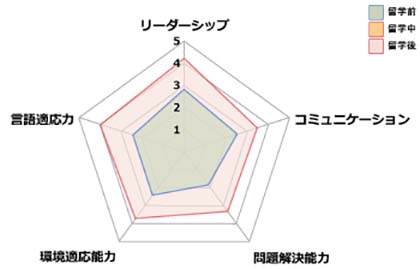
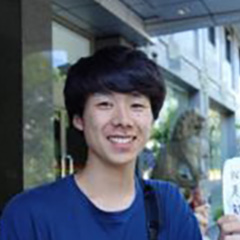
西田 直樹(NISHIDA Naoki)
派遣先:中国
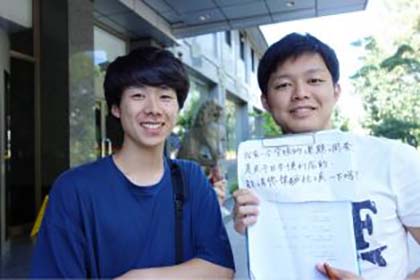 左が西田君
左が西田君西田 直樹(NISHIDA Naoki)
法学部 法律学科
法学部 法律学科
- 平成29年度 AUGP中国に参加 中国・北京師範大学に約3週間留学
AUGPに参加したきっかけは?
私がグローバルプログラム(AUGP)中国に参加したきっかけは2つあります。1つ目は、中国語検定三級を2回とも不合格になってしまったので、中国語に毎日触れる環境で生活すれば必ず上達して検定に合格できると考えたからです。2つ目は、中国人の友人や留学生と会話をしているうちに文化の違いにとても興味を持ち、自分の目で確かめてみたいと思ったからです。現地では、どのような授業を受けていましたか?
授業は全て中国語で行われ、1、2限がライティングとリーディング、3、4限がスピーキングとリスニングでした。1、2限の内容は教科書の単語などを読んだり、問題集を解いたりする授業、3、4限は北京師範大学の研究生が主に教科書の内容に沿ってパワーポイントを使って行われる授業でした。3、4限の授業はグループに分かれて討論をする事が多く、中国語を話す事に慣れていない私には積極的に話す良い機会になりました。またコミュニケーション能力の向上にも繋がると感じました。
課外授業では万里の長城、頤和園や京劇などを見に行きました。テレビで見た事があったので特に期待はしていなかったのですが、間近で見ると鳥肌が立つほどすごく感動をしてしまい、歴史の深さを感じました。また中国に行ったら必ず観光したいと思うほどでした。
留学で一番成長を感じたことは?
私は今回の留学で中国語のクラスを一つ下に下げるか下げないかを大きく悩んだ事がありました。なぜなら、私のクラスの大半の人は中国語で様々な会話ができるほどレベルが高いのに、私は最初の授業から内容をほとんど聞き取ることができず、劣等感や恥ずかしさを感じたからです。授業中質問されるのが怖くて下を向いて授業を受けてしまう事もありました。しかし、思い切ってこの悩みを担当の先生やクラスのみんなに伝えると、馬鹿にされると思っていたのですが、一緒に頑張ろうと励ましてくれる人がいました。私はまさか励ましてもらえるとは思っていなかったので、本当にこのクラスのみんなともっと一緒に学びたいと思い、毎日予習復習を2、3時間欠かさずに頑張りました。少しですが授業の内容を聞き取ることが出来るようになり、下を向かないで積極的に発言することが出来るようになりました。
私は今回の留学でこのような困難が起きてくれて良かったなと思いました。今までこういう状況に陥ると逃げてばかりいた自分が、向上心の高い人ばかりいる環境に行く事で、自分をもっと高めたいと心の底から思えるようになったからです。
留学を終えての今後の目標は?
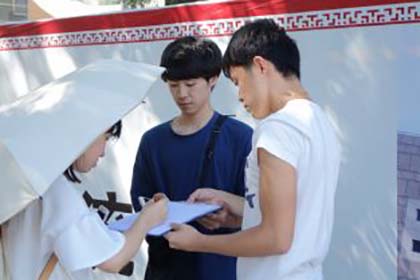 街頭でのアンケート調査
街頭でのアンケート調査
留学に行く以前は夢が無かったため、とりあえず中国語検定に合格して履歴書に書けば就職しやすくなるといった、単純なことしか考えていませんでした。しかし、今回の留学でさまざまな困難にぶつかって色々な角度から物事を考え、逃げ出さずに乗り越えることができました。その結果、今までなかった将来の夢を作ることができ、これまでの自分にはなかったスキルを身につけることが出来ました。
次の目標は交換・派遣留学生制度(AUEP)で長期間中国に留学し、ビジネスで使える中国語を身につけ、日本との価値観の違いや相手の立場に立って問題を理解出来るようになりたいと思います。
次の目標は交換・派遣留学生制度(AUEP)で長期間中国に留学し、ビジネスで使える中国語を身につけ、日本との価値観の違いや相手の立場に立って問題を理解出来るようになりたいと思います。
留学後の成果~My Before After~
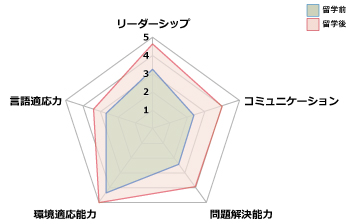
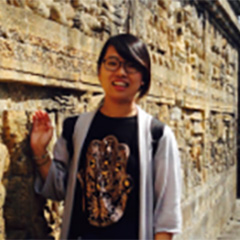
菅野 岬(SUGANO Misaki)
派遣先:インドネシア
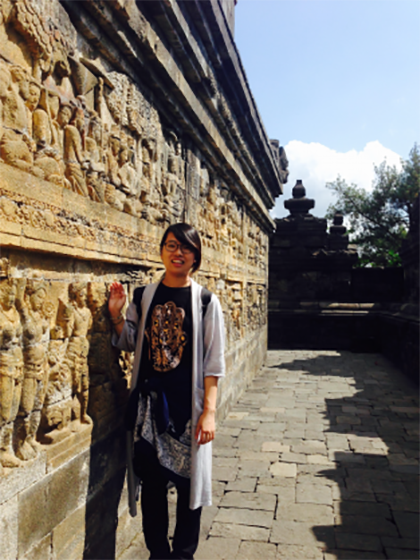
菅野 岬(SUGANO Misaki)
国際関係学部 多文化コミュニケーション学科
国際関係学部 多文化コミュニケーション学科
- 平成27年度 AUGPインドネシアに参加 約4週間アル・アズハル大学に留学
AUGPに参加したきっかけは?
大学でインドネシア語を学んでいく中で、実際に現地へ行き生活を体験したいと思うようになったことです。語学力の向上も勿論ですが、宗教にも興味があり、インドネシア人の多くが信仰しているイスラム教についても、その生活を間近で見てみたいという気持ちがありました。現地では、どのような授業を受けていましたか?
授業は午前8時30分から正午、または午後3時まででした。1時限が90分で休憩が30分、昼の休憩は90分あり、1日に2時限から3時限ありました。授業内容はインドネシア語の文法、会話、読解、ライティング、リーディングです。課外授業として、Car Free Day(日曜日に自動車の運転が禁止される時間帯)、モナス(独立記念塔)、タマン・ミニ(インドネシアの歴史や文化を再現したテーマパーク)、バンドン(ジャカルタ近郊の都市)へ訪問しました。また、市場で値段交渉の練習も行いました。
担当教員は主に日本語学科の先生方でしたが、なかには他学科の先生方による授業もありました。加えて、日本語学科の学生の方々が授業の補助をしてくださいました。宿題は基本的に授業中に終わらなかったものを行うというもので、大体毎日あり、授業中のテーマについて作文を書くというものでした。例えば、ジャカルタと自分の住む町の比較、家族について、交通機関について、買い物について、などです。
また、日系企業(今年度は味の素株式会社)の訪問もしました。企業理念やインドネシア向けの製品の紹介など聞いた後、工場内を見学しました。文化体験として週に1回程度、午後4時から6時までインドネシアの伝統楽器であるアンクルンの練習をし、修了式の前には成果発表もしました。
現地での生活を振り返って、どうでしたか?
留学中、私はいつもメモ帳とペンを手に持って移動しており、移動中や休み時間など、友達や先生と話しているときに分からなかった単語をメモする習慣を作りました。分からない言葉がたくさんあり過ぎて、はじめのうちはメモを取ってばかりでしたが、メモをした単語を覚えることで会話力は上がったと思います。また、EとU、LとR、NとNGの発音と聞き分けがとても難しく、友達や先生との会話中に一緒に発音の練習をしてもらうようにしばしばお願いしました。宿舎では現地で出来た友達とよくインドネシア語でメッセージのやり取りをして練習をしました。留学生活を振り返り楽しかったことは、とにかくインドネシア人と関わり、話すことでした。友達、先生だけでなく、滞在していたアパートの管理人さんや隣人、近所のコンビニエンスストアの店員さんなど多くの方々と関わりましたが、全員が明るく親切でいつも私に良くしてくれました。郵便局の場所が分からず迷っていた時も、勇気を出して声をかけてみると、警備の人や通りすがりの人が教えてくれました。
インドネシア人の心のあたたかさに触れることができ、またインドネシア語で会話することが出来てとても嬉しかったです。
留学生活から学んだことを、今後どう活かしていきたいですか?
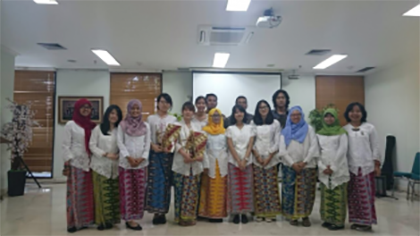
当たり前のことですが、インドネシアでの生活と日本での生活は異なります。その違いが面白いと思うこともあれば、日本の方が良いと思うこともありました。しかし、1か月生活することで私は現地での生活に慣れていきました。それは、先生方や友達、私たちに関わってくれた全ての方々によるサポートがあったからだと思います。本当に感謝しています。
インドネシアでの出会いを大切にし、今後も連絡を取り合い、友達とお互いに勉強し合おうと思います。また、インドネシアの友達がもし日本へ来ることがあれば、今度は私がサポートをしたいと思います。
今回の留学で、よりインドネシア語学習への意欲が高まりました。インドネシア語検定B級取得を目指し、今後も勉学に励みます。
インドネシアでの出会いを大切にし、今後も連絡を取り合い、友達とお互いに勉強し合おうと思います。また、インドネシアの友達がもし日本へ来ることがあれば、今度は私がサポートをしたいと思います。
今回の留学で、よりインドネシア語学習への意欲が高まりました。インドネシア語検定B級取得を目指し、今後も勉学に励みます。
留学後の成果~My Before After~
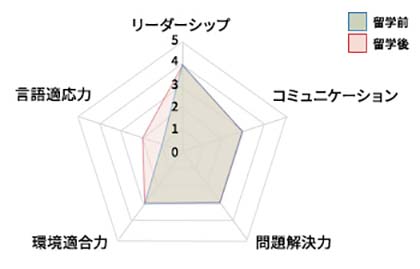
〈2026年1月8日更新〉